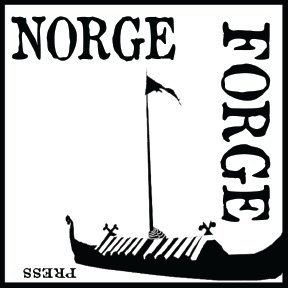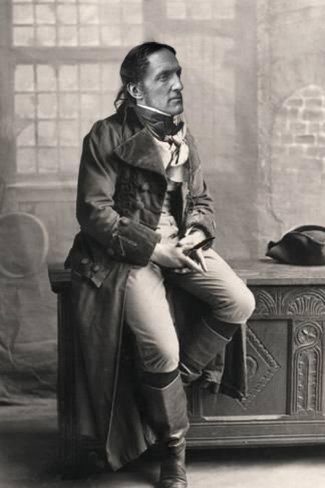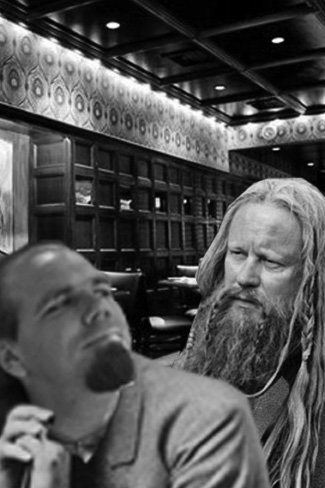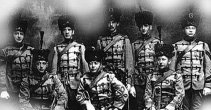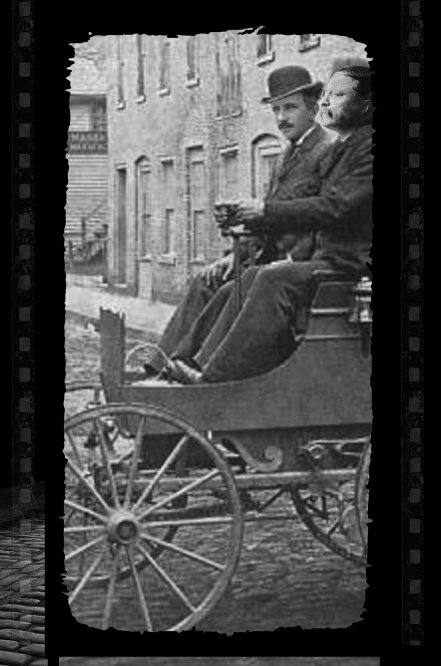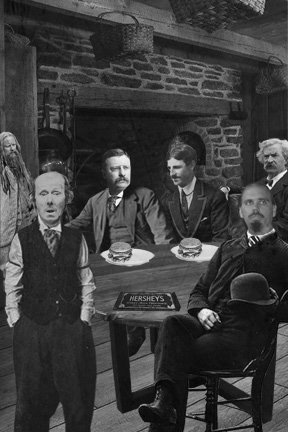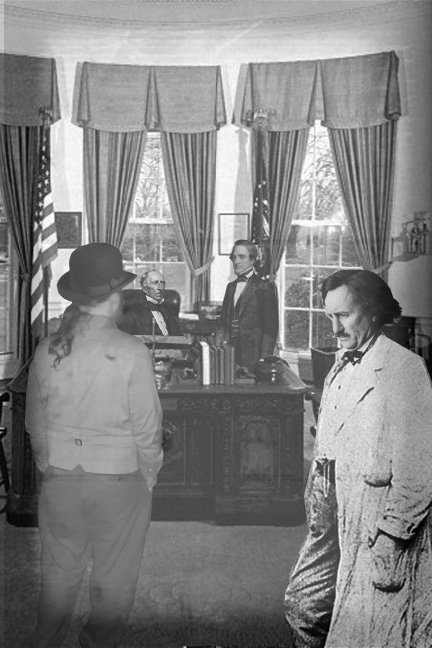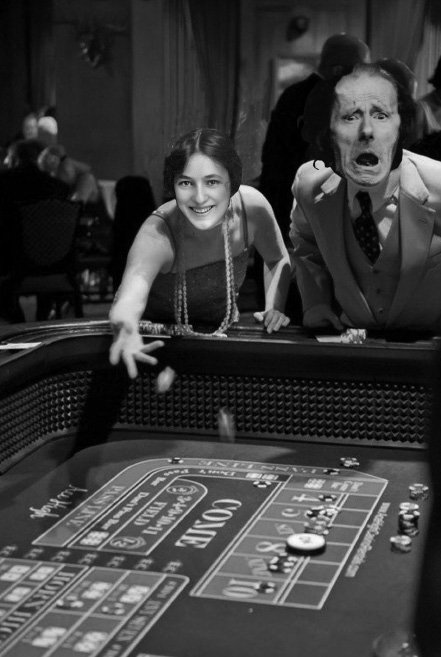Peanuts, Popcorn, and Presidents
By Christopher Jon Luke Dowgin
Part of the Sinclair Narratives
Welcome to another episode in The Sinclair Narratives featuring everyone's favorite immortal, Henry Sinclair, and his third-generation reincarnated Viking crew (sometimes). In this episode, I will tell the story of how three of my closest friends met. It was on the night of the testimonial dinner at Delmonico's for Mr. A.G. Spalding and his party of representatives of American Baseball Players on their arrival to New York City from their tour around the world on April 8th, 1889.
I, Henry Sinclair, had just arrived with my friends Teddy Roosevelt, Bjorn, and Keno Crowninshield the afternoon of the game between the Chicago White Stockings and the All American Team put together by Albert Goodwill Spalding, which went around the world for the last year. Louie drove us down from Salem just in time for the gates to open. Speeding through 4 states at 15mph. Spalding traveled with his two teams spreading baseball and his sporting equipment company from Chicago to Los Angeles and then Hawai'i to Ireland before finishing back in Chicago. Today we had box seats behind home plate at Washington Park. John Montgomery Ward of the All American Team was hitting against Chicago White Stockings' Cap Anson.
The lines waiting outside of the stadium were huge, for this was the first game in America since they had left Los Angeles for Hawai'i. The world press had followed them and the world was riveted! Many photos had come back of the teams playing in the Coliseum and in front of the Sphinx. They were a home run and they were home again!
Not only were baseball fans in attendance for the game, but our newly elected president. Benjamin Harrison sat in an adjoining box seat with America's favorite author, Mark Twain. Even if the literary critics hated his latest book, A Connecticut Yankee in King Arthur's Court…
So were all of Manhattan's finest prostitutes to guarantee a home run to anyone willing to pay the cost of the equivalent of three hot dogs and the latest fad, a Coca-Cola. Louie was hoping his hot dog would be relished tonight...
The Chicago team performed poorly. Their catcher arrived well after the game started. Anson was dismayed when Ward kept hitting his players home. Mark Twain in the third inning, poked me in the elbow with his own and said, "Anson is like most politicians, likely to take a bet on any horse in a race, as long as it is not his own. For there is rarely seen a politician, who would place his own money on the people who elected him and paid his salary. Present, presidential, company excluded." The last line he looked at Harrison and smiled, but turned to me with a wink and a laugh. John Healy tossed a no-hitter through six innings for the All American Team while many jokes passed back and forth between the two boxes with me, Keno, and Louie in stitches. Though Teddy never warmed up to him after Mark showed his disdain over our affairs in Samoa at the time. Which TRULY ruffled Teddy's feathers who looked forward to America's impending imperialism. Bjorn was looking at some fellow's girl… By the end of the game, Chicago never pulled ahead and allowed the All-American Team to soundly defeat them.
My friends, won't you join me and Benjamin at Delmonico's tonight?" Twain offered, "The teams are going back to their hotel to put on their sharpest penguin suits and lead a parade to the restaurant within the hour."
"Delmonico's, my cousin is the sous-chef," Louie interjected, "He created all of the dishes, but Ranhofer takes the credit. Like his Baked Alaska—my cousin's Gloucester Cluck Surprise! Lobster Newburgh—Gloucester Lobster!"
"We will be honored," I said as we linked arms and began to strut out of the stadium. Keno followed shaking his head at Louie. Louie punched Bjorn in the arm and he broke his gaze on the girl who was smiling back; her suitor frowned when he had seen her and then glowered at Bjorn. Bjorn just waved over his smile. Teddy was in a huff until Harrison caught his ear about his pursuits in Samoa. Then Teddy seemed to cheer up when he met another capitalist.
There was a bottleneck leaving the stadium. Women were seen running back into the stadium with their husbands and friends chasing after them with concern and sympathy. The rest of the crowd in the back pushed forward into the corridor leading under the bleaches to the exit. We were in the middle of the confusion of the crowd not knowing if they should exit or not. "I fear gentlemen we are like the frog who found the comfort of a hot bath, but too stubborn to lose a good thing before it cooks him. For we are in the stew now."
Teddy ordered us to surround the President as he stopped one of the police he knew from the city. "What the tarnation is going on—get some of your men and protect our President! I fear the anarchists are around."
“No anarchists tonight. It be murder,” said the Irishman.
“Murder, yes. Protect the President before he meets his untimely end, my good man!”
“Not of him, but of her.”
“Who?”
“A drunk who was peeking through a hole behind third base got up off his milk crate and slapped one of the local ‘ladies’ on the shoulder upon commenting on the game. She just fell over. Her coat was closed and she had a catcher’s mitt on. The lad screamed when he saw the blood leaving her mouth. We came upon the scene and found her ovaries inside the mitt—it was the only organs her family will be able to bury with her.”
“Didn’t he notice anything?” Keno asked.
“He said she was there before him, he thought he would be friendly and slap her so she could wake up and go home.”
My heart sank. Louie’s stomach rose to the challenge and lost. Right onto Harrison.
“We tried keeping it a secret, but it must have spread through the pubs back to the park,” explained the emerald officer. “Most of what is preventing the line from moving out is the crowd that heard of the mur-der already.”
“The Leather Apron,” said Louie.
We all just looked at him in confusion.
We sat with Twain and Harrison. Teddy sat as far from Twain as possible. Even though he was upset that the author got to sit next to the President all night with Harrison busting his side open with uproarious laughter. “Bully!” said Teddy as he harrumphed and folded his arms and looked away. Keno just shrugged and was consigned to Teddy’s mood. Bjorn began to mingle with the socialite women...
The banquet was held in the anteroom’s second-floor ballroom. An orchestra was in the balcony, playing Yankee Doodle Dandy, decorated with bunting and flags. Photos of the trip were displayed on the walls of the hall—developed on George Eastman’s new Kodak film. Pictures of the team on the Sphinx and in Italy among other places stood out. There were six long tables filled with food and several flower centerpieces. Each table had a three-foot-tall edible statue of several baseball players. Pyramids of sweets! We all received a nine-page souvenir menu. The cost per plate was $10. Each of the 9 innings of courses featured a dish from one of the countries they toured.
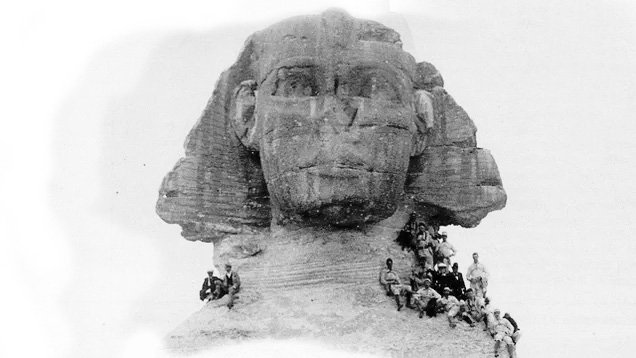
Word of the murder hadn’t spread through the hall yet. Many of New York’s finest families were there. Most would never be caught at a baseball game—but dining with the President and Mr. Twain? Even if Twain’s latest book was not doing good…
Dinner ended around 10pm. People began to scurry about as the first speaker began. Chauncey Depew of the New York Central Railroad opened. The Governor and the mayor had sent letters of regret. In attendance were 300 people from Wall Street to the theater district. Many of Chauncey’s Yale and Bonesmen friends were on hand tonight. When he finished the orchestra sparked up again and played Hail to the Chief as Spalding took to the stage. We all had enough by then and began to mingle.
Twain was leading us through New York society, not really stopping to chat with any of them, until he came across this young Croatian. “My good friends, let me introduce you to the greatest mind since da’Vinci,” Twain said as he changed the position of his hand from the man’s right to his shoulder as he stepped to his side and smiled. “Nikola.”
“Charmed,” Nikola said, as he shook my hand.
“I’m quite interested in your work with resonance,” I said.
“You too!” Twain interjected. “It sure did cure my constipation. We need to get more of our politicians to stand on his vibrating machine and they might not all have that sour look of your friend there,” Twain said, as he pointed at Teddy.

“Yes resonance; I got the idea from playing with one of those paddle balls,” Nikola leaned in and said, “They always amazed me. The harder and longer you hit the ball the faster it goes. It’s all in the rhythm.”
“Yes that is what the girls back at Harvard tell me…” commented the young 20-year-old Keno. Not sure if he is still wet behind the ears though; most likely. Bjorn just slapped him on the back, as he shook his head. A fine young woman in black sauntered by and Bjorn was off again.
“Everything has its frequency. Like a hole in a cylinder spinning on a shaft with a fixed jet of air, the faster it spins the louder the alarm. The frequency, you understand? The amount of times an occurrence happens. The frequency,” Nikola explains.
“Yes, me and Tesla frequent the Players Club. In fact, that is where we met. Later we would come here and dine and—that is where I complained about my gosh tooting constipation and he brought me back to his lab and fixed me right up.” Twain paused before he continued looking up from the floor, “ Just shook that shit out of me!”
“You think we can go there now...” Louie asked Nikola.
“Right now I’m working on two coils in which they both have their own capacitor, where the first feeds the second when excited to emit a charge into a gap of air. Once the second coil’s capacitor becomes oversaturated, like a sponge, it will spark into the air. As quickly as the frequency of the second coil empties, the first fills it. Thus you see, electricity flows through the air through great distances.”
I am also working on having a frequency where I aim the current into the magnetic field of the ground, making waves of electricity to circle the globe to feed the first coil without the need for a generator and transformer. I can light bulbs now at a distance. I have the workings to send the voice without telegraph wires and even handwriting, though it’s not stable yet. One day I will be able to shoot beams off the ionosphere. Which will direct my mighty currents to control multiple devices—like one of your yachts young man,” Nikola finished looking at Keno. “I have heard of your yacht races.”
“Yes, young Crowninshield here comes from a long seafaring family—his grand-uncle was once Secretary of the Navy, after his brother turned down the post. A position I hope to serve under one day,” Teddy joined in.
“I heard of your family, yes? Was not one of your kin the man who built, what was it—yes, Cleopatra’s Barge to free Napoleon from St. Helena?” asked Nikola with whimsy. “Some say they transported him not far from here to the Delaware to his brother’s estate.”
“Family tradition says we did,” Keno answers with pride. “We even have his snuff-box and boots that he left behind after leaving ship in a hurry, after an affair ended badly—shipboard romances and all. A relation, Nathaniel West—he was even forced to rescue his other brother Lucien from his clutches...they are a complicated family.”
“Which?” asked Nikola.
“I would dare to say both!” answered Keno.
“I read a plaque about that ship in Hawai’i as I was traveling with the teams,” Twain mused, “Sold to the current king’s grandfather I believe. A ship fit for Emperors and kings.”
“Yes, a sore spot in the family. Many believe we should have kept it.”
“Excuse me, Spalding is giving me that look,” Twain said as he was shaking a few hands in a hurry, “He is rambling, waiting for me to speak next.”
Twain went on about apple pie, baseball, and some light-hearted jabs about his new book. He explained how he came up with the idea for a baseball world tour first. The problem was, that he forgot about it until this moment. He said he had hit a ball in Kansas once, which went through the great plains far out of sight. Then, as he was walking in a straight line in the other direction through the prairie, halfway home, the ball hit him in the face, but he just remembered the occurrence now. He went on, and said the funniest thing about his baseball world tour was that the ball was covered in passport stamps from every country on the same latitude.
Then he went on about a baseball game in his book. It was played by the contemporary kings of King Arthur wearing armor. It drew crowds from all over the world. Even if his book was not gaining any readers from his own home. Now after reading it, I wonder if our new friend Nikola is that Connecticut Yankee who they deemed the Wizard con-fouling Merlin. A loose interpretation of Nikola’s interactions with Edison?
Twain left the stage to much aplomb. He confided to us, later that he had hoped they would not throw any of the food at him from the buffet tables. Louie said he would have enjoyed that if it had been tossed his way.
Then one of the fellow tourists Mark met on the journey in Samoa bumped him, a journalist I think he said.
“Tom. Glad to see you,” Mark said, “How did it go with that Samoan girl—I hope she wasn’t Gaugin aged…”
“I can’t talk now—I’m sorry, I got to run.” With that, he almost bowled Louie over.
Then Twain saw, General Leonard Wood. “Woody, what came over our friend, you know that reporter we found only wearing a hula skirt backwards; well I think it was backwards? Any ideas?”
“Good to see you, Mark,” Wood smiled, “Oh, that hooch the natives made, I was lucky no one caught me. I was told by that girl that I left the hut—with my skirt over my head.”
“Yes, but Tom?”
“Lovely speech. Plain talk from the plains. I’ve got to be going.”
‘Strange,” Mark said with exasperation, “On the island, you could not get him to shut up. All about the Indian Wars and the blankets from that ineffable damned fort in Kansas—Fort Riley from where Custard flew out. You hear Harrison just took Indian Territory away from the Choctaws, Osage, and Cherokee—damndest thing...”
Teddy just shook his head and walked off.
It was during Dewolf Hopper’s oration of Casey at Bat when he finished on the lines ‘but there is no joy in Mudville’ that we heard the screams.
The screams came from the balcony. The orchestra was returning when one of the women noticed a man hanging from the bunting. We made our way forward. There we saw General Wood for a moment before he saw Twain and left in a hurry. Moving up next to Mark was this English gentleman. “God bless his soul,” said the man from Manchester, “I was just talking to him before dinner.”
“I saw him too, but he was in a hurry,” Twain said to his friend, “Did he seem worried when you saw him?”
“No, he was in fine spirits; we began talking about that night with the Native hooch when they found you with the chief’s daughter”
“Enough of that, let me introduce you to my friends,” Twain said, placing his hand on the man’s shoulder, “Teddy, Keno, Louie, and Henry this is Edward Hulton. He is slumming it in exile from his father’s newspaper empire.”
“Edward, Athletic News, glad to meet you!”
“Pleasure, you traveled 360 with Spalding?” I asked.
“Yes from Chicago to Chicago by the end of the week. It looks like I will have another story for my father’s other newsies,” Eddy answered.
“Eddy here is the grandson of the Lord of Manchester, so when I mean slumming it in steerage, I mean slumming it,” Twain continued.
“Not as mighty as one of your knights or kings in your tale Samuel,” Eddy answered modestly with a grin.
“Maybe so—what do you think happened?” I asked.
“When I was spending time with Anson and Ward, he kept following Wood,” Eddy thought.

“Wood joined us at the Presidio, San Francisco wasn’t it. No, after San Francisco he only joined us on the ship to Hawai’i,” Twain interjected.
“Yes, Tom plied him full of bourbon!” Eddy pondered.
“What was he up to? Wood is acting strange tonight, he is spending a lot of time with Chauncey and his young Yale friends. Those fellows who meet in the dark and wear those funny robes…” Keno commented.
“Well, we are at a stand-off against the Germans for Samoa. Harrison during the game was telling me we are about to attack the German fleet at any moment now!” Twain added.
“Bully!” yelled Teddy. Twain just gave him a look and went back to Hulton holding his head.
“Wood probably was here tonight to fill in Harrison on the situation there and Hawai’i,” Twain continued.
“Probably so. We also have a warship in the distance to see which side to come in on in the battle,” Eddy responded without letting on to all he knew.
“Who do you think Tom was working for—Hearst’s muckrakers, Germany, or England?” I asked.
“I wonder if he caught a few ‘foul balls’ in his mouth to keep him quiet,” Louie said as he stuffed his face full of appetizers. “I will start asking my cousin and his staff some questions. Nobody pays attention to the caterers.”
It can’t be, but I saw him skirt the edges of the hall. It could not be! For I killed him with my own sword thirty years ago. Plus, he was too old by his appearance to be reincarnated. How can it be…
It turned out Tom was a fine catcher. They let him down. Hysteria had grasped the hall as someone yelled ‘the girl’ as the room gasped. The chatter became indistinct and agitated like locusts brushing their wings against each other in increasing frequency until they swarmed.
The detail set to protect the event was the first to investigate. The Irishman came in with the Police Commissioner Charles F. McLean. Plus this, Doctor Lazlo. Lazlo examined Tom and found that one of his eyeballs was exchanged for one of the balls believed to be in his mouth. Louie spat out a scallop and winced.
“Any news on the girl’s murder?” Teddy asked of the Emerald Gentleman.
“It seems she was not a prostitute but a German heiress,” the Irish Sargent continued, “Our private is German. He read some letters in her purse going to some man named Tom Delaney.”
Edward just stared at Samuel, “What is the connection?”
“You remember that girl who joined us in Egypt?” Twain asked.
“The one Anson took behind the sphinx trying to solve her riddles?” Eddy asked with raised eyebrows.
“Sarge, did this girl have a brown bob with a heart-shaped scar on her elbow?” asked Twain.
“In fact, she did.”
“It’s her,” Eddy agreed, “She did get into a fight with Wood.”
“In truth, I thought it was about the wood of his bat and if he could score a homer that night…”
“No, it must be about the Samoa Crisis.”
McLean called in an extra detail to protect the President and escorted him back to the Fifth Street Hotel. The baseball players crowded in. Half volunteered to return the President back to his room.
“I know, I’m going to the kitchen now for more of these Greek tarts and info because…” Louie said before we cut him off.
“Nobody notices the caterers,” Teddy, Keno, and I said in unison. Louie just shrugged and left to visit his cousin.

“What is going on in Samoa?” I asked.
“There are spies throughout the Pacific. There is talk about making Hawai’i a state, we would love to evict Germany from Samoa and keep it for ourselves, and there is also talk of taking on Spain for the Philippines. As you know three nations pose their sea cannons at each other, but the battle is really won in the Samoan people’s indifference. Which nation will they stomach? Who will give them less indigestion. After Samoa, we can stage an attack on the Philippines.”
“Bully!” Teddy said as he raised a fist across his chest, “It is about time we had a good war!”
Twain just shook his head once more.
“My father has the Prime Minister’s ear, he is waiting for America to spill its own blood and have England come into the issue looking like the good guy as they manipulate these nations for their own ends,” explains Eddy, “In some circles, they believe we never let America go, we just let you think you won the wars as we took over your banking and thus your politicians.”
“At least now we have an independent treasury. Your hold has weakened on us,” I said.
“The inner circle talks about those we had in Salem and New England who have killed presidents for us.” Eddy continues, “Poison, typhoid has always proven well.”
“Sir, you are talking your way into a bloodied lip,” Teddy stood forward, “I’ll let you know I stood in the ring with Sullivan for 20 rounds when we were younger.”
“Sir, I am not in favor of these Protestants and their politics,” Eddy answered with an open palm on Teddy’s fist. “They have not been nice to us Catholics, though my family has had special dispensation since Henry II to practice our faith.”
“I have dealt with the Junto first hand throughout the years,” I said with my hand on Eddy’s shoulder, “Some I have sent to their makers.”
“So you think Wood is behind this Eddy?” asked Twain.
“Tom did have that fight with him in Melbourne,” Eddy answered.
“What did he find out—that German lady kept close to him, but distanced herself after Cairo,” Twain asked as he tapped his cigar.
“He did head into the Sphinx with a local militia of Bedouins,” Eddy remembered as he scratched his head.
“My family talks about Napoleon and what he had found in Egypt,” chimed in Keno, “Maps and scrolls talking about a Pacific sea passage to South America through Samoa and Hawai’i. Trade of architecture, Cocaine, tobacco, and magic.”
“What magic!” exclaimed Teddy.
“This stuff is truly magic,” Louie said as he walked by chugging some Coca-Cola with his eyes bugging out. Those were the days when Coke was coke.
“Mr. Twain,” I asked as I slid in close, “How well do you know this Edward? Could he be involved in this intrigue for Downing Street? His grandfather, as he says, is royalty. He seems to have kept a close eye on the German, Wood, and Tom.”
“He seems like a good bloke,” Twain said, “Though, for a tipster on the fillies, he seemed more interested in those of us that traveled with the teams than the teams themselves. His father, Edward the Senior, does sway the public’s opinion. Of those on the street and in Parliament through his papers...”
I went to the bar to order a Benedictine and Brandy. The bartender turned his back to grab the bottles from the top shelf and poured me three fingers. As he turned around the bartender transform into Professor Wilmarth and asked, “So any clues?”

“Wood definitely traveled with the teams for some intrigue in Samoa and Hawai’i. Edward has said nothing about what he was up to, as the teams played in London and in his hometown Manchester. He did chum up to Twain. Twain who has our new president’s ear—being an anti-imperialist and all. Wood disappearing into the Sphinx... His argument afterward with the German. Tom shadowing him. Wood a soldier and doctor, he would know how to cleanly sever the organs.”
“Leather Apron,” said the good professor.
“Louie said that,” I asked as I took a sip, “What does that mean?”
“A year ago in Whitechapel, where George Peabody evicted the wretched to build expensive housing for the poor—yeah, OK. In that neighborhood, five women were murdered with their organs removed. Then it just stopped.”
“You think this person could have come over with the team?”
“You saw that visage from the past?”
“I did see him!”
“Yes, somehow he is alive again.”
“How so?”
“Can’t tell.”
“Why is he here? Is it for the President? I killed him for his complicity in President Taylor’s death.”
“So it would have seemed, though he is here again.”
“He was an agent for the Essex Junto and their overseers in London; could he be working with this Eddy that Twain is friends with?”
“Remember, the royal family is German.”
“What is with this magic that traveled from Egypt to South America?”
“You think the lady was working for the British? Would Wood kill her for her complicity? He would be handy with a scalpel…”
The Professor turned back to the shelves and spun around and the bartender was there again and the Professor was gone. “If you are looking for someone handy with a scalpel I could suggest a few down at the Five Points.”
“Sorry, the drink got the best of me,” I said as I walked away with the snifter.
Over the edge of my glass, I saw him again sneering at me. As I lowered it, he was gone.
When I got back to the bunch, Teddy and Tesla were talking.
“John L. Sullivan, now that is a man’s man,” Teddy was biting at the bit, “Marquess of Queensberry Rules or bare knuckles if it must—I did fight him back in Cambridge, 20 rounds. I did see him again fight at Ong’s Hat in the Pines as I was staying in Philadelphia.”
“I hear a lot about his protege; an Irishman by the name of Weir,” Nikola pondered, “Is he not so from Boston too?”
“Yes, a fine fighter,” Teddy agrees, “For a featherweight—quick though. Also, Kilrain is up next to take on Sullivan. Bare Knuckles! I out rowed him, Kilrain, on the Charles.”

Keno was talking to Twain about the magic items his family had stories about, “Yes, Napoleon’s men found the Rosetta Stone and set out to translate all they were able to during their Egyptian Campaign. There were stories of a man, a relation, from Salem coming back as a Nosferatu after his encounters with Napoleon. Others of my relation sailed the Emperor from St. Helena, after another was left in his coffin, to seek financial aid from his brother Joseph in New Jersey. He wanted the money to search for some mysterious item he read about on the walls of the Sphinx. Napoleon planned to outfit an exposition through the Polynesian Islands to Tenochtitlan. The world thought he was gone—the fool he left in his place kept drinking orgeat syrup while the British were feeding him Cream of Tartar for a stomach issue. The latter prevented his body from expelling the arsenic from the almonds in the syrup. Thus the arsenic forces him to drink more syrup… The ship my family sailed the Emperor on, after my uncle George died and Richard sold it, was purchased by British agents who sailed it to Brazil and then Hawai’i following some scrolls and maps said to be left on board before we could remove them. After failing to find what they were looking for, they sold the ship to the King of Hawai’i. Funny though, the King and his wife sailed to Brazil before sailing to England where they died mysteriously as Cleopatra’s Barge was scuttled. Were they enticed to seek the item?”
It was getting late, Spalding had settled the party down and the last of the speakers were taking the stage. Spalding was not a man to be upstaged by no mere murder. It was a quarter after one when I saw the ghost again. He just sneered over his shoulder before I lost him in the crowd.
I followed him into the hall, when I saw a service door being closed. I entered, and I only saw his face for a mere second before it all went black. The last thing I saw, was his sneer and that confused look as he fought to focus on his objective, me.
I woke up and found myself in motley, padded leather armor on my chest, and a wolf rib bascinet helmet resembling a catcher’s mask. I was behind King Lot. He was playing catcher; King Arthur was at-bat. Pitching was King Mark of Cornwall.
Mark tossed one; Arthur swung and missed. Lot, just turned to me and stared.
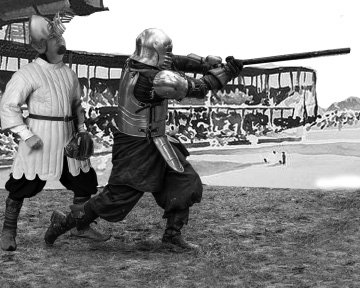
“Strike…” I said.
I looked about and saw the field filled with men in armor. All wearing name tags. There was: King Logris, King Marhalt of Ireland, King Pellam, and King of the Lake in the field. Many other Arthurian kings sat in the dugout. A few royal executioners stood around me, sneering. I felt as if I left no joy in Mudville I would lose—my head. I hoped Arthur was a better batter than Casey; removing the proposition from my control.
Mark threw a screwball; Arthur let it go by.
Everyone looked toward me. Executioners gathered to my left and right. Some with the ax. Others with the kind stroke of a sword. Strike I called; a mild melee between executioners on the two sides broke out. Which only settled down on Arthur’s order.
It was then Arthur pointed to center field. He was calling his shot. The opposing kings slowly made their way deep into the outfield.
Slowly.
Mark waited for them. He threw a mighty curveball. Arthur then produced Excalibur and slashed the ball in half. It landed yards in front of the pitcher. Arthur kicked off his greaves and lumbered toward first. King Mark fell over in his armor. King Lot took his time raising up from his crouch. By the time Lot stood up and made it to the ball, he still had to wait for one of the other kings to return from the outfield to be close enough for him to throw it. By then, Arthur slid into first or fell on it out of exhaustion.
It felt like it was 90 degrees. The kings must have been dying in their armor.
Up next was the King of Hibernia. Mark looked toward Arthur; Arthur was starting toward second, but Mark knew he would not make it for a pitch or two. Mark looked back at the plate; the catcher signaled. Mark nodded; he threw a screwaball. Swing and a miss. The executioners leered; I called a strike. The hooded men fought amongst themselves, with me in the middle. Mark threw his second pitch; it looked high to the left. I called a ball. The executioners for both teams settled down. The catcher signaled; Mark tossed on in. The batter hit a foul. Two strikes. Mark sent a screaming fastball; the King of Hibernia swung, missed, and fell over. Strike I called; the executioners swung, I ducked and ran for first.
Arthur didn’t know any better as he continued for second. I passed him after rounding first with the executioners in tow and gaining. As we went past, we left Arthur in a spin. I rounded third and I ducked one of their axes. It was when I was getting ready to run home, I saw one of the executioners had stayed on the plate. He swung; I slid underneath for a home run.
The Kings called a time out and called together a witan. It was unprecedented. Never before had an umpire ran home. Could Arthur’s side count it as a point? If so, was it legal since I ran home before Arthur? Afterward, the executioners took up their place next to their kings and started pushing against each other. I was left to my own accord, for the moment.
Arthur’s squire, who was the bat boy, walked up with a King Louisville Slugger; and beknighted me, Sir Henry. Before I passed out I had seen the squire pull back his hood to reveal two rabbit ears. It was Harvey the Pooka smiling down at me.
Continued on the Last Story...
So Cthulhu is wondering if no one else wants those Rocky Mountain Oysters?

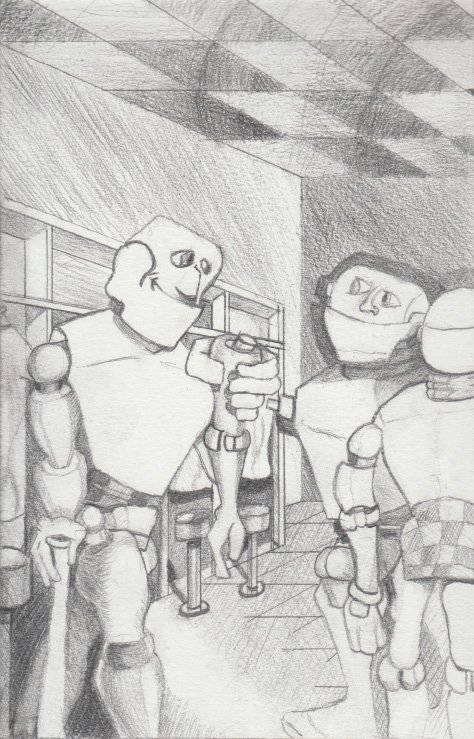
The Celebrated No-Hit Inning
by
Frederik Pohl
This is A TRUE STORY, you have to remember. You have to keep that firmly in mind because, frankly, in some places it may not sound like a true story. Besides, it’s a true story about baseball players, and maybe the only one there is. So you have to treat it with respect.
You know Boley, no doubt. It’s pretty hard not to know Boley, if you know anything at all about the National Game. He’s the one, for instance, who raised such a scream when the sportswriters voted him Rookie of the Year. “I never was a rookie,” he bellowed into three million television screens at the dinner. He’s the one who ripped up his contract when his manager called him, ‘The hittin’est pitcher I ever see’. Boley wouldn’t stand for that. “Four-eighteen against the best pitchers in the league,” he yelled, as the pieces of the contract went out the window. “Fogarty, I am the hittin’est hitter you ever see!”
He’s the one they all said reminded them so much of Dizzy Dean at first. But did Diz win thirty-one games in his first year? Boley did; he’ll tell you so himself. But politely, and without bellowing...
Somebody explained to Boley that even a truly great Hall-of-Fame pitcher really ought to show up for spring training. So, in his second year, he did. But he wasn’t convinced that he needed the training, so he didn’t bother much about appearing on the field.
Manager Fogarty did some extensive swearing about that, but he did all of his swearing to his pitching coaches and not to Mr. Boleslaw. There had been six ripped-up contracts already that year, when Boley’s feelings got hurt about something, and the front office were very insistent that there shouldn’t be any more.
There wasn’t much the poor pitching coaches could do, of course. They tried pleading with Boley. All he did was grin and ruffle their hair and say, “Don’t get all in an uproar.” He could ruffle their hair pretty easily, since he stood six inches taller than the tallest of them.
“Boley,” said Pitching Coach Magill to him desperately, “you are going to get me into trouble with the manager. I need this job. We just had another little boy at our house, and they cost money to feed. Won’t you please do me a favor and come down to the field, just for a little while?”
Boley had a kind of a soft heart. “Why, if that will make so much difference to you. Coach, I’ll do it. But I don’t feel much like pitching. We have got twelve exhibition games lined up with the Orioles on the way north, and if I pitch six of those that ought to be all the warm-up I need.”
“Three innings?” Magill haggled. “You know I wouldn’t ask you if it wasn’t important. The thing is, the owner’s uncle is watching today.”
Boley pursed his lips. He shrugged. “One inning.”
“Bless you, Boley!” cried the coach. “One inning it is!” Andy Andalusia was catching for the regulars when Boley turned up on the field. He turned white as a sheet. “Not the fast ball, Boley! Please, Boley,” he begged. “I only been catching a week and I have not hardened up yet.”
Boleslaw turned the rosin bag around in his hands and looked around the field. There was action going on at all six diamonds, but the spectators, including the owner’s uncle, were watching the regulars.
“I tell you what I’ll do,” said Boley thoughtfully. “Let’s see. For the first man, I pitch only curves. For the second man, the screwball. And for the third man let’s see. Yes. For the third man, I pitch the sinker.”
“Fine!” cried the catcher gratefully, and trotted back to home plate.
“He’s a very spirited player,” the owner’s uncle commented to Manager Fogarty.
“That he is,” said Fogarty, remembering how the pieces of the fifth contract had felt as they hit him on the side of the head.
“He must be a morale problem for you, though. Doesn’t he upset the discipline of the rest of the team?”
Fogarty looked at him, but he only said, “He win thirty-one games for us last year. If he had lost thirty-one he would have upset us a lot more.”
The owner’s uncle nodded, but there was a look in his eye all the same. He watched without saying anything more, while Boley struck out the first man with three sizzling curves, right on schedule, and then turned around and yelled something at the outfield.
“That crazy. By heaven,” shouted the manager, “he’s chasing them back into the dugout. I told that...”
The owner’s uncle clutched at Manager Fogarty as he was getting up to head for the field. “Wait a minute. What’s Boleslaw doing?”
“Don’t you see? He’s chasing the outfield off the field. He wants to face the next two men without any outfield!
That’s Satchell Paige’s old trick, only he never did it except in exhibitions where who cares? But that Boley”
“This is only an exhibition, isn’t it?” remarked the owner’s uncle mildly.
Fogarty looked longingly at the field, looked back at the owner’s uncle, and shrugged.
“All right.”He sat down, remembering that it was the owner’s uncle whose sprawling factories had made the family money that bought the owner his team. “Go ahead!” he bawled at the right fielder, who was hesitating halfway to the dugout.
Boley nodded from the mound. When the outfielders were all out of the way he set himself and went into his windup. Boleslaw’s windup was a beautiful thing to all who chanced to behold it unless they happened to root for another team. The pitch was more beautiful still.
“I got it, I got it!”Andalusia cried from behind the plate, waving the ball in his mitt. He returned it to the pitcher triumphantly, as though he could hardly believe he had caught the Boleslaw screwball after only the first week of spring training.
He caught the second pitch, too. But the third was unpredictably low and outside. Andalusia dived for it in vain.
“Ball one!” cried the umpire. The catcher scrambled up, ready to argue.
“He is right,” Boley called graciously from the mound.
“I am sorry, but my foot slipped. It was a ball.”
“Thank you,” said the umpire. The next screwball was a strike, though, and so were the sinkers to the third man though one of those caught a little piece of the bat and turned into an into-the-dirt foul.
Boley came off the field to a spattering of applause. He stopped under the stands, on the lip of the dugout. “I guess I am a little rusty at that, Fogarty,” he called.
“Don’t let me forget to pitch another inning or two before we play Baltimore next month.”
“I won’t!” snapped Fogarty. He would have said more, but the owner’s uncle was talking.
“I don’t know much about baseball, but that strikes me as an impressive performance. My congratulations.”
“You are right,” Boley admitted. “Excuse me while I shower, and then we can resume this discussion some more. I think you are a better judge of baseball than you say.”
The owner’s uncle chuckled, watching him go into the dugout. “You can laugh,” said Fogarty bitterly. “You don’t have to put up with that for a hundred fifty-four games, and spring training, and the Series.”
“You’re pretty confident about making the Series?” Fogarty said simply, “Last year Boley win thirty-one games.”
The owner’s uncle nodded, and shifted position uncomfortably. He was sitting with one leg stretched over a large black metal suitcase, fastened with a complicated lock. Fogarty asked, “Should I have one of the boys put that in the locker room for you?”
“Certainly not!” said the owner’s uncle. “I want it right here where I can touch it.” He looked around him. “The fact of that matter is,” he went on in a lower tone, “this goes up to Washington with me tomorrow. I can’t discuss what’s in it. But as we’re among friends, I can mention that where it’s going is the Pentagon.”
“Oh,” said Fogarty respectfully. “Something new from the factories.”
“Something very new,” the owner’s uncle agreed, and he winked. “And I’d better get back to the hotel with it But there’s one thing, Mr. Fogarty. I don’t have much time for baseball, but it’s a family affair, after all, and whenever I can help I mean, it just occurs to me that possibly, with the help of what’s in this suitcase. That is, would you like me to see if I could help out?”
“Help out how?” asked Fogarty suspiciously.
“Well I really mustn’t discuss what’s in the suitcase. But would it hurt Boleslaw, for example, to be a little more, well, modest?”
The manager exploded, “No.”
The owner’s uncle nodded. “That’s what I’ve thought. Well, I must go. Will you ask Mr. Boleslaw to give me a ring at the hotel so we can have dinner together, if it’s convenient?”
It was convenient, all right. Boley had always wanted to see how the other half lived; and they had a fine dinner, served right in the suite, with five waiters in attendance and four kinds of wine. Boley kept pushing the little glasses of wine away, but after all the owner’s uncle was the owner’s uncle, and if he thought it was all right.
It must have been pretty strong wine, because Boley began to have trouble following the conversation.
It was all right as long as it stuck to earned-run averages and batting percentages, but then it got hard to follow, like a long, twisting grounder on a dry September field. Boley wasn’t going to admit that, though.
“Sure,” he said, trying to follow; and “You say the fourth dimension?” he said; and, “You mean a time machine, like?” he said; but he was pretty confused.
The owner’s uncle smiled and filled the wine glasses again.
Somehow the black suitcase had been unlocked, in a slow, difficult way. Things made out of crystal and steel were sticking out of it. “Forget about the time machine,” said the owner’s uncle patiently. “It’s a military secret, anyhow. I’ll thank you to forget the very words, because heaven knows what the General would think if he found out. Anyway, forget it. What about you, Boley? Do you still say you can hit any pitcher who ever lived and strike out any batter?”
“Anywhere,” agreed Boley, leaning back in the deep cushions and watching the room go around and around. “Any time. I’ll bat their ears off.”
“Have another glass of wine, Boley,” said the owner’s uncle, and he began to take things out of the black suitcase.
Boley woke up with a pounding in his’ head like Snider, Mays and Mantle hammering Three-Eye League pitching. He moaned and opened one eye.
Somebody blurry was holding a glass out to him. “Hurry up. Drink this.”
Boley shrank back. “I will not. That’s what got me into this trouble in the first place.”
‘Trouble? You’re in no trouble. But the game’s about to start and you’ve got a hangover.”
Ring a fire bell beside a sleeping Damnation; sound the Charge in the ear of a retired cavalry major. Neither will respond more quickly than Boley to the words, “The game’s about to start.”
He managed to drink some of the fizzy stuff in the glass and it was a miracle; like a triple play erasing a ninth-inning threat, the headache was gone. He sat up, and the world did not come to an end. In fact, he felt pretty good.
He was being rushed somewhere by the blurry man. They were going very rapidly, and there were tail, bright buildings outside. They stopped.
“We’re at the studio,” said the man, helping Boley out of a remarkable sort of car.
“The stadium,” Boley corrected automatically. He looked around for the lines at the box office but there didn’t seem to be any.
“The studio. Don’t argue all day, will you?” The man was no longer so blurry. Boley looked at him and blushed. He was only a little man, with a worried look to him, and what he was wearing was a pair of vivid orange Bermuda shorts that showed his knees. He didn’t give Boley much of a chance for talking or thinking. They rushed into a building, all green and white opaque glass, and they were met at a flimsy-looking elevator by another little man. This one’s shorts were aqua, and he had a bright red cummerbund tied around his waist.
“This is him,” said Boley’s escort.
The little man in aqua looked Boley up and down. “He’s a big one. I hope to goodness we got a uniform to fit him for the Series.”
Boley cleared his throat. “Series?”
“And you’re in it!” shrilled the little man in orange. “This way to the dressing room.”
Well, a dressing room was a dressing room, even if this one did have color television screens all around it and machines that went wheepety-boom softly to themselves. Boley began to feel at home.
He blinked when they handed his uniform to him, but he put it on. Back in the Steel & Coal League, he had sometimes worn uniforms that still bore the faded legend 100 lbs. Best Fortified Gro-Chick, and whatever an owner gave you to put on was all right with Boley. Still, he thought to himself, kilts!
It was the first time in Boley’s life that he had ever worn a skirt. But when he was dressed it didn’t look too bad, he thought especially because all the other players (it looked like fifty of them, anyway) were wearing the same thing. There is nothing like seeing the same costume on everybody in view to make it seem reasonable and right. Haven’t the Paris designers been proving that for years?
He saw a familiar figure come into the dressing room, wearing a uniform like his own. “Why, Coach Magill,” said Boley, turning with his hand outstretched. “I did not expect to meet you here.”
The newcomer frowned, until somebody whispered in his ear. “Oh,” he said, “you’re Boleslaw.”
“Naturally I’m Boleslaw, and naturally you’re my pitching coach, Magill, and why do you look at me that way when I’ve seen you every day for three weeks?”
The man shook his head. “You’re thinking of Grand-daddy Jim,” he said, and moved on.
Boley stared after him. Granddaddy Jim? But Coach Magill was no granddaddy, that was for sure. Why, his eldest was no more than six years old. Boley put his hand against the wall to steady himself. It touched something metal and cold. He glanced at it.
It was a bronze plaque, floor to ceiling high, and it was embossed at the top with the words World Series Honor Roll. And it listed every team that had ever won the World Series, from the day Chicago won the first Series of all in 1906 until Boley said something out loud, and quickly looked around to see if anybody had heard him. It wasn’t something he wanted people to hear. But it was the right time for a man to say something like that, because what that crazy lump of bronze said, down toward the bottom, with only empty spaces below, was that the most recent team to win the World Series was the Yokohama Dodgers, and the year they won it in was 1998.
1998?
A time machine, thought Boley wonderingly, I guess what he meant was a machine that traveled in time. Now, if you had been picked up in a time machine that leaped through the years like a jet plane leaps through space you might be quite astonished, perhaps, and for a while you might not be good for much of anything, until things calmed down.
But Boley was born calm. He lived by his arm and his eye, and there was nothing to worry about there. Pay him his Class C league contract bonus, and he turns up in Western Pennsylvania, all ready to set a league record for no-hitters his first year. Call him up from the minors and he bats .418 against the best pitchers in baseball. Set him down in the year 1999 and tell him he’s going to play in the Series, and he hefts the ball once or twice and says, “I better take a couple of warm-up pitches. Is the spitter allowed?”
They led him to the bullpen. And then there was the playing of the National Anthem and the teams took the field. And Boley got the biggest shock so far. “Magill,” he bellowed in a terrible voice, “what is that other pitcher doing out on the mound?”
The manager looked startled. “That’s our starter, Padgett. He always starts with the number-two defensive lineup against right-hand batters when the outfield shift goes.”
“Magill, I am not any relief pitcher. If you pitch Boleslaw, you start with Boleslaw.”
Magill said soothingly, “It’s perfectly all right. There have been some changes, that’s all. You can’t expect the rules to stay the same for forty or fifty years, can you?”
“I am not a relief pitcher. I...”
“Please, please. Won’t you sit down?”
Boley sat down, but he was seething. “We’ll see about that,” he said to the world. “We’ll just see.”
Things had changed, all right. To begin with, the studio really was a studio and not a stadium. And although it was a very large room it was not the equal of Ebbetts Field, much less the Yankee Stadium. There seemed to bean awful lot of bunting, and the ground rules confused Boley very much.
Then the dugout happened to be just under what seemed to be a complicated sort of television booth, and Boley could hear the announcer screaming himself hoarse just overhead. That had a familiar sound, but “And here,” roared the announcer, “comes the all-important nothing-and-one pitch! Fans, what a pitcher’s duel this is! Delasantos is going into his motion! He’s coming down! He’s delivered it! And it’s in there for a count of nothing and two! Fans, what a pitcher that Tiburcio Delasantos is! And here comes the all-important nothing-and-two pitch, and yes, and he struck him out! He struck him out! He struck him out! It’s a no-hitter, fans! In the all-important second inning, it’s a no-hitter for Tiburcio Delasantos!”
Boley swallowed and stared hard at the scoreboard, which seemed to show a score of 14-9, their favor. His teammates were going wild with excitement, and so was the crowd of players, umpires, cameramen and announcers watching the game. He tapped the shoulder of the man next to him.
“Excuse me. What’s the score?”
“Dig that Tiburcio!” cried the man. “What a first-string defensive pitcher against left-handers he is!”
“The score. Could you tell me what it is?”
“Fourteen to nine. Did you see that ?”
Boley begged, “Please, didn’t somebody just say it was a no-hitter?”
“Why, sure.” The man explained, “The inning. It’s a no-hit inning.” And he looked queerly at Boley.
It was all like that, except that some of it was worse. After three innings Boley was staring glassy-eyed into space. He dimly noticed that both teams were trotting off the field and what looked like a whole new corps of players were warming up when Manager Magill stopped in front of him. “You’ll be playing in a minute,” Magill said kindly.
“Isn’t the game over?” Boley gestured toward the field. “Over? Of course not. It’s the third-inning stretch,” Magill told him. “Ten minutes for the lawyers to file their motions and make their appeals. You know.” He laughed condescendingly. “They tried to get an injunction against the bases-loaded pitch out. Imagine!”
“Hah-hah,” Boley echoed. “Mister Magill, can I go home?”
“Nonsense, boy! Didn’t you hear me? You’re on as soon as the lawyers come off the field!”
Well, that began to make sense to Boley and he actually perked up a little. When the minutes had passed and Magill took him by the hand he began to feel almost cheerful again. He picked up the rosin bag and flexed his fingers and said simply, “ Boley’s ready.”
Because nothing confused Boley when he had a ball or a bat in his hand. Set him down any time, anywhere, and he’d hit any pitcher or strike out any batter. He knew exactly what it was going to be like, once he got on the playing field.
Only it wasn’t like that at all.
Boley’s team was at bat, and the first man up got on with a bunt single. Anyway, they said it was a bunt single. To Boley it had seemed as though the enemy pitcher had charged beautifully off the mound, fielded the ball with machine-like precision and flipped it to the first-base player with inches and inches to spare for the out. But the umpires declared interference by a vote of eighteen to seven, the two left-field umpires and the one with the field glasses over the batter’s head abstaining; it seemed that the first baseman had neglected to say “Excuse me” to the runner. Well, the rules were the rules. Boley tightened his grip on his bat and tried to get a lead on the pitcher’s style.
That was hard, because the pitcher was fast. Boley admitted it to himself uneasily; he was very fast. He was a big monster of a player, nearly seven feet tall and with something queer and odd about his eyes; and when he came down with a pitch there was a sort of a hiss and a splat, and the ball was in the catcher’s hands. It might, Boley confessed, be a little hard to hit that particular pitcher, because he hadn’t yet seen the ball in transit. Manager Magill came up behind him in the on-deck spot and fastened something to his collar. “Your intercom,” he explained. “So we can tell you what to do when you’re up.”
“Sure, sure.” Boley was only watching the pitcher. He looked sickly out there; his skin was a grayish sort of color, and those eyes didn’t look right. But there wasn’t anything sickly about the way he delivered the next pitch, a sweeping curve that sizzled in and spun away.
The batter didn’t look so good either same sickly gray skin, same giant frame. But he reached out across the plate and caught that curve and dropped it between third-base and short; and both men were safe.
“You’re on,” said a tinny little voice in Boley’s ear; it was the little intercom, and the manager was talking to him over the radio. Boley walked numbly to the plate. Sixty feet away, the pitcher looked taller than ever. Boley took a deep breath and looked about him. The crowd was roaring ferociously, which was normal enough except there wasn’t any crowd. Counting everybody, players and officials and all, there weren’t more than three or four hundred people in sight in the whole studio. But he could hear the screams and yells of easily fifty or sixty thousand. There was a man, he saw, behind a plate-glass window who was doing things with what might have been records, and the yells of the crowd all seemed to come from loudspeakers under his window. Boley winced and concentrated on the pitcher.
“I will pin his ears back,” he said feebly, more to reassure himself than because he believed it.
The little intercom on his shoulder cried in a tiny voice, “You will not, Boleslaw! Your orders are to take the first pitch!”
“But, listen”
“Take it! You hear me, Boleslaw?”
There was a time when Boley would have swung just—to prove who was boss; but the time was not then. He stood there while the big gray pitcher looked him over with those sparkling eyes. He stood there through the windup. And then the arm came down, and he didn’t stand there. That ball wasn’t invisible, not coming right at him; it looked as big and as fast as the Wabash Cannonball and Boley couldn’t help it, for the first time in his life he jumped a yard away, screeching.
“Hit batter! Hit batter!” cried the intercom. “Take your base, Boleslaw.”
Boley blinked. Six of the umpires were beckoning him on, so the intercom was right. But still and all Boley had his pride. He said to the little button on his collar, “I am sorry, but I wasn’t hit. He missed me a mile, easy. I got scared is all.”
“Take your base, you silly fool!” roared the intercom. “He scared you, didn’t he? That’s just as bad as hitting you, according to the rules. Why, there is no telling what incalculable damage has been done to your nervous system by this fright. So kindly get the bejeepers over to first base, Boleslaw, as provided in the rules of the game!” He got, but he didn’t stay there long, because there was a pinch runner waiting for him. He barely noticed that it was another of the gray-skinned giants before he headed for the locker room and the showers. He didn’t even remember getting out of his uniform; he only remembered that he, Boley, had just been through the worst experience of his life.
He was sitting on a bench, with his head on his hands, when the owner’s uncle came in, looking queerly out of place in his neat pin-striped suit. The owner’s Uncle had to speak to him twice before his eyes focused.
“They didn’t let me pitch,” Boley said wonderingly. “They didn’t, want Boley to pitch.”
The owner’s uncle patted his shoulder. “You were a guest star, Boley. One of the all-time greats of the game. Next game they’re going to have Christy Mathewson. Doesn’t that make you feel proud?”
“They didn’t let me pitch,” said Boley.
The owner’s uncle sat down beside him. “Don’t you see? You’d be out of place in this kind of a game. You got on base for them, didn’t you? I heard the announcer say it myself; he said you filled the bases in the all-important fourth inning. Two hundred million people were watching this game on television! And they saw you get on base!”
“They didn’t let me hit either,” Boley said.
There was a commotion at the door and the team came trotting in screaming victory. “We win it, we win it!” cried Manager Magill. “Eighty-seven to eighty-three! What a squeaker!”
Boley lifted his head to croak, “That’s fine.” But nobody was listening. The manager jumped on a table and yelled, over the noise in the locker room: “Boys, we pulled a close one out, and you know what that means. We’re leading in the Series, eleven games to nine! Now let’s just wrap those other two up, and...”
He was interrupted by a bloodcurdling scream from Boley. Boley was standing up, pointing with an expression of horror. The athletes had scattered and the trainers were working them over; only some of the trainers were using pliers and screwdrivers instead of towels and liniment. Next to Boley, the big gray-skinned pinch runner was flat on his back, and the trainer was lifting one leg away from the body
“Murder!” bellowed Boley. “That fellow is murdering that fellow!”
The manager jumped down next to him. “Murder? There isn’t any murder, Boleslaw! What are you talking about?”
Boley pointed mutely. The trainer stood gaping at him, with the leg hanging limp in his grip. It was completely removed from the torso it belonged to, but the torso seemed to be making no objections; the curious eyes were open but no longer sparkling; the gray skin, at closer hand, seemed metallic and cold.
The manager said fretfully, “I swear, Boleslaw, you’re a nuisance. They’re just getting cleaned and oiled, batteries recharged, that sort of thing. So they’ll be in shape tomorrow, you understand.”
“Cleaned,” whispered Boley. “Oiled.” He stared around the room. All of the gray-skinned ones were being somehow disassembled; bits of metal and glass were sticking out of them. “Are you trying to tell me,” he croaked, “that those fellows aren’t fellows?”
“They’re ballplayers,” said Manager Magill impatiently. “Robots. Haven’t you ever seen a robot before? We’re allowed to field six robots on a nine-man team, it’s perfectly legal. Why, next year I’m hoping the Commissioner to let us play a whole robot team. Then you’ll see some baseball!”
With bulging eyes Boley saw it was true. Except for a handful of flesh-and-blood players like himself the team was made up of man-shaped machines, steel for bones, electricity for blood, steel and plastic and copper cogs for muscle. “Machines,” said Boley, and turned up his eyes.
The owner’s uncle tapped him on the shoulder worriedly. “It’s time to go back,” he said.
So Boley went back.
He didn’t remember much about it, except that the owner’s uncle had made him promise never, never to tell anyone about it, because it was orders from the Defense Department, you never could tell how useful a time machine might be in a war. But he did get back, and he woke up the next morning with all the signs of a hangover and the sheets kicked to shreds around his feet.
He was still bleary when he staggered down to the coffee shop for breakfast. Magill the pitching coach, who had no idea that he was going to be granddaddy to Magill the series-winning manager, came solicitously over to him. “Bad night, Boley? You look like you have had a bad night.”
“Bad?” repeated Boley. “Bad? Magill, you have got no idea. The owner’s uncle said he would show me something that would learn me a little humility and, Magill, he came through. Yes, he did. Why, I saw a big bronze tablet with the names of the Series winners on it, and I saw...” And he closed his mouth right there, because he remembered right there what the owner’s uncle had said about closing his mouth. He shook his head and shuddered. “Bad,” he said, “you bet it was bad.”
Magill coughed. “Gosh, that’s too bad, Boley. I guess I mean, then maybe you wouldn’t feel like pitching another couple of innings well, anyway one inning today, because...”
Boley held up his hand. “Say no more, please. You want me to pitch today, Magill?”
“That’s about the size of it,” the coach confessed.
“I will pitch today,” said Boley. “If that is what you want me to do, I will do it. I am now a reformed character. I will pitch tomorrow, too, if you want me to pitch tomorrow, and any other day you want me to pitch. And if you do not want me to pitch, I will sit on the sidelines. Whatever you want is perfectly all right with me, Magill, because, Magill, hey! Hey, Magill, what are you doing down there on the floor?”
So that is why Boley doesn’t give anybody any trouble anymore, and if you tell him now that he reminds you of Dizzy Dean, why he’ll probably shake your hand and thank you for the compliment even if you’re a sportswriter, even. Oh, there still are a few special little things about him, of course not even counting the things like how many shut-outs he pitched last year (eleven) or how many home runs he hit (fourteen). But everybody finds him easy to get along with. They used to talk about the change that had come over him a lot and wonder what caused it.
Some people said he got religion and others said he had an incurable disease and was trying to do good in his last few weeks on earth; but Boley never said, he only smiled; and the owner’s uncle was too busy in Washington to be with the team much after that. So now they talk about other things when Boley’s name comes up. For instance, there’s his little business about the pitching machine when he shows up for batting practice (which is every morning, these days), he insists on hitting against real live pitchers instead of the machine. It’s even in his contract. And then, every March he bets nickels against anybody around the training camp that’ll bet with him that he can pick that year’s Series winner. He doesn’t bet more than that, because the Commissioner naturally doesn’t like big bets from ballplayers.
But, even for nickels, don’t bet against him, because he isn’t ever going to lose, not before 1999.
First published in Fantastic Universe September 1956
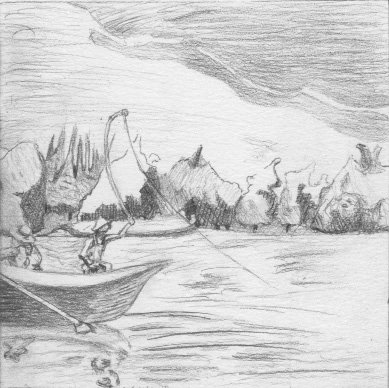
THE END OF SOMETHING
by Ernest Hemingway
In the old days Hortons Bay was a lumbering town. No one who lived in it was out of sound of the big saws in the mill by the lake. Then one year there were no more logs to make lumber. The lumber schooners came into the bay and were loaded with the cut of the mill that stood stacked in the yard. All the piles of lumber were carried away. The big mill building had all its machinery that was removable taken out and hoisted on board one of the schooners by the men who had worked in the mill. The schooner moved out of the bay toward the open lake carrying the two great saws, the traveling carriage that hurled the logs against the revolving, circular saws and all the rollers, wheels, belts and iron piled on a hull-deep load of lumber. Its open hold covered with canvas and lashed tight, the sails of the schooner filled and it moved out into the open lake, carrying with it everything that had made the mill a mill and Hortons Bay, a town.
The one-story bunk houses, the eating-house, the company store, the mill offices, and the big mill itself stood deserted in the acres of sawdust that covered the swampy meadow by the shore of the bay.
Ten years later there was nothing of the mill left except the broken white limestone of its foundations showing through the swampy second growth as Nick and Marjorie rowed along the shore. They were trolling along the edge of the channel-bank where the bottom dropped off suddenly from sandy shallows to twelve feet of dark water. They were trolling on their way to the point to set night lines for rainbow trout.
“There’s our old ruin, Nick,” Marjorie said.
Nick, rowing, looked at the white stone in the green trees.
“There it is,” he said.
“Can you remember when it was a mill?” Marjorie asked.
“I can just remember,” Nick said.
“It seems more like a castle,” Marjorie said.
Nick said nothing. They rowed on out of sight of the mill, following the shore line. Then Nick cut across the bay.
“They aren’t striking,” he said.
“No,” Marjorie said. She was intent on the rod all the time they trolled, even when she talked. She loved to fish. She loved to fish with Nick.
Close beside the boat a big trout broke the surface of the water. Nick pulled hard on one oar so the boat would turn and the bait spinning far behind would pass where the trout was feeding. As the trout’s back came up out of the water the minnows jumped wildly. They sprinkled the surface like a handful of shot thrown into the water. Another trout broke water, feeding on the other side of the boat.
“They’re feeding,” Marjorie said.
“But they won’t strike,” Nick said.
He rowed the boat around to troll past both the feeding fish, then headed it for the point. Marjorie did not reel in until the boat touched the shore.
They pulled the boat up the beach and Nick lifted out a pail of live perch. The perch swam in the water in the pail. Nick caught three of them with his hands and cut their heads off and skinned them while Marjorie chased with her hands in the bucket, finally caught a perch, cut its head off and skinned it. Nick looked at her fish.
“You don’t want to take the ventral fin out,” he said. “It’ll be all right for bait but it’s better with the ventral fin in.”
He hooked each of the skinned perch through the tail. There were two hooks attached to a leader on each rod. Then Marjorie rowed the boat out over the channel-bank, holding the line in her teeth, and looking toward Nick, who stood on the shore holding the rod and letting the line run out from the reel.
“That’s about right,” he called.
“Should I let it drop?” Marjorie called back, holding the line in her hand.
“Sure. Let it go.” Marjorie dropped the line overboard and watched the baits go down through the water.
She came in with the boat and ran the second line out the same way. Each time Nick set a heavy slab of driftwood across the butt of the rod to hold it solid and propped it up at an angle with a small slab. He reeled in the slack line so the line ran taut out to where the bait rested on the sandy floor of the channel and set the click on the reel. When a trout, feeding on the bottom, took the bait it would run with it, taking line out of the reel in a rush and making the reel sing with the click on.
Marjorie rowed up the point a little way so she would not disturb the line. She pulled hard on the oars and the boat went way up the beach. Little waves came in with it. Marjorie stepped out of the boat and Nick pulled the boat high up the beach.
“What’s the matter, Nick?” Marjorie asked.
“I don’t know,” Nick said, getting wood for a fire.
They made a fire with driftwood. Marjorie went to the boat and brought a blanket. The evening breeze blew the smoke toward the point, so Marjorie spread the blanket out between the fire and the lake.
Marjorie sat on the blanket with her back to the fire and waited for Nick. He came over and sat down beside her on the blanket. In back of them was the close second-growth timber of the point and in front was the bay with the mouth of Hortons Creek. It was not quite dark. The firelight went as far as the water. They could both see the two steel rods at an angle over the dark water. The fire glinted on the reels.
Marjorie unpacked the basket of supper.
“I don’t feel like eating,” said Nick.
“Come on and eat, Nick.”
“All right.”
They ate without talking, and watched the two rods and the fire-light in the water.
“There’s going to be a moon tonight,” said Nick. He looked across the bay to the hills that were beginning to sharpen against the sky. Beyond the hills he knew the moon was coming up.
“I know it,” Marjorie said happily.
“You know everything,” Nick said.
“Oh, Nick, please cut it out! Please, please don’t be that way!”
“I can’t help it,” Nick said. “You do. You know everything. That’s the trouble. You know you do.”
Marjorie did not say anything.
“I’ve taught you everything. You know you do. What don’t you know, anyway?”
“Oh, shut up,” Marjorie said. “There comes the moon.”
They sat on the blanket without touching each other and watched the moon rise.
“You don’t have to talk silly,” Marjorie said; “what’s really the matter?”
“I don’t know.”
“Of course you know.”
“No I don’t.”
“Go on and say it.”
Nick looked on at the moon, coming up over the hills.
“It isn’t fun any more.”
He was afraid to look at Marjorie. He looked at Marjorie. She sat there with her back toward him. He looked at her back. “It isn’t fun any more. Not any of it.”
She didn’t say anything. He went on. “I feel as though everything was gone to hell inside of me. I don’t know, Marge. I don’t know what to say.”
He looked on at her back.
“Isn’t love any fun?” Marjorie said.
“No,” Nick said. Marjorie stood up. Nick sat there, his head in his hands.
“I’m going to take the boat,” Marjorie called to him. “You can walk back around the point.”
“All right,” Nick said. “I’ll push the boat off for you.”
“You don’t need to,” she said. She was afloat in the boat on the water with the moonlight on it. Nick went back and lay down with his face in the blanket by the fire. He could hear Marjorie rowing on the water.
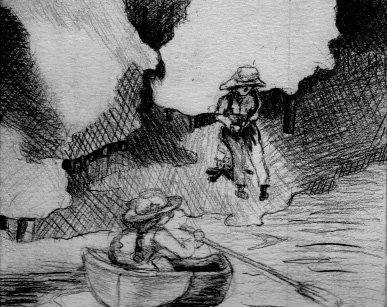
He lay there for a long time. He lay there while he heard Bill come into the clearing, walking around through the woods. He felt Bill coming up to the fire. Bill didn’t touch him, either.
“Did she go all right?” Bill said.
“Oh, yes.” Nick said, lying, his face on the blanket.
“Have a scene?”
“No, there wasn’t any scene.”
“How do you feel?”
“Oh, go away, Bill! Go away for a while.”
Bill selected a sandwich from the lunch basket and walked over to have a look at the rods.
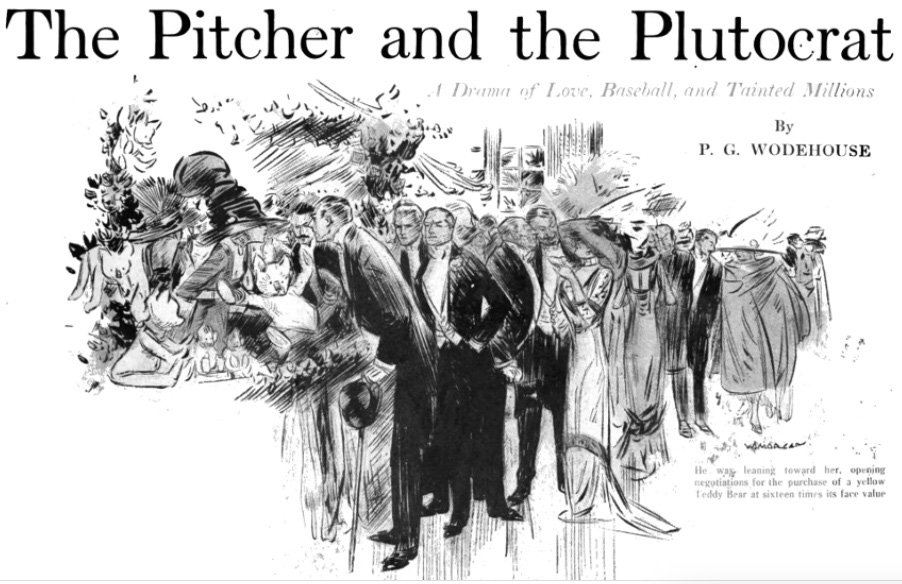
THE main difficulty in writing a story is to convey to the reader clearly yet tersely the natures and dispositions of one’s leading characters. Brevity, brevity—that is the cry. Perhaps, after all, the play-bill style is the best. In this drama of love, baseball, frenzied finance, and tainted millions, then, the principals are as follows, in their order of entry:
Isabel Rackstraw (a peach).
Clarence van Puyster (a Greek god).
Old Man Van Puyster (a proud old aristocrat).
Old Man Rackstraw (a tainted millionaire).
More about Clarence later. For the moment let him go as a Greek god. There were other sides, too, to Old Man Rackstraw’s character; but for the moment let him go as a Tainted Millionaire. Not that it is satisfactory. It is too mild. He was the Tainted Millionaire. The Tainted Millions of other Tainted Millionaires were as attar of roses compared with the Tainted Millions of Tainted Millionaire Rackstraw. He preferred his millions tainted. His attitude toward an untainted million was that of the sportsman toward the sitting bird. These things are purely a matter of taste. Some people like Limburger cheese.
It was at a charity bazaar that Isabel and Clarence first met. Isabel was presiding over the Billiken, Teddy Bear, and Fancy Goods stall. There she stood, that slim, radiant girl, buncoing the Younger Set out of its father’s hard-earned with a smile that alone was nearly worth the money, when she observed, approaching, the handsomest man she had ever seen. It was—this is not one of those mystery stories—it was Clarence van Puyster. Over the heads of the bevy of gilded youths who clustered round the stall their eyes met. A thrill ran through Isabel. She dropped her eyes. The next moment Clarence had bucked center; the Younger Set had shredded away like a mist; and he was leaning toward her, opening negotiations for the purchase of a yellow Teddy Bear at sixteen times its face value.
He returned at intervals during the afternoon. Over the second Teddy Bear they became friendly; over the third, intimate. He proposed as she was wrapping up the fourth Golliwog, and she gave him her heart and the parcel simultaneously. At six o’clock, carrying four Teddy Bears, seven photograph frames, five Golliwogs, and a Billiken, Clarence went home to tell the news to his father.
CLARENCE, when not at college, lived with his only surviving parent in an old red-brick house at the north end of Washington Square. The original Van Puyster had come over in Governor Stuyvesant’s time in one of the then fashionable ninety-four-day boats. Those were the stirring days when they were giving away chunks of Manhattan Island in exchange for trading-stamps; for the bright brain which conceived the idea that the city might possibly at some remote date extend above Liberty Street had not come into existence. The original Van Puyster had acquired a square mile or so in the heart of things for ten dollars cash and a quarter interest in a peddler’s outfit. “The Columbus Echo and Vespucci Intelligencer” gave him a column and a half under the heading: “Reckless Speculator. Prominent Citizen’s Gamble in Land.” On the proceeds of that deal his descendants had led quiet, peaceful lives ever since. If any of them ever did a day’s work, the family records are silent on the point. Blood was their long suit, not Energy. They were plain, homely folk, with a refined distaste for wealth and vulgar hustle. They lived simply, without envy of their richer fellow citizens, on their three hundred thousand dollars a year. They asked no more. It enabled them to entertain on a modest scale; the boys could go to college, the girls buy an occasional new frock. They were satisfied.
HAVING dressed for dinner, Clarence proceeded to the library, where he found his father slowly pacing the room. Silver-haired old Vansuyther van Puyster seemed wrapped in thought. And this was unusual, for he was not given to thinking. To be absolutely frank, the old man had just about enough brain to make a jay-bird fly crooked, and no more.
“Ah, my boy,” he said, looking up as Clarence entered. “Let us go in to dinner. I have been awaiting you for some little time now. I was about to inquire as to your whereabouts. Let us be going.”
Mr. Van Puyster always spoke like that. This was due to Blood.
Until the servants had left them to their coffee and cigarettes, the conversation was desultory and commonplace. But when the door had closed, Mr. Van Puyster leaned forward.
“My boy,” he said quietly, “we are ruined.”
Clarence looked at him inquiringly.
“Ruined much?” he asked.
“Paupers,” said his father. “I doubt if when all is over, I shall have much more than a bare fifty or sixty thousand dollars a year.”
A lesser man would have betrayed agitation, but Clarence was a Van Puyster. He lit a cigarette.
“Ah,” he said calmly. “How’s that?”
Mr. Van Puyster toyed with his coffee-spoon.
“I was induced to speculate—rashly, I fear—on the advice of a man I chanced to meet at a public dinner, in the shares of a certain mine. I did not thoroughly understand the matter, but my acquaintance appeared to be well versed in such operations, so I allowed him to—and, well, in fact, to cut a long story short, I am ruined.”
“Who was the fellow?”
“A man of the name of Rackstraw. Daniel Rackstraw.”
“Daniel Rackstraw!”
Not even Clarence’s training and traditions could prevent a slight start as he heard the name.
“Daniel Rackstraw,” repeated his father. “A man, I fear, not entirely honest. In fact, it seems that he has made a very large fortune by similar transactions. Friends of mine, acquainted with these matters, tell me his behavior toward me amounted practically to theft. However, for myself I care little. We can rough it, we of the old Van Puyster stock. If there is but fifty thousand a year left, well—I must make it serve. It is for your sake that I am troubled, my poor boy. I shall be compelled to stop your allowance. I fear you will be obliged to adopt some profession.” He hesitated for a moment. “In fact, work,” he added.
Clarence drew at his cigarette.
“Work?” he echoed thoughtfully. “Well, of course, mind you, fellows do work. I met a man at the club only yesterday who knew a fellow who had met a man whose cousin worked.”
He reflected for a while.
“I shall pitch,” he said suddenly.
“Pitch, my boy?”
“Sign on as a professional ball player.”
His father’s fine old eyebrows rose a little.
“But, my boy, er— The—ah—family name. Our—shall I say noblesse oblige? Can a Van Puyster pitch and not be defiled?”
“I shall take a new name,” said Clarence. “I will call myself Brown.” He lit another cigarette. “I can get signed on in a minute. McGraw will jump at me.”
This was no idle boast. Clarence had had a good college education, and was now an exceedingly fine pitcher. It was a pleasing sight to see him, poised on one foot in the attitude of a Salome dancer, with one eye on the batter, the other gazing coldly at the man who was trying to steal third, uncurl abruptly like the mainspring of a watch and sneak over a swift one. Under Clarence’s guidance a ball could do practically everything except talk. It could fly like a shot from a gun, hesitate, take the first turning to the left, go up two blocks, take the second to the right, bound in mid-air like a jack-rabbit, and end by dropping as the gentle dew from heaven upon the plate beneath. Briefly, there was class to Clarence. He was the goods.
SCARCELY had he uttered these momentous words when the butler entered with the announcement that he was wanted by a lady at the telephone.
It was Isabel.
Isabel was disturbed.
“Oh, Clarence,” she cried, “my precious angel wonder-child, I don’t know how to begin.”
“Begin just like that,” said Clarence approvingly. “It’s fine. You can’t beat it.”
“Clarence, a terrible thing has happened. I told papa of our engagement, and he wouldn’t hear of it. He was furious. He c-called you a b-b-b—”
“A what?”
“A p-p-p—”
“That’s a new one on me,” said Clarence, wondering.
“A b-beggarly p-pauper. I knew you weren’t well off, but I thought you had two or three millions. I told him so. But he said no, your father had lost all his money.”
“It is too true, dearest,” said Clarence. “I am a pauper. But I’m going to work. Something tells me I shall be rather good at work. I am going to work with all the accumulated energy of generations of ancestors who have never done a hand’s turn. And some day when I—”
“Good-by,” said Isabel hastily, “I hear papa coming.”
The season during which Clarence van Puyster pitched for the Giants is destined to live long in the memory of followers of baseball. Probably never in the history of the game has there been such persistent and wide-spread mortality among the more distant relatives of office-boys and junior clerks. Statisticians have estimated that if all the grandmothers alone who perished between the months of April and October that year could have been placed end to end they would have reached considerably further than Minneapolis. And it was Clarence who was responsible for this holocaust. Previous to the opening of the season skeptics had shaken their heads over the Giants’ chances for the pennant. It had been assumed that as little new blood would be forthcoming as in other years, and that the fate of Our City would rest, as usual, on the shoulders of the white-haired veterans who were boys with Lafayette.
And then, like a meteor, Clarence van Puyster had flashed upon the world of fans, bugs, chewing-gum, and nuts (pea and human). In the opening game he had done horrid things to nine men from Boston; and from then onward, except for an occasional check, the Giants had never looked back.
Among the spectators who thronged the bleachers to watch Clarence perform there appeared week after week a little, gray, dried-up man, insignificant except for a certain happy choice of language in moments of emotion and an enthusiasm far surpassing that of the ordinary spectator. To the trained eye there is a subtle but well-marked difference between the fan, the bug, and—the last phase—the nut of the baseball world. This man was an undoubted nut. It was writ clear across his brow.
FATE had made Daniel Rackstraw—for it was he—a tainted millionaire, but at heart he was a baseball spectator. He never missed a game. His library of baseball literature was the finest in the country. His baseball museum had but one equal, that of Mr. Jacob Dodson of Detroit. Between them the two had cornered, at enormous expense, the curio market of the game. It was Rackstraw who had secured the glove worn by Neal Ball, the Cleveland shortstop, when he made the only unassisted triple play in the history of the game; but it was Dodson who possessed the bat which Hans Wagner used as a boy. The two men were friends, as far as rival connoisseurs can be friends; and Mr. Dodson, when at leisure, would frequently pay a visit to Mr. Rackstraw’s country home, where he would spend hours gazing wistfully at the Neal Ball glove buoyed up only by the thought of the Wagner bat at home.
ISABEL saw little of Clarence during the summer months, except from a distance. She contented herself with clipping photographs of him from the evening papers. Each was a little more unlike him than the last, and this lent variety to the collection. Her father marked her new-born enthusiasm for the national game with approval. It had been secretly a great grief to the old buccaneer that his only child did not know the difference between a bunt and a swat, and, more, did not seem to care to know. He felt himself drawn closer to her. An understanding, as pleasant as it was new and strange, began to spring up between parent and child.
As for Clarence, how easy it would be to cut loose to practically an unlimited extent on the subject of his emotions at this time. One can figure him, after the game is over and the gay throng has dispersed, creeping moodily—but what’s the use? Brevity. That is the cry. Brevity.
Let us on.
THE months sped by. August came and went, and September; and soon it was plain to even the casual follower of the game that, unless something untoward should happen, the Giants must secure the National League pennant. Those were delirious days for Daniel Rackstraw. Long before the beginning of October his voice had dwindled to a husky whisper. Deep lines appeared on his forehead; for it is an awful thing for a baseball nut to be compelled to root, in the very crisis of the season, purely by means of facial expression. In this time of affliction he found Isabel an ever-increasing comfort to him. Side by side they would sit at the Polo Grounds, and the old man’s face would lose its drawn look, and light up, as her clear young soprano pealed out above the din, urging this player to slide for second, that to knock the stitching off the ball; or describing the umpire in no uncertain voice as a reincarnation of the late Mr. Jesse James.
Meanwhile, in the American League, Detroit had been heading the list with equal pertinacity; and in far-off Michigan Mr. Jacob Dodson’s enthusiasm had been every whit as great as Mr. Rackstraw’s in New York. It was universally admitted that when the championship series came to be played, there would certainly be something doing.
But, alas! How truly does Epictetus observe: “We know not what awaiteth us around the corner, and the hand that counteth its chickens ere they be hatched ofttimes graspeth but a lemon.” The prophets who anticipated a struggle closer than any on record were destined to be proved false.
It was not that their judgment of form was at fault. By every law of averages the Giants and the Tigers should have been the two most evenly matched nines in the history of the game. In fielding there was nothing to choose between them. At hitting the Tigers held a slight superiority; but this was balanced by the inspired pitching of Clarence van Puyster. Even the keenest supporters of either side were not confident. They argued at length, figuring out the odds with the aid of stubs of pencils and the backs of envelopes, but they were not confident. Out of all those frenzied millions two men alone had no doubts. Mr. Daniel Rackstraw said that he did not desire to be unfair to Detroit. He wished it to be clearly understood that in their own class the Tigers might quite possibly show to considerable advantage. In some rural league down South, for instance, he did not deny that they might sweep all before them. But when it came to competing with the Giants— Here words failed Mr. Rackstraw, and he had to rush to Wall Street and collect several tainted millions before he could recover his composure.
Mr. Jacob Dodson, interviewed by the Detroit Weekly Rooter, stated that his decision, arrived at after a close and careful study of the work of both teams, was that the Giants had rather less chance in the forthcoming tourney than a lone gum-drop at an Eskimo tea-party. It was his carefully considered opinion that in a contest with the Avenue B Juniors the Giants might, with an effort, scrape home. But when it was a question of meeting a live team like Detroit— Here Mr. Dodson, shrugging his shoulders despairingly, sank back in his chair, and watchful secretaries brought him round with oxygen.
Throughout the whole country nothing but the approaching series was discussed. Wherever civilization reigned, and in Jersey City, one question alone was on every lip: Who would win? Octogenarians mumbled it. Infants lisped it. Tired business men, trampled under foot in the rush for the West Farms express, asked it of the ambulance attendants who carried them to hospital.
And then, one bright, clear morning, when all Nature seemed to smile, Clarence van Puyster developed mumps.
New York was in a ferment. I could have wished to go into details, to describe in crisp, burning sentences the panic that swept like a tornado through a million homes. A little encouragement, the slightest softening of the editorial austerity, and the thing would have been done. But no. Brevity. That was the cry. Brevity.
Let us on.
THE Tigers met the Giants at the Polo Grounds, and for five days the sweat of agony trickled unceasingly down the corrugated foreheads of the patriots who sat on the bleachers. The men from Detroit, freed from the fear of Clarence, smiled grim smiles and proceeded to knock holes through the fence. It was in vain that the home fielders skimmed like swallows around the diamond. They could not keep the score down. From start to finish the Giants were a beaten side.
Broadway during that black week was a desert. Gloom gripped Lobster Square. In distant Harlem red-eyed wives faced silently scowling husbands at the evening meal, and the children were sent early to bed. Newsboys called the extras in a whisper.
Few took the tragedy more nearly to heart than Daniel Rackstraw. Each afternoon found him more deeply plunged in sorrow. On the last day, leaving the ground with the air of a father mourning over some prodigal son, he encountered Mr. Jacob Dodson of Detroit.
Now, Mr. Dodson was perhaps the slightest bit shy on the finer feelings. He should have respected the grief of a fallen foe. He should have abstained from exulting. But he was in too exhilarated a condition to be magnanimous. Sighting Mr. Rackstraw, he addressed himself joyously to the task of rubbing the thing in. Mr. Rackstraw listened in silent anguish.
“If we had had Brown—” he said at length.
“That’s what they all say,” whooped Mr. Dodson. “Brown! Who’s Brown?”
“If we had had Brown, we should have—” He paused. An idea had flashed upon his overwrought mind. “Dodson,” he said, “listen here. Wait till Brown is well again, and let us play this thing off again for anything you like a side in my private park.”
MR. DODSON reflected.
“You’re on,” he said. “What side bet? A million? Two million? Three?”
Mr. Rackstraw shook his head scornfully.
“A million? Who wants a million? I’ll put up my Neal Ball glove against your Hans Wagner bat. The best of three games. Does that go?”
“I should say it did,” said Mr. Dodson joyfully. “I’ve been wanting that glove for years. It’s like finding it in one’s Christmas stocking.”
“Very well,” said Mr. Rackstraw. “Then let’s get it fixed up.”
Honestly, it is but a dog’s life, that of the short-story writer. I particularly wished at this point to introduce a description of Mr. Rackstraw’s country home and estate, featuring the private ball park with its fringe of noble trees. It would have served a double purpose, not only charming the lover of nature, but acting as a fine stimulus to the youth of the country, showing them the sort of home they would be able to buy some day if they worked hard and saved their money. But no. You shall have three guesses as to what was the cry. You give it up? It was “Brevity! Brevity!”
Let us on.
The two teams arrived at the Rackstraw house in time for lunch. Clarence, his features once more reduced to their customary finely-chiseled proportions, alighted from the automobile with a swelling heart. He could see nothing of Isabel, but that did not disturb him. Letters had passed between the two. Clarence had warned her not to embrace him in public, as McGraw would not like it; and Isabel accordingly had arranged a tryst among the noble trees which fringed the ball-park.
I will pass lightly over the meeting of the two lovers. I will not describe the dewy softness of their eyes, the catching of their breath, their murmured endearments. I could, mind you. It is at just such descriptions that I am particularly happy. But I have grown discouraged. My spirit is broken. It is enough to say that Clarence had reached a level of emotional eloquence rarely met with among pitchers of the National League, when Isabel broke from him with a startled exclamation, and vanished behind a tree; and, looking over his shoulder, Clarence observed Mr. Daniel Rackstraw moving toward him.
IT WAS evident from the millionaire’s demeanor that he had seen nothing. The look on his face was anxious, but not wrathful. He sighted Clarence, and hurried up to him.
“Say, Brown,” he said, “I’ve been looking for you. I want a word with you.”
“A thousand, if you wish it,” said Clarence courteously.
“Now, see here,” said Mr. Rackstraw. “I want to explain to you just what this ball game means to me. Don’t run away with the idea I’ve had you fellows down to play an exhibition game just to keep me merry and bright. If the Giants win to-day, it means that I shall be able to hold up my head again and look my fellow man in the face, instead of crawling around on my stomach and feeling like thirty cents. Do you get that?”
“I am hep,” replied Clarence with simple dignity.
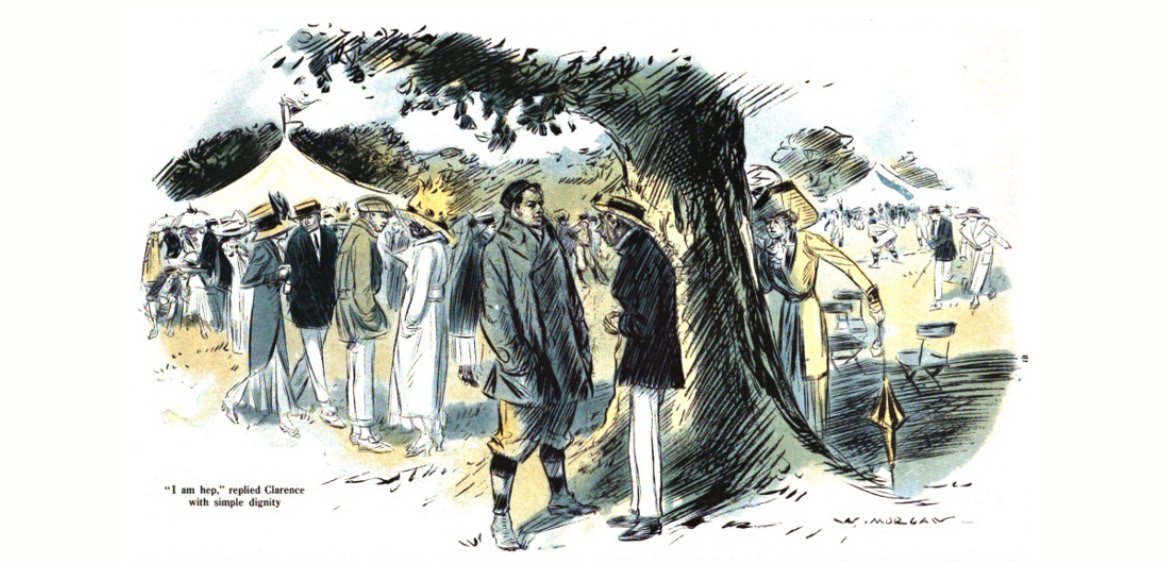
“And not only that,” went on the millionaire. “There’s more to it. I have put up my Neal Ball glove against Mr. Dodson’s Wagner bat as a side-bet. You understand what that means? It means that either you win or my life is soured for keeps. See?”
“I have got you,” said Clarence.
“Good. Then what I wanted to say was this. To-day is your day for pitching as you’ve never pitched before. Everything depends on whether you make good or not. With you pitching like mother used to make it, the Giants are some nine. Otherwise they are Nature’s citrons. It’s one thing or the other. It’s all up to you. Win, and there’s twenty thousand dollars waiting for you above what you share with the others.”
CLARENCE waved his hand deprecatingly.
“Mr. Rackstraw,” he said, “keep your dough. I care nothing for money.”
“You don’t?” cried the millionaire. “Then you ought to exhibit yourself in a dime museum.”
“All I ask of you,” proceeded Clarence, “is your consent to my engagement to your daughter.”
Mr. Rackstraw looked sharply at him.
“Repeat that,” he said. “I don’t think I quite got it.”
“All I ask is your consent to my engagement to your daughter.”
“Young man,” said Mr. Rackstraw, not without a touch of admiration, “you have gall.”
“My friends have sometimes said so,” said Clarence.
“And I admire gall. But there is a limit. That limit you have passed so far that you’d need to look for it with a telescope.”
“You refuse your consent.”
“I never said you weren’t a clever guesser.”
“Why?”
Mr. Rackstraw laughed. One of those nasty, sharp, metallic laughs that hit you like a bullet.
“How would you support my daughter?”
“I was thinking that you would help to some extent.”
“You were, were you?”
“I was.”
“Oh?”
Mr. Rackstraw emitted another of those laughs.
“Well,” he said, “it’s off. You can take that as coming from an authoritative source. No wedding-bells for you.”
Clarence drew himself up, fire flashing from his eyes and a bitter smile curving his expressive lips.
“And no Wagner bat for you!” he cried.
Mr. Rackstraw started as if some strong hand had plunged an auger into him.
“What!” he shouted.
Clarence shrugged his superbly modeled shoulders in silence.
“Say,” said Mr. Rackstraw, “you wouldn’t let a little private difference like that influence you any in a really important thing like this ball game, would you?”
“I would.”
“You would hold up the father of the girl you love?”
“Every time.”
“Her white-haired old father?”
“The color of his hair would not affect me.”
“Nothing would move you?”
“Nothing.”
“Then, by George, you’re just the son-in-law I want. You shall marry Isabel; and I’ll take you into partnership this very day. I’ve been looking for a good, husky bandit like you for years. You make Dick Turpin look like a preliminary three-round bout. My boy, we’ll be the greatest team, you and I, that ever hit Wall Street.”
“Papa!” cried Isabel, bounding happily from behind her tree.
Mr. Rackstraw joined their hands, deeply moved, and spoke in low, vibrant tones:
“Play ball!”
LITTLE remains to be said, but I am going to say it, if it snows. I am at my best in these tender scenes of idyllic domesticity.
Four years have passed. Once more we are in the Rackstraw home. A lady is coming down the stairs, leading by the hand her little son. It is Isabel. The years have dealt lightly with her. She is still the same stately, beautiful creature whom I would have described in detail long ago if I had been given half a chance. At the foot of the stairs the child stops and points at a small, wooden object in a glass case.
“Wah?” he says.
“That?” says Isabel. “That is the bat Mr. Wagner used to use when he was a little boy.”
She looks at a door on the left of the hall, and puts a finger to her lip.
“Hush!” she says. “We must be quiet. Daddy and grandpa are busy in there cornering wheat.”
And softly mother and child go out into the sunlit garden.
THE END
First published in Collier’s Weekly September 24, 1910
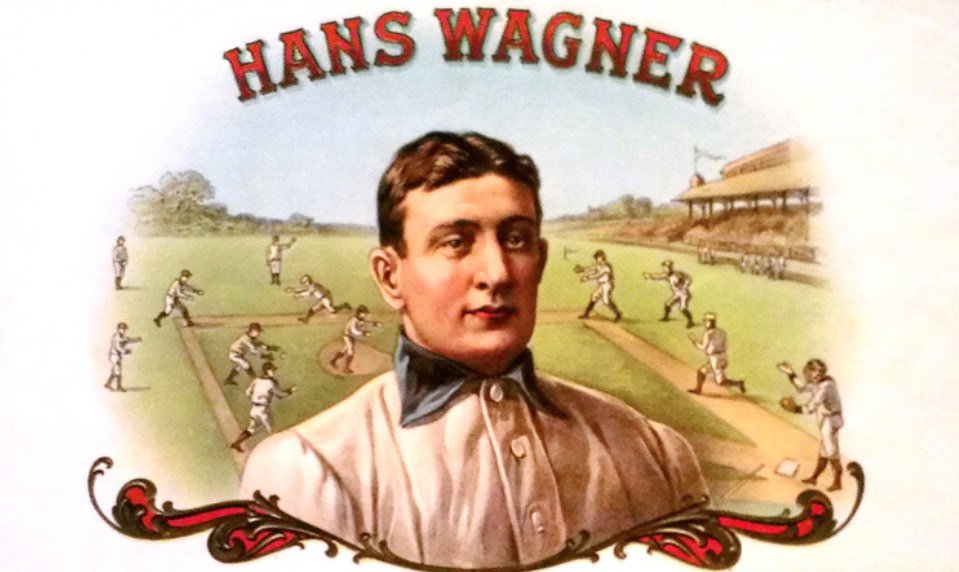

On a side note: Maxfield Parish painted the cover of this issue.

I have used dirty tricks to find love in my own time. Many times I have sent Cthulhu to my potential suitors’ home to discuss having her father for dinner, I mean Cthulhu will have him for dinner...
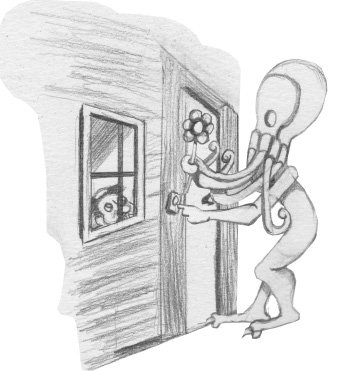
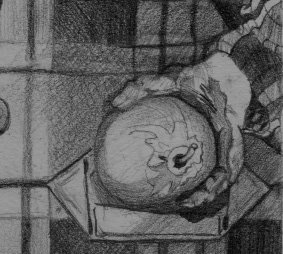
THE THREE DAY BLOW
by Ernest Hemingway
The rain stopped as Nick turned into the road that went up through the orchard. The fruit had been picked and the fall wind blew through the bare trees. Nick stopped and picked up a Wagner apple from beside the road, shiny in the brown grass from the rain. He put the apple in the pocket of his Mackinaw coat.
The road came out of the orchard on to the top of the hill. There was the cottage, the porch bare, smoke coming from the chimney. In back was the garage, the chicken coop and the second-growth timber like a hedge against the woods behind. The big trees swayed far over in the wind as he watched. It was the first of the autumn storms.
As Nick crossed the open field above the orchard the door of the cottage opened and Bill came out. He stood on the porch looking out.
“Well, Wemedge,” he said.
“Hey, Bill,” Nick said, coming up the steps.
They stood together looking out across the country, down over the orchard, beyond the road, across the lower fields and the woods of the point to the lake. The wind was blowing straight down the lake. They could see the surf along Ten Mile point.
“She’s blowing,” Nick said.
“She’ll blow like that for three days,” Bill said.
“Is your dad in?” Nick asked.
“No. He’s out with the gun. Come on in.”
Nick went inside the cottage. There was a big fire in the fireplace. The wind made it roar. Bill shut the door.
“Have a drink?” he said.
He went out to the kitchen and came back with two glasses and a pitcher of water. Nick reached the whisky bottle from the shelf above the fireplace.
“All right?” he said.
“Good,” said Bill.
They sat in front of the fire and drank the Irish whisky and water.
“It’s got a swell, smoky taste,” Nick said, and looked at the fire through the glass.
“That’s the peat,” Bill said.
“You can’t get peat into liquor,” Nick said.
“That doesn’t make any difference,” Bill said.
“You ever seen any peat?” Nick asked.
“No,” said Bill.
“Neither have I,” Nick said.
His shoes, stretched out on the hearth, began to steam in front of the fire.
“Better take your shoes off,” Bill said.
“I haven’t got any socks on.”
“Take them off and dry them and I’ll get you some,” Bill said. He went upstairs into the loft and Nick heard him walking about overhead. Upstairs was open under the roof and was where Bill and his father and he, Nick, sometimes slept. In back was a dressing room. They moved the cots back out of the rain and covered them with rubber blankets.
Bill came down with a pair of heavy wool socks.
“It’s getting too late to go around without socks,” he said.
“I hate to start them again,” Nick said. He pulled the socks on and slumped back in the chair, putting his feet up on the screen in front of the fire.
“You’ll dent in the screen,” Bill said. Nick swung his feet over to the side of the fireplace.
“Got anything to read?” he asked.
“Only the paper.”
“What did the Cards do?”
“Dropped a double header to the Giants.”
“That ought to cinch it for them.”
“It’s a gift,” Bill said. “As long as McGraw can buy every good ball player in the league there’s nothing to it.”
“He can’t buy them all,” Nick said.
“He buys all the ones he wants,” Bill said. “Or he makes them discontented so they have to trade them to him.”
“Like Heinie Zim,” Nick agreed.
“That bonehead will do him a lot of good.”
Bill stood up.
“He can hit,” Nick offered. The heat from the fire was baking his legs.
“He’s a sweet fielder, too,” Bill said. “But he loses ball games.”
“Maybe that’s what McGraw wants him for,” Nick suggested.
“Maybe,” Bill agreed.
“There’s always more to it than we know about,” Nick said.
“Of course. But we’ve got pretty good dope for being so far away.”
“Like how much better you can pick them if you don’t see the horses.”
“That’s it.”
Bill reached down the whisky bottle. His big hand went all the way around it. He poured the whisky into the glass Nick held out.
“How much water?”
“Just the same.”
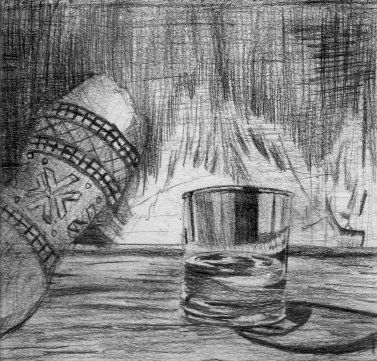
He sat down on the floor beside Nick’s chair.
“It’s good when the fall storms come, isn’t it?” Nick said.
“It’s swell.”
“It’s the best time of year,” Nick said.
“Wouldn’t it be hell to be in town?” Bill said.
“I’d like to see the World Series,” Nick said.
“Well, they’re always in New York or Philadelphia now,” Bill said. “That doesn’t do us any good.”
“I wonder if the Cards will ever win a pennant?”
“Not in our lifetime,” Bill said.
“Gee, they’d go crazy,” Nick said.
“Do you remember when they got going that once before they had the train wreck?”
“Boy!” Nick said, remembering.
Bill reached over to the table under the window for the book that lay there, face down, where he had put it when he went to the door. He held his glass in one hand and the book in the other, leaning back against Nick’s chair.
“What are you reading?”
“’Richard Feverel.’”
“I couldn’t get into it.”
“It’s all right,” Bill said. “It ain’t a bad book, Wemedge.”
“What else have you got I haven’t read?” Nick asked.
“Did you read the Forest Lovers?”
“Yup. That’s the one where they go to bed every night with the naked sword between them.”
“That’s a good book, Wemedge.”
“It’s a swell book. What I couldn’t ever understand was what good the sword would do. It would have to stay edge up all the time because if it went over flat you could roll right over it and it wouldn’t make any trouble.”
“It’s a symbol,” Bill said.
“Sure,” said Nick, “but it isn’t practical.”
“Did you ever read Fortitude?”
“It’s fine,” Nick said. “That’s a real book. That’s where his old man is after him all the time. Have you got any more by Walpole?”
“The Dark Forest,” Bill said. “It’s about Russia.”
“What does he know about Russia?” Nick asked.
“I don’t know. You can’t ever tell about those guys. Maybe he was there when he was a boy. He’s got a lot of dope on it.”
“I’d like to meet him,” Nick said.
“I’d like to meet Chesterton,” Bill said.
“I wish he was here now,” Nick said. “We’d take him fishing to the ‘Voix’ tomorrow.”
“I wonder if he’d like to go fishing,” Bill said.
“Sure,” said Nick. “He must be about the best guy there is. Do you remember the Flying Inn?”
“’If an angel out of heaven
Gives you something else to drink,
Thank him for his kind intentions;
Go and pour them down the sink.’”
“That’s right,” said Nick. “I guess he’s a better guy than Walpole.”
“Oh, he’s a better guy, all right,” Bill said.
“But Walpole’s a better writer.”
“I don’t know,” Nick said. “Chesterton’s a classic.”
“Walpole’s a classic, too,” Bill insisted.
“I wish we had them both here,” Nick said. “We’d take them both fishing to the ‘Voix’ tomorrow.”
“Let’s get drunk,” Bill said.
“All right,” Nick agreed.
“My old man won’t care,” Bill said.
“Are you sure?” said Nick.
“I know it,” Bill said.
“I’m a little drunk now,” Nick said.
“You aren’t drunk,” Bill said.
He got up from the floor and reached for the whisky bottle. Nick held out his glass. His eyes fixed on it while Bill poured.
Bill poured the glass half full of whisky.
“Put in your own water,” he said. “There’s just one more shot.”
“Got any more?” Nick asked.
“There’s plenty more but dad only likes me to drink what’s open.”
“Sure,” said Nick.
“He says opening bottles is what makes drunkards,” Bill explained.
“That’s right,” said Nick. He was impressed. He had never thought of that before. He had always thought it was solitary drinking that made drunkards.
“How is your dad?” he asked respectfully.
“He’s all right,” Bill said. “He gets a little wild sometimes.”
“He’s a swell guy,” Nick said. He poured water into his glass out of the pitcher. It mixed slowly with the whisky. There was more whisky than water.
“You bet your life he is,” Bill said.
“My old man’s all right,” Nick said.
“You’re damn right he is,” said Bill.
“He claims he’s never taken a drink in his life,” Nick said, as though announcing a scientific fact.
“Well, he’s a doctor. My old man’s a painter. That’s different.”
“He’s missed a lot,” Nick said sadly.
“You can’t tell,” Bill said. “Everything’s got its compensations.”
“He says he’s missed a lot himself,” Nick confessed.
“Well, dad’s had a tough time,” Bill said.
“It all evens up,” Nick said.
They sat looking into the fire and thinking of this profound truth.
“I’ll get a chunk from the back porch,” Nick said. He had noticed while looking into the fire that the fire was dying down. Also he wished to show he could hold his liquor and be practical. Even if his father had never touched a drop Bill was not going to get him drunk before he himself was drunk.
“Bring one of the big beech chunks,” Bill said. He was also being consciously practical.
Nick came in with the log through the kitchen and in passing knocked a pan off the kitchen table. He laid the log down and picked up the pan. It had contained dried apricots, soaking in water. He carefully picked up all the apricots off the floor, some of them had gone under the stove, and put them back in the pan. He dipped some more water onto them from the pail by the table. He felt quite proud of himself. He had been thoroughly practical.
He came in carrying the log and Bill got up from the chair and helped him put it on the fire.
“That’s a swell log,” Nick said.
“I’d been saving it for the bad weather,” Bill said. “A log like that will burn all night.”
“There’ll be coals left to start the fire in the morning,” Nick said.
“That’s right,” Bill agreed. They were conducting the conversation on a high plane.
“Let’s have another drink,” Nick said.
“I think there’s another bottle open in the locker,” Bill said.
He kneeled down in the corner in front of the locker and brought out a square-faced bottle.
“It’s Scotch,” he said.
“I’ll get some more water,” Nick said. He went out into the kitchen again. He filled the pitcher with the dipper with cold spring water from the pail. On his way back to the living room he passed a mirror in the dining room and looked in it. His face looked strange. He smiled at the face in the mirror and it grinned back at him. He winked at it and went on. It was not his face but it didn’t make any difference.
Bill had poured out the drinks.
“That’s an awfully big shot,” Nick said.
“Not for us, Wemedge,” Bill said.
“What’ll we drink to?” Nick asked, holding up the glass.
“Let’s drink to fishing,” Bill said.
“All right,” Nick said. “Gentlemen, I give you fishing.”
“All fishing,” Bill said. “Everywhere.”
“Fishing,” Nick said. “That’s what we drink to.”
“It’s better than baseball,” Bill said.
“There isn’t any comparison,” said Nick. “How did we ever get talking about baseball?”
“It was a mistake,” Bill said. “Baseball is a game for louts.”
They drank all that was in their glasses.
“Now let’s drink to Chesterton.”
“And Walpole,” Nick interposed.
Nick poured out the liquor. Bill poured in the water. They looked at each other. They felt very fine.
“Gentlemen,” Bill said, “I give you Chesterton and Walpole.”
“Exactly, gentlemen,” Nick said.
They drank. Bill filled up the glasses. They sat down in the big chairs in front of the fire.
“You were very wise, Wemedge,” Bill said.
“What do you mean?” asked Nick.
“To bust off that Marge business,” Bill said.
“I guess so,” said Wemedge.
“It was the only thing to do. If you hadn’t, by now you’d be back home working trying to get enough money to get married.”
Nick said nothing.
“Once a man’s married he’s absolutely bitched,” Bill went on. “He hasn’t got anything more. Nothing. Not a damn thing. He’s done for. You’ve seen the guys that get married.”
Nick said nothing.
“You can tell them,” Bill said. “They get this sort of fat married look. They’re done for.”
“Sure,” said Nick.
“It was probably bad busting it off,” Bill said. “But you always fall for somebody else and then it’s all right. Fall for them but don’t let them ruin you.”
“Yes,” said Nick.
“If you’d have married her you would have had to marry the whole family. Remember her mother and that guy she married. The fat one?”
Nick nodded.
“Imagine having them around the house all the time and going to Sunday dinners at their house, and having them over to dinner and her telling Marge all the time what to do and how to act.”
Nick sat quiet.
“You come out of it damned well,” Bill said. “Now she can marry somebody of her own sort and settle down and be happy. You can’t mix oil and water and you can’t mix that sort of thing any more than if I’d marry Ida that works for Strattons. She’d probably like it, too.”
Nick said nothing. The liquor had all died out of him and left him alone. Bill wasn’t there. He wasn’t sitting in front of the fire or going fishing tomorrow with Bill and his dad or anything. He wasn’t drunk. It was all gone. All he knew was that he had once had Marjorie and that he had lost her. She was gone and he had sent her away. That was all that mattered. He might never see her again. Probably he never would. It was all gone, finished.
“Let’s have another drink,” Nick said.
Bill poured it out. Nick splashed in a little water.
“If you’d gone on that way we wouldn’t be here now,” Bill said.
That was true. His original plan had been to go down home and get a job. Then he had planned to stay in Charlevoix all winter so he could be near Marge. Now he did not know what he was going to do.
“Probably we wouldn’t even be going fishing tomorrow,” Bill said. “You had the right dope, all right.”
“I couldn’t help it,” Nick said.
“I know. That’s the way it works out,” Bill said.
“All of a sudden everything was over,” Nick said. “I don’t know why it was. I couldn’t help it. Just like when the three-day blows come now and rip all the leaves off the trees.”
“Well, it’s over. That’s the point,” Bill said.
“It was my fault,” Nick said.
“It doesn’t make any difference whose fault it was,” Bill said.
“No, I suppose not,” Nick said.
The big thing was that Marjorie was gone and that probably he would never see her again. He had talked to her about how they would go to Italy together and the fun they would have. Places they would be together. It was all gone now. Something gone out of him.
“So long as it’s over that’s all that matters,” Bill said. “I tell you, Wemedge, I was worried while it was going on. You played it right. I understand her mother is sore as hell. She told a lot of people you were engaged.”
“We weren’t engaged,” Nick said.
“It was all around that you were.”
“I can’t help it,” Nick said. “We weren’t.”
“Weren’t you going to get married?” Bill asked.
“Yes. But we weren’t engaged,” Nick said.
“What’s the difference?” Bill asked judicially.
“I don’t know. There’s a difference.”
“I don’t see it,” said Bill.
“All right,” said Nick. “Let’s get drunk.”
“All right,” Bill said. “Let’s get really drunk.”
“Let’s get drunk and then go swimming,” Nick said.
He drank off his glass.
“I’m sorry as hell about her but what could I do?” he said. “You know what her mother was like!”
“She was terrible,” Bill said.
“All of a sudden it was over,” Nick said. “I oughtn’t to talk about it.”
“You aren’t,” Bill said. “I talked about it and now I’m through. We won’t ever speak about it again. You don’t want to think about it. You might get back into it again.”
Nick had not thought about that. It had seemed so absolute. That was a thought. That made him feel better.
“Sure,” he said. “There’s always that danger.”
He felt happy now. There was not anything that was irrevocable. He might go into town Saturday night. Today was Thursday.
“There’s always a chance,” he said.
“You’ll have to watch yourself,” Bill said.
“I’ll watch myself,” he said.
He felt happy. Nothing was finished. Nothing was ever lost. He would go into town on Saturday. He felt lighter, as he had felt before Bill started to talk about it. There was always a way out.
“Let’s take the guns and go down to the point and look for your dad,” Nick said.
“All right.”
Bill took down the two shotguns from the rack on the wall. He opened a box of shells. Nick put on his Mackinaw coat and his shoes. His shoes were stiff from the drying. He was still quite drunk but his head was clear.
“How do you feel?” Nick asked.
“Swell. I’ve just got a good edge on.” Bill was buttoning up his sweater.
“There’s no use getting drunk.”
“No. We ought to get outdoors.”
They stepped out the door. The wind was blowing a gale.
“The birds will lie right down in the grass with this,” Nick said.
They struck down toward the orchard.
“I saw a woodcock this morning,” Bill said.
“Maybe we’ll jump him,” Nick said.
“You can’t shoot in this wind,” Bill said.
Outside now the Marge business was no longer so tragic. It was not even very important. The wind blew everything like that away.
“It’s coming right off the big lake,” Nick said.
Against the wind they heard the thud of a shotgun.
“That’s dad,” Bill said. “He’s down in the swamp.”
“Let’s cut down that way,” Nick said.
“Let’s cut across the lower meadow and see if we jump anything,” Bill said.
“All right,” Nick said.
None of it was important now. The wind blew it out of his head. Still he could always go into town Saturday night. It was a good thing to have in reserve.
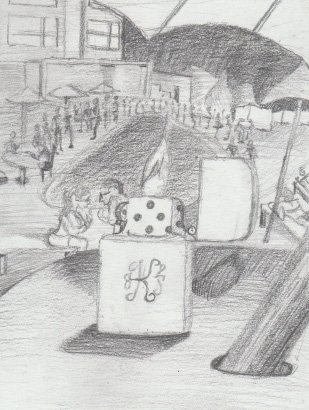

Beloved Plain Jane's Secret
By Lisa Deschenes



Eliza Jane Rogan walked the much worn path that wound its way around the perimeter of Greenlawn Cemetery. This was not only an exercise regiment, but also served as her daily dose of serenity. Although only in her late twenties, Eliza shouldered the burden of her name from a bygone era, which her mother had placed on her. She was supposed to be a Logan, but her parents had been misled by the sonogram decreeing her as a baby of the male persuasion. Shocked by the revelation of her true gender and not having had time to select a proper alternative female moniker upon her entrance into the world, her mother who had been binge watching episodes of Little House on the Prairie during the later half of her pregnancy, quickly chose to christen her as Eliza Jane, the spinster school marm character who had appeared for season five and then left unmissed, appearing only for sporadic visits during the remainder of the series.
When Eliza Jane had asked about the name choice some years later, her mother explained that she felt this was a better option in comparison to the alternative of Baby Girl Rogan, that the nurses had labeled her bassinet in the nursery. Eliza Jane thought it might have been worse; if she had been born a boy as intended, she would have been Logan Rogan.
As a small child who had started her linguistic stage in life with a lisp, Eliza Jane came out sounding as Litha Thane, to the endless mirth of her classmates. Later, when nicknames were popular among her peers, Eliza Jane discovered that there were no suitable nom de guerres to be found. Ellie, Lizzie, Liz, just didn't fit.
Despite the early challenges it posed, Eliza Jane had come to terms with her name. As a young adult, her name now lent her a unique air. If only that alone would give her a step up in the dating department, she would completely embrace her old fashioned moniker.
It wasn't as if Eliza Jane was unattractive; also it was just that she was… well… plain. Her long hair, while a nice shade of auburn, was always pulled up into a matronly bun, not a hair out of place. Her eyes, a lovely hazel color, appeared minimized behind the strength of her eyeglass lenses prescribed for her advanced myopia. Even with this aid, she squinted from habit. A smattering of freckles crossed the bridge of her nose, adding the only color to her pale visage. If she possessed any curves to her stick-like frame, they were inconspicuous beneath the over-sized, baggy clothes she wore. When her adolescent classmates had finally crowned her with a nickname, it had been Plain Jane, a name which she could see the truth in, but still detested.
In addition to her lack of physical attributes, as if this were not enough to detract anyone with a scrutinizing eye, she was also painfully shy and even the thought of approaching someone of the opposite sex terrified her. Sitting back waiting for a guy to make the first move didn't seem to be a successful strategy either. Her bashful nature made her seem aloof to any potential suitors. Maybe if she had been born in the original Eliza Jane's era of the 1800's, when men were expected to do the pursuing and women were expected to be modestly coy, things would have been different.
To heap on the misfortune of her hindered looks and personality, the few experiences that she had had with males had been unpleasant to say the least. In her grade school years she had been teased— what would be labeled as being bullied today. She was the brunt of their laughs. Unfortunately at this stage, when a girl most relied on the wisdom and support of a mother, both her parents had died in an avalanche while away on a weekend ski trip. Her aunt with whom she went to live, although sympathetic, was childless and was at a loss as to how to best help her young charge.
In high school, it became worse; they had found another use for her in providing amusement. More than once, she had been the pawn in a wager. I bet Eliza Jane is so desperate for attention, she'll let me get in her pants. She had been the school joke.
As a result of her younger years of experience, once she grew into adulthood, she questioned every overture of male conversation as being some kind of ploy. Even in what could be considered her stereotypical role as Salem's librarian, she over-examined even mild mannered inquiries. Was he really interested in dog breeding when he asked where to find the Book of the Bitch: A Complete Guide to Understanding and Caring for Bitches? Or is he just trying to get a reaction from me?
Eliza Jane sighed. She had rounded the path just past Greenlawn Cemetery's Sargent Pond.
As she made her way to the main gate, she saw a young man sitting on the ground of what appeared to be a new grave site. He was leaning on the headstone that simply proclaimed Beloved on its granite surface. He wept as he embraced the marker, as if to hold onto to a substitute of whom he could no longer physically enfold in his arms.

She was deeply touched by his sorrow. The man appeared to be about her own age. A cascade of reddish golden curls, similar to the shade of Eliza Jane's own hair, crowned his head. Fleetingly, she thought how complementary their heads would be if leaning together.
What is wrong with you? The man is obviously in pain and you're selfishly thinking about what a cute couple you would make, Eliza Jane silently reprimanded herself.
She averted her eyes, dropping them to her feet as she passed to allow him some privacy. Of course avoiding eye contact with men was also her habit.
"I'm sorry. I didn't mean to disturb your walk," a voice called out.
Eliza Jane paused.
She had clearly heard the apology, but was fairly certain it could not have been directed at her. She turned to glance behind her on the gravel path, looking for the intended recipient of the communication, but other than a raven perched on a headstone looking at her curiously, there wasn't another soul in sight.
Again the man at the grave spoke, "I was addressing you, Miss. I just wanted to extend my regret if my sobbing had intruded on your peace."
This time Eliza Jane looked directly at the young man; well, as directly as Eliza Jane looked at any man. In doing so she was able to confirm that he was indeed speaking to her.
She cleared her throat, "No need to apologize. You are, after all, in a cemetery. Tears are expected here. If anyone was intruding, it was me." She paused once more before adding, "I am sorry for your loss."
This probably would have been the conclusion of their conversation, if the man had not spoken once more as Eliza Jane had resumed her walk.
"You look familiar," he called. "Wait… do you work at the library?"
Again, Eliza Jane paused, turning back, this time assessing the man for any recognition on her part. She was also gauging him for any appearance of threat he might present to her and discovering none that she could sense at least, she replied, somewhat hesitantly, "Yes, I do."
"Yes, yes," he replied, a bit less morosely than what his previous demeanor conveyed, "I recognize you now. You found the book Angels Among Us for me." He looked at her expectantly. Taking her slightly perplexed look as a sign that she did not remember him and was perhaps discomfited by the conversation, he took a different approach, "My name is Leopold. I know, I know—it's a very old fashioned name, but my father, who is Belgian, had a great respect for King Leopold—the first of course; the Second was quite the monster, or so I've been told… Anyway, I just go by Leo."
Although still nervous, she could not help, but smile. "Nice to meet you… Leo." Regardless of his preference, she wanted to call him Leopold. It sounded so much more romantic. Unlike her own name. "My name is Eliza Jane, so you see, I can empathize."
"Eliza Jane, like Almanzo Wilder's sister?" Leopold asked, before she could elaborate on the name's origins.
Surprised by his instant recognition, Eliza Jane's eyes shifted to the left, coming to rest on the gravestone and the newly sprouted carpet of green grass shoots that blanketed the ground in front of it. This wasn't as a direct result of curiosity, but more about a return to her eye-averting habit.
Nevertheless, Leopold took it for the former, rather than the latter. "Her name was Laura—such an ordinary name for a woman who was anything but," he provided.
Not understanding his meaning, Eliza Jane asked, "Laura?"
"My wife," he replied, gesturing towards the grave.
"Oh… oh, I am so sorry," Eliza Jane returned awkwardly in response, a pink blush crawling up her face. She had just assumed that the deceased had been an elderly parent or grandparent. Now she was embarrassed.
"Thank you," he replied, bowing his golden head.
"I don't want to intrude on your mourning," Eliza Jane quickly added. She already felt like an interloper, even though it had been he who had invited her into conversation. "I'll leave you alone."
As she continued on her walk, the young man called once more, "It was nice meeting you, Eliza Jane. Perhaps I will run into you at the library again."
She turned her head, without stopping this time, acknowledging what was clearly only a polite statement by a grieving man, with a small smile. It certainly wasn't out of any undue interest in plain Eliza Jane.
For the next few days, Eliza Jane found herself hypervigilant of every patron entering the library and each time she scolded herself for being foolish. There was no golden-haired boy gracing her with his presence.
As if on cue, the month of April had opened with a deluge of rain showers. lisaly, Eliza Jane would still take her daily walk in Greenlawn after her shift at the library ended, even if the weather was a bit uncooperative. She found rain showers enchanting from under the cover of her translucent bubble umbrella. Alas, the downpours she was met with these particular spring afternoons were too formidable, so she opted to go home to her downtown condo instead, where she curled up on her tweed sofa with her cat Heathcliff and a cup of chamomile tea, reading a well-worn copy of Wuthering Heights for the third time.

Only hard copies would do for Eliza Jane; there was just something about a digital tablet that she found insubstantial, with a stern sense of disapproval thrown in for good measure. Eliza Jane also stuck to the classics. They were classics for a reason. She had read a research article that had tracked the dumbing down of literature in recent times, so that the language in contemporary novels was now discernible to anyone with a fifth grade education. In a few more decades, it would be comparable to reading a preschooler's picture book!
On Sunday morning, Eliza Jane awoke to a bright, sun-filled morning. Having her morning tea at the small, round glass-topped table in her garden patio, she watched as the sun-drenched heated bricks steamed from the previous days' rains. She looked forward to resuming her walks in Greenlawn after breakfast.
A short while later, Eliza Jane cautioned herself not to be too hopeful as she rounded the pathway where she had formerly encountered Leopold. Even so, she was disappointed when she did not see him at his previous spot by the Beloved grave.
Eliza Jane, stop your silliness. The man is grieving for his dead wife and clearly has no interest in you, she reprimanded herself. This is not a Brontë sister's novel!
This little self-speech did not seem to matter much though, as her heart skipped a beat when she spotted a lone figure seated on a wrought iron bench around the next bend. She instantly recognized Leopold. She could see his head of curls bent over what appeared to be a journal, with pen in hand. At first he didn't see her, as he appeared deep in thought. As she drew closer, he must have heard her footsteps approaching on the gravel and looked up.
"Well hello, Eliza Jane," he greeted her, "Do you come here often?"
"Yes, I actually do. I've just been away because of the heavy rains," she replied.
Leopold let out a chuckle, "Oh, I'm sorry. I was just using a cheesy pick-up line."
Eliza Jane blushed from embarrassment. She was unfamiliar with pick-up lines, cheesy or otherwise. She tried to cover for her ignorance by asking, "What are you writing?" then quickly blushed once more. "I'm sorry. That was rude; it is not any of my business."
Leopold smiled, "Eliza Jane, your innocence is refreshing. I do not mind you asking about what I am writing. I just mind if you read it. You see, I have been trying my hand at poetry for some time now. I just fear that I am not all that great. However, if you insist and promise not to be too harsh a critic…"
Eliza Jane had not insisted, but she did promise that she would be fair in her judgment. At first she hesitantly sidled up to the bench and attempted to read the journal over Leopold's shoulder, but he moved over to make room for her to sit. She immediately felt herself break out in a cold sweat, as his silent invitation triggered her anxiety, but not wanting to offend him, she worked up her courage to lower herself to the furthest possible edge of the bench.
Leopold handed her the notebook. She scanned the pages filled with a beautiful hand-inked cursive script, believing she would be perusing some not-so-very-good attempt at authorship; everyone wanted to be a writer, but not everyone possessed the skill to be successful at the art.
As Eliza Jane made her way through the first page and flipped to the next, she began to realize something—Leopold was actually very good at writing. His poetry was brilliant. She reread a line that pierced her heart and struck a chord of familiarity.
To take into the air my quiet breath;
Now more than ever seems it rich to die,
To cease upon the midnight with no pain
"Leopold, this is magnificent!" Eliza Jane gasped, in true surprise.
"You really think so?" he eagerly queried. "You are not just being kind?"
"No, no, not at all. You really are very good. You should pursue publication of your work."
"He quickly shook his head, "Oh, no. I just do this for myself, but I am pleased that you like it."
"Like it? I love it. It would be a shame not to share your work with others, Leopold."
He shook his head adamantly once more, so she decided not to pressure him. Maybe he wasn't convinced of his talent or maybe he just wasn't ready to go public yet.
"Hey, Eliza Jane, would you do me a favor?" he asked, changing the subject. "Would you have dinner with me some night?" He saw her immediate reaction, like a deer caught in the headlights, deciding whether to bolt and quickly added, "As friends of course. You see, I don't know many people here and since my wife died… well…" he trailed off.
Filled with sympathy, and not a little bit of an attraction too, Eliza Jane acquiesced. "OK, Leopold, that would be nice."
Eliza Jane would have felt embarrassed and given her current profession, particularly foolish if she had realized then that his poetry was just plagiarized lines from such famous works as Keats' Ode to a Nightingale. But love can be blind and lust can prove deadly.
In the months to come, a routine became familiar to Eliza Jane. Each afternoon, she would find Leopold at Greenlawn Cemetery, sitting on the same bench as before, and they would have long conversations, getting to know each other. Also once a week, Leopold would bring Eliza Jane to Bella Verona, a little Italian restaurant in downtown Salem near her condo. They even had the same waitress serve them each time—a confident and energetic young woman boasting a head of long chestnut hair with corkscrew curls named Reggie. Eliza Jane envied her for everything she was and everything Eliza Jane wished to be.
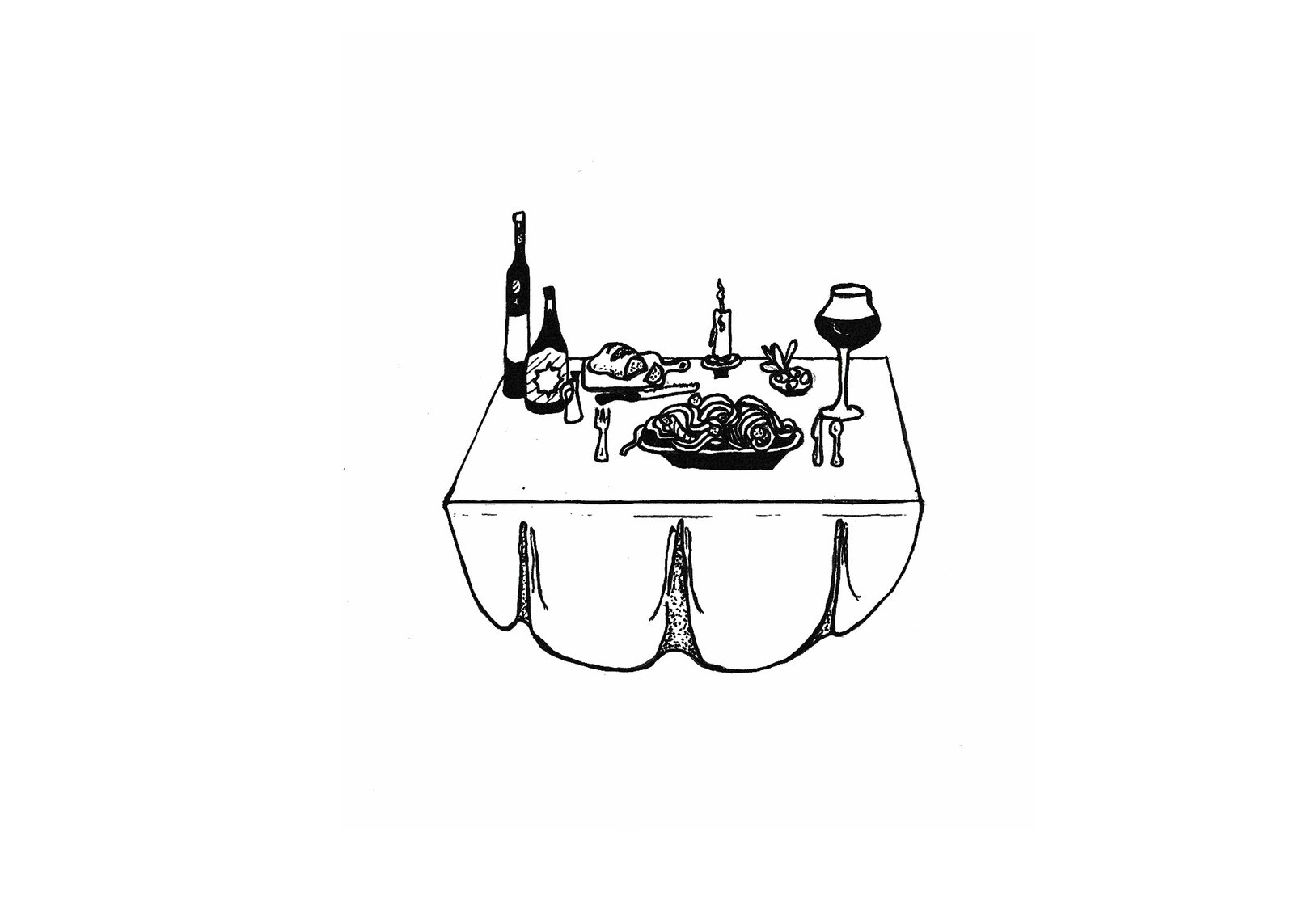
Over a plate of Puttanesca for her and a plate of Veal Bolognese for him, they would get to know each other further. During this time, Eliza Jane learned that Leopold was originally from Arizona, but since his wife had been from Massachusetts, he had moved here when they had gotten married. She learned that he had lost both of his parents when he was still a boy and had been raised by his grandparents. She shared that she too had tragically lost her parents when still very young. She had lived with her aunt until she went away to college and then had purchased her condominium after graduation with the trust fund that had been set up by the attorney who had handled her parents' estate. Other than her college and basic living expenses, she had not been able to access the money until she had turned 25. Now, with careful investment and frugality, Eliza Jane possessed a healthy nest egg. She continued to work in her library position and had very little need to touch her funds.

This routine had been going on for about four months—good food and conversation, with a glass or two of red wine thrown in, nothing less, nothing more, although Eliza Jane had secretly been hoping it would grow into something more. She had just been contemplating what could be, in a Brontë-esque sort of way, when Leopold made an announcement one evening.
"Eliza Jane, it has been lovely getting to know you, but alas, all good things must come to an end. I will be moving back to Arizona at the end of the month."
Eliza Jane paused, a fork twined with linguine dangling mid air. "What… Why? I thought we…" she didn't quite know what she was trying to say.
"Oh, it's not you… or us," Leopold was quick to say. "It's just that the lease I had on the apartment I shared with my wife is over this month."
"Won't your landlord let you extend it?" Eliza Jane asked. She had quickly lost her appetite and put her fork down on her plate. Her palms had begun to sweat.
"No, I am afraid not. Believe me, I have tried, but it seems as though she is determined to let the apartment to her daughter who has just returned from college."
"Well, there must be another rental option. I'm sure there has to be other apartments available. I can help you find one," she offered, almost pleadingly. She couldn't just let him give up on Salem… on her… on them!
"I have looked, Eliza Jane. I didn't want to upset you before now, but I have been looking this entire time. The rents are just more than I can afford on my own. When my wife was alive… well we shared the responsibility…" his voice trailed off, a note of sadness creeping in.
A sudden thought came to her and her face lit up, "I have an idea, Leopold. What if you moved into my condo with me?" Shocked by her own boldness, she quickly clarified, "I mean, as roommates, of course." After all, couldn't roommates fall in love?
"Eliza Jane, I don't know; I wouldn't want to take advantage..."
"I won't take no for an answer, Leopold." she replied, firmly.
"OK, if you insist, but I will also insist on paying my own way. We will share everything 50/50."
They smiled at each other across the small, candle-lit table. And this was how Eliza Jane and Leopold began living together. While she thought they knew quite a bit about each other, she didn't realize at the time that she didn't actually know Leopold at all.
It wasn't long into their platonic arrangement that the relationship grew necessarily into something more. Initially, they had kept to their own individual sides of the friend zone, bidding each other a good night, as they went to their own assigned bedrooms at the end of each day, but eventually, what Eliza Jane had hoped and imagined ventured into reality. The brushing of hands as they passed food across the dinner table, catching glimpses of each other scantily clothed—it all led to a night when it was mutually decided, with a long glance into each other's eyes to spend the evening in one bedroom.
Being Eliza Jane's first time at this type of intimacy, she was a bit disappointed in the discomfiture of her deflowering, but decided that the postcoital period following the act lived up to her Victorian expectations of romanticism, as she lay dreamily in her lover's sleeping arms and therefore, made up for any displeasure.
Eliza Jane believed that things could not be more perfect. Unfortunately, her state of bliss acted as a lens of disillusionment, blinding her to the subtle warning signs to which her intellectual side would have otherwise alarmed her. It was just little things at first. Leopold's efforts to charm her had begun to slip. She chalked it up to the domesticity that their relationship had settled into over time. She missed his constant little tokens of affection, but it was natural for the high energy of courtship to diminish once a couple had become comfortable with each other, wasn't it?
Initially, it was things like Leopold no longer rushing to open her car door, not bringing her a bouquet of Gerbera Daisies at the library once a week, or the fact that her walks in Greenlawn Cemetery were now pretty much solitary. Eventually, larger gestures fell by the wayside. They would still go to Bella Verona once a week, but now Eliza Jane had to pick up the check.
The first time this happened, she was taken by surprise. Leopold had excused himself to visit the rest room, but before he left the table he looked at her.
"Be a love and take care of the bill, while I'm gone, Eliza Jane." He glanced at the time on his phone. "I want to make it home in time for the Sox game."
"Ummm… OK," Eliza Jane responded, pulling out her wallet from her purse, a pink blush crawling up her face.
Having caught the exchange from across the space of the small restaurant, the waitress Reggie made her way over to the table, "Looks like the honeymoon is over," she said softly to Eliza Jane. She didn't want to magnify the woman's obvious embarrassment to the rest of the patrons, but wanted to offer her her sympathy.
"Huh?" Eliza Jane asked.
"I don't mean to stick my nose in, but he isn't the knight in shining armor he made himself out to be when you two first started coming here. I just think you deserve better," Reggie offered. What she didn't think there was a need to mention was that the jerk had dropped her a suggestive wink a few weeks back when Eliza Jane had been looking at the menu.
"Me? Oh no, Leopold is way out of my league. I am lucky he took notice of me," Eliza Jane protested.
Reggie shook her head in disbelief at Eliza Jane's lack of confidence in herself. "You are a gorgeous woman. You just have to have some faith in yourself. Don't let a jerk like that make you think any less of yourself."
"I am really not pretty. In fact I am kind of plain," Eliza Jane sighed. "Maybe that's the problem. Maybe he's grown tired of me, when he could be with any number of beautiful women. I'm sure they would be just lining up to be with him if he wasn't with me."
Reggie shook her head again, "Not that you should fix yourself up for any man, honey, but you just need to take some interest in yourself. Maybe get some contacts to accentuate your eyes. They really are a lovely shade, but they are hard to see behind those glasses. Maybe a touch of make-up. Nothing showy, just a light classy application. And you could try wearing your hair down instead of always having it up in a bun. Maybe try some highlights. Spruce up your wardrobe a bit. You probably have a pretty shape hidden under those baggy clothes. I bet you would be the one fending off a line of attractive men then."
As Leopold made his way back to the table, Eliza Jane was smiling. She was going to try some of Reggie's suggestions; it just wasn't for the self-respecting reason that Reggie had hoped her advice would inspire. Eliza Jane was determined to do it to make Leopold appreciate her again. Maybe if she made herself more attractive, he wouldn't leave her.
Eliza Jane's first attempt at following Reggie's suggestions was a flop. She had made an appointment with her ophthalmologist and even though she had feared that she might be too near-sighted to qualify for contact lenses, she was pleasantly surprised when her Doctor had ordered a box for her in the appropriate strength prescription.
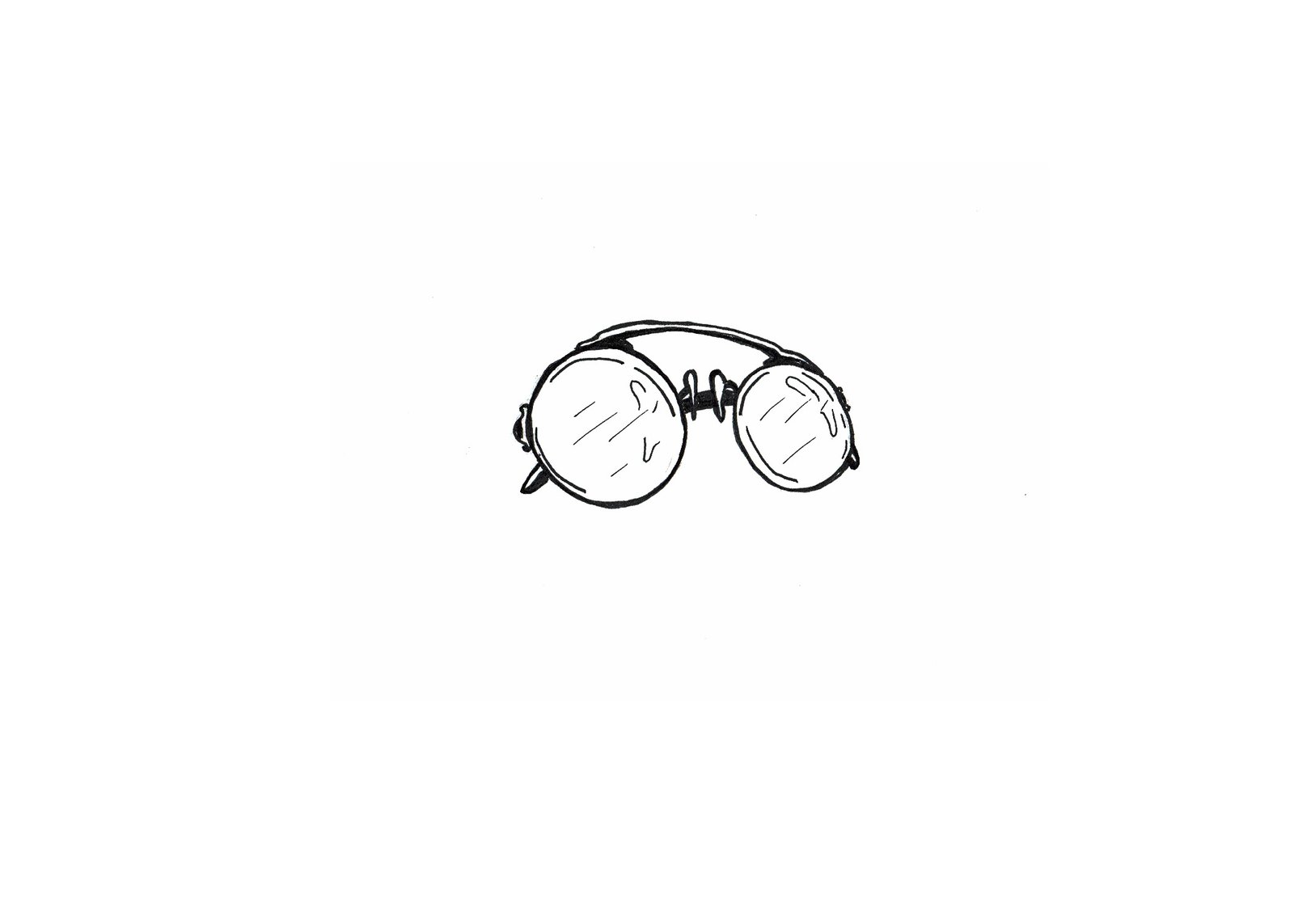
After retrieving her month's supply just a week later, she rushed home to put them in before Leopold returned. He left the house each day, she assumed to go to his job, and would not return until supper time.
Following a couple of failed attempts, Eliza Jane was able to successfully insert the contacts onto her eyes. This is certainly going to take some getting used to, she thought, blinking a few times. She looked into the mirror and gasped. She hadn't realized what a significant difference the loss of her glasses would make, but now that she was looking at the woman staring back at her, she was amazed. Her eyes were less a shade of hazel and more of a deep jade. She smiled at her reflection. Leopold was certainly going to be suitably impressed.
Rushing to the kitchen, Eliza Jane began preparing dinner. She finished up by creating a batch of chocolate chunk macadamia cookies that she had enhanced with her own secret ingredient of hand-scraped Madagascan vanilla bean. The nutty, melted chocolate aroma wafted off the freshly baked, still warm confections.
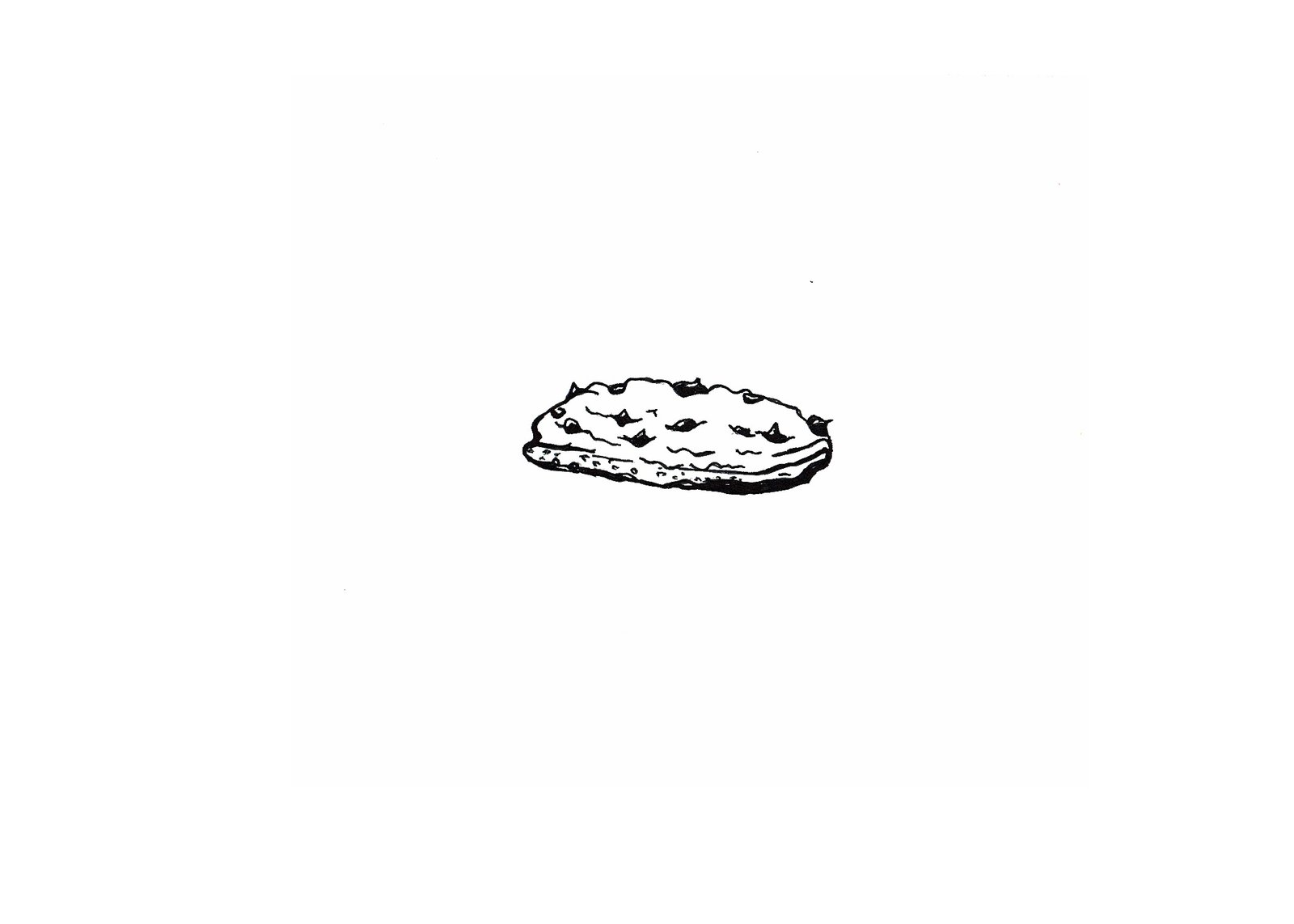
Eliza Jane was really quite an accomplished baker. She was no rookie at cooking either, but she really excelled at anything sweet, adding her own special touch to each masterpiece she created. She had frequently brought her treats to her co-workers at the library.
"Wow, Eliza Jane! You're wasting your talents at the library. You should open your own bakery!" they would tell her.
She would smile demurely at their compliments, but she knew she did not possess the confidence to own her own business. Just the thought of having to deal with the public every day on that kind of level gave her anxiety! She was satisfied with producing bakery quality confections for Leopold's pleasure alone.
She set the table. She had just plated the meal and lit a candle on the table when Leopold made his entrance.
""Mmmmm… smells delicious in here. What's for dinner?" he asked.
"Chicken Marsala with a surprise for dessert," she answered.
Leopold washed his hands before joining Eliza Jane at the small table. He picked up his fork and speared a piece of the wine-sauce drenched meat, bringing it to his mouth.
Eliza Jane waited. He looked up at her, chewing. She stared back, batting her eyelashes.
"What's wrong? Do you have something in your eye?" he asked, obtusely.
"No… don't you notice anything different?" she asked, again waiting.
He squinted at her from across the table, another forkful of food paused in mid-travel to his mouth. "No… am I supposed to?" he asked in return. "Oh, wait…"
She raised her eyebrows and smiled expectantly. "Yes?"
"You finally put a new battery in the clock," he replied.
Eliza Jane turned her head to look at the wall clock behind her. She had indeed put a new battery in it before bed the previous night. She sighed. "Yes… but I meant my eyes. I'm not wearing my glasses anymore. I bought contacts. Didn't you notice?"
He looked at her again, surprised. "Oh, yeah. Why did you do that? I liked your glasses. They gave you an intellectual look, you know?"
Crestfallen, she lied, "I'm sorry, but they broke."
He shrugged "Oh well," and continued eating his meal. "What's for dessert?" he asked between mouthfuls.
Well I am either persistent or a glutton for punishment, Eliza Jane concluded the next day, after having had some time to think over Leopold's reaction, or lack thereof, to her attempt at physical improvement. She was not going to give up. She was currently walking, albeit alone, in Greenlawn Cemetery, deep in thought.
Her train of thought was broken as she passed by the grave of Leopold's dead wife. A chill ran down her spine as she looked at the headstone. It was just so sad, and if she were to be honest, just a tad bit creepy too, knowing that a woman in the height of life, a woman who had also loved Leopold, had just passed away from… Eliza Jane paused. She just realized that she didn't even know what had caused her death.
She stared at the grave, considering what could have taken her at such a young age. She wondered what she had been like- what she had looked like. Leopold had never shown her a picture, but she bet that Laura had been beautiful and that she, Eliza Jane, would have paled in comparison. No wonder his attention had diminished. Well, if nothing else, with these dark thoughts, Eliza Jane's determination only grew.
She subconsciously ran her hand over her neat, tight bun on top of her head. Tomorrow was their date night at Bella Verona and Eliza Jane was going to make him stand up and take notice.
On Friday night, Eliza Jane made arrangements to arrive at Bella Verona early to meet Leopold at the restaurant. She wanted to already be at their table when he arrived. She had taken an extended break from the library earlier that day for a hair appointment.
He had questioned her about why they were not just driving together as they always had, but she had provided a vague excuse about needing to be at an appointment downtown right before, so it would just be easier to take separate cars. It wasn't a lie. Her new hairdresser was only a few blocks from Bella Verona.
Reggie, the waitress, was clearly impressed. "Wow, you took my advice. You look amazing!" she said. "Has your boyfriend seen the new you yet?"
Eliza Jane smiled, delighted with the waitress' reaction, as she was seated at their usual table. "No… well he did see my new contacts, but he hasn't seen my new hairstyle yet. That's why I got here first. I want to surprise him."
"Surprise him? You're going to knock him off his feet!" Reggie proclaimed, as she assessed Eliza Jane.
Her auburn hair hung down past her shoulders in a stylish flow. Golden highlights caught in the overhead lighting that hung from the old tin ceiling, shown in strategically placed sections, framing her deep green eyes.
"I wouldn't even have recognized you if we had passed each other outside of here," Reggie continued, shaking her head in disbelief.
Eliza Jane blushed in gratitude at Reggie's compliments. If her reaction was any indication, Leopold would also be duly impressed.
She didn't have a long wait to find out, because Eliza Jane saw him walk past the windows on the front sidewalk, just as Reggie had departed the table to get their bread and olive tapenade from the kitchen. She looked down at the menu, even though she always got the same dish, trying to act casual as he walked into the restaurant.
Leopold walked over to their table and sat down. She glanced up, but instead of the appreciation she expected to see on his countenance, she saw a frown.
"What did you do to your hair, Eliza Jane?" he asked, obviously not pleased.
"I had it styled and highlighted," she replied. "Don't you like it?" she asked in return.
"I prefer your usual style," he answered. "This is… well, it's just too flashy," he stated flatly.
Reggie, who had just returned with their bread, caught the conversation and saw Eliza Jane's shoulder's slump in defeat. She couldn't refrain from coming to her defense. "Flashy? If you think that's flashy, you should see my cousin Ginny's red hair. Now that's flashy!" she interjected. "Eliza Jane's hair… that's classy. Big difference."
Leopold shrugged. "To each his own, I guess," he smiled tightly.
Reggie paused, deciding if she wanted to chew this jerk out, but she could see that Eliza Jane was clearly embarrassed, averting her eyes, so she refrained from dishing out a verbal beat-down and changed the subject instead, "Would you two like a few more minutes, or should I put in your usual orders?"
"The usual will be fine, Reggie. Thank you," Leopold said dismissive.
Eliza Jane waited until Reggie had walked away, before looking up at Leopold. She watched as he nonchalantly spread a spoonful of tapenade on a piece of bread. He took his time biting a chunk off and chewing it slowly, before giving her his attention.
"Eliza Jane, I do not know why you persist in changing your appearance," he said to her in a tone, as if he were addressing a willful child. "I am perfectly pleased with how you originally looked when we met, so unless you are trying to attract the attention of some other suitor… ?"
"Oh no, Leopold!" she quickly responded. "It's just that, well, I know your wife must have been so beautiful, and I know I don't compare, but I am just trying to please you. You just seem so distant lately."
"It's true that Julie was a beautiful woman," he began,"but she was perfectly content to maintain her appearance in such a manner that pleased me."
Eliza Jane had to contemplate what Leopold had just said for two reasons. Yes, there was the narcissism of the reply itself, but there was also something else that bothered her.
"Who?" Eliza Jane finally asked.
"What do you mean who?" Leopold asked, confused by her question.
"Who is Julie?"
"My wife, Eliza Jane," he answered with an edge to his voice, as if she were being deliberately insensitive.
"Laura," she replied, "You told me your wife's name was Laura. You said, and I quote, 'Laura, such an ordinary name for a woman who was anything but.' ."
"That's ridiculous, Eliza Jane. I think I know my own wife's name without you correcting me," he said to her, as if she was being daft.
At that point, Reggie had returned with their meal and placed the plates in front of them. The tension was palatable, so she left them to their food.
Leopold picked up his fork and with one final glare, began to eat, giving Eliza Jane the impression that he was not going to entertain what he wanted her to believe was her foolishness.
They finished their meal in silence. As they had arrived in separate cars, Leopold stood up and left before the check was even brought to their table.
"I will see you at home, Eliza Jane," he said tersely, and departed.
Reggie brushed past him as he was walking out the door. "You deserve way better than that jerk," she told Eliza Jane, setting the check in front of her.
Eliza Jane blushed once more. She took out her wallet and paid the bill, feeling compelled to leave an extra generous tip for Reggie that evening.
As she walked out the front door, Eliza Jane got a creepy sense that someone was watching her. She quickly looked down the sidewalk behind her and saw a woman with dark hair dart behind the corner of the restaurant.
That was peculiar, she thought, but then again, the whole evening had pretty much been made up of peculiar incidents. What difference did one more make?
Eliza Jane was sitting on a sparsely grassed plot of ground, reading her favorite Brontë novel. The sun was shining and she was enjoying the day, reclining on a large stone behind her. All of a sudden, dark clouds swept in, obscuring the sun. She shaded her eyes with her hand and looked into the sky. The day had become threatening and she was sure a storm was fast approaching. To confirm this, the sound of thunder rolled not-so-distantly. A single, but large, drop of rain plopped on her upturned face.
She decided it was time to go, before she got caught in the oncoming deluge.
She had just closed the book and had tucked it under her arm, so that she could use her hands to help push herself up off the ground, when she felt something snag on her right wrist. She looked down expecting that she had caught her hand on a root or something similar. What she actually saw horrified her. A dirt-covered disembodied hand with broken and torn fingernails was reaching out of the ground and had her wrist locked in its grasp.
A blood curdling scream rose from her chest and spilled out of her gaping mouth, as she tried in vain to pull free from this horror movie cliche. As if that hand was not terrifying in itself, Eliza Jane realized that the more she tugged, the more of the appendage was emerging. The surfaced hand now had an arm and an elbow cleared from the dirt. Eliza Jane did not want to see whatever undead creature was about to surface from below the depths of the earth, but she couldn't refute the instinct to keep trying to pull free. Just as she felt she was going to snap and lose her mind, she lost whatever footing she had gained and fell back onto the ground, hitting her head on the rock she had been relaxing against. Dizzy and convinced she had lost the fight for her life, she looked up at the stone and saw the epitaph "Beloved" staring down on her and it was tipping; it was going to crush her.

Eliza Jane sat up in a rush. She was breathing hard, almost hyperventilating. Her body felt chilled, but there was a film of perspiration covering her. She looked around and seeing the tiny lilac flowers of her Victorian patterned sheets, she realized that she was safely in her bed and had experienced nothing more life-threatening than a nightmare—a very realistic one, but a nightmare nonetheless.
That evening, Eliza Jane had slept in her bed alone. Leopold had decided to sleep in the guest bedroom, probably as a way to punish Eliza Jane for daring to improve herself. She was actually glad for it now, because she felt rather foolish.
She pushed back the bed covers and slid out of bed. She knew she wouldn't be able to get back to sleep at this point, so she decided to make herself a cup of chamomile tea and read for a while—just maybe not Charlotte Brontë.
Padding into her living room on slippered feet, she saw Leopold's face bathed in the eerie blue light of her computer's screen in the otherwise pitch black room. She wasn't sure what he was doing up so late; maybe he couldn't sleep as a result of thinking about their fight either. Whatever the reason, something about the look of consternation on his face prevented her from announcing her presence. She turned and walked just as quietly back to her bed, where she lay sleepless thinking the rest of the night.

The next day, when she had arisen, Leopold was already gone. This in itself was not unusual. He frequently took a walk to grab a coffee early in the morning. Eliza Jane went to her laptop and flipped the cover open. As soon as the screen came to life, she immediately went to her browser's history. For some reason, she wasn't surprised to see that the cache had been cleared but as a seasoned librarian, she knew how to get around this minor challenge. With a few clicks she had pulled up a drop down of the computer's most recent Google searches.
As Eliza Jane's eye scanned through Leopold's searches from the previous night a feeling of dread fell over her and she felt the hairs on the back of her neck stand up.
Eliza Jane read through the titles of the sites Leopold had pulled up: Massachusetts' State Law on Obtaining Life Insurance on a Domestic Partner, Causes of Death that Prevent Beneficiary Collection on Life Insurance, State Regulations on Documentation Required for Life Insurance, Does an Individual have the Legal right to Know a Life Insurance Policy has Been Applied for in their Name?
She couldn't believe what she was reading. She closed down her computer and shut down the screen. She gave some thought to what she had just read. What reason could Leopold have for his searches? Giving him the benefit of the doubt, she considered that maybe he was just being astute and was looking towards the financial responsibilities of their future. But another tiny voice crept into this thought, a voice of reason, if his reasons were not nefarious, why was he conducting his research in the dead of night and without my knowledge?

Eliza Jane had managed to push her suspicions aside for the moment and was at the library a bit later. She was busy in the stacks putting back some returned books, when a woman with a wide brimmed hat came down the same aisle. Eliza Jane looked over at the woman and found something oddly familiar about her, but before she could get a better look, the woman, realizing she had been seen, about-faced and ducked around the corner. That was enough of a reminder for Eliza Jane to recall where she had seen this woman before, because on her previous run-in, she had acted in exactly the same fashion; she was the same woman who had scurried around the corner of Bella Verona when she realized she had been sighted by Eliza Jane outside the restaurant the previous evening.
Quickly running down the aisle, Eliza Jane followed after the woman. As she exited the stacks, she caught a glimpse of her as she was making her way down the winding staircase. The quiet rule in the library was so deeply ingrained in Eliza Jane that she did not dare to shout after her, but continued to follow her. The woman took occasional glances behind her to see if Eliza Jane was still in pursuit and picked up her pace when this was confirmed.
The woman had come off the stairs on the main floor lobby and looked like she was going to make it out the front door before Eliza Jane could reach her, when providence stepped in the way. A woman with a large double stroller was awkwardly attempting to wheel her children into the library and was blocking the woman's exit. The woman's head turned to the right, probably considering if the exit through the children's room would allow her a more expedient escape; however, her momentary hesitancy thwarted this plan, as by this time Eliza Jane caught up to her.
"Wait!" Eliza Jane said in her loudest whisper voice. "I want to speak with you."
The woman's eyes darted around, still searching for a way out, but when Eliza Jane gently laid her hand on her arm and asked imploringly, "Please?"
With a sigh, the woman relented,"OK, but not here. Can we meet somewhere?"
"I can't take a break just yet, but I can at 1 pm."
"OK," she replied again. "Joli Tea downtown?"
"Yes…" Eliza Jane began, "but how do I know you will show up?"
"Oh, I'll show up alright," the woman replied, "You'll just wish I hadn't." Then she pulled her arm away, not unkindly, from Eliza Jane's grasp and hurried out the door.
At exactly 1 pm Eliza Jane walked into Joli Tea and scanned the tables, her eyes passing over what appeared to be an unusual assortment of birdwatchers, identified by the binoculars hanging from their necks, drinking tea. Her heart sank as she realized that the woman had not kept her promise, but then as she looked to the right of the cafe, she saw her sitting in a private tea room, giving her a little wave. Relieved, Eliza Jane made her way over.
"Have a seat," the woman offered. "I hope you don't mind, but I already ordered. You have to request High Tea service to secure the private room."
Eliza Jane looked at the table set with two small teapots, two fine china cups, and a tiered tray of mini pastries and tea sandwiches. She took the chair across from the woman, who she saw still wore her wide brimmed hat, along with a large pair of dark glasses.
Eliza Jane extended her hand carefully between the labyrinth of sweets and teas and said, "Thank you for agreeing to speak with me. My name is… ."
"I know who you are," the woman interrupted. "You're Eliza Jane—the unfortunate paramour of ahem…" she cleared her throat, "Leopold", she spat out.
Eliza Jane blanched, "Yes, that is correct… that is to say, I am Eliza Jane, however, I am not sure about the unfortunate part."
"Oh, you will be when I am finished," the woman supplied, cryptically.
"Well you have the benefit of knowing my name and yours is… ?"
"You can call me Rose," the woman stated, with intentional continued vagueness.
"OK, Rose," Eliza Jane began, as she poured herself a cup from the teapot at her setting, "Who are you and why are you following me? More importantly, how do you know Leopold?"
"I do not know Leopold," Rose responded. "I know Vincent. Have a lemon basil scone. They are quite good with a spoonful of the strawberry preserves."
Eliza Jane rolled her eyes, but took a scoop of the preserves with her miniature spoon and spread it on a scone. Taking a small bite, she smiled, "Delightful," she said after swallowing what was in her mouth, "But I can do better. "The trick is to use a smidgen of fresh grated fennel to bring out the lemon and basil's full potential."
Rose stared at her for a moment, before continuing, "I have been following you these past few months, my dear, contemplating whether or not I should share my knowledge with you."
"What knowledge would that be?" Eliza Jane asked, curious.
"Oh nothing much," Rose replied coyly, "Just that your BF is a diabolical killer. Well, at least he would be, if he was any good at it."
Eliza Jane choked on the sip of vanilla Rooibos tea she had just sipped. Composing herself, she laughed nervously, "What could you possibly be referring to? You are obviously as mad as a hatter."
Rose raised her eyebrows slightly. "Do you even know the origins of that term?" she asked.
"I am a librarian. What do you think?" Eliza Jane countered.
"Well, let's see you demonstrate your skill then," Rose proffered, sitting back in her chair, arms folded.
"Although most people would associate this phrase with the mad hatter character from Alice in Wonderland's Adventures, the line did not originate with Lewis Carroll, but actually started as a result of the mercury that was applied in preserving the fur used in the manufacturing of hats in the late 18th and early 19th centuries, causing the workers engaged in the process daily to develop mental health ailments," Eliza Jane had provided, with a smug smile.
"Well done. You are obviously intellectually astute," complimented Rose. "But emotionally as obtuse as a rock," she finished.
Eliza Jane gasped. "How dare you?" she demanded.
"Well, you see, it's rather simple. You refuse to see what is right before your eyes, because you are blinded by infatuation."
"And exactly what is it I refuse to see?" asked Eliza Jane.
"Let me answer that with a series of questions," Rose stated. "Are you game?"
"Be my guest," returned Eliza Jane, with a turn of her hand.
"Did you connect with Vincent…," she stopped at the look of consternation on Eliza Jane's face, "I'm sorry, did you connect with Leopold at the grave of his dearly departed wife?"
"Yes, but I don't see…"
Rose held up her hand to stop her. "And have you moved Leopold into your abode based on his sob story of how his lease was ending and he had no choice but to move back to wherever he came from?"
Eliza Jane slowly nodded.
"Has Leopold gradually withdrawn his affection?"
Tears had begun to form in the corners of Eliza Jane's eyes. Rose took this as her acknowledgement and continued.
"Have you caught Leopold engaged in suspicious activity, such as investigating life insurance policy regulations?"
Eliza Jane sat mute. She remembered how she had found Leopold washed in the eerie glow of her laptop last night.
"Has Leopold voiced his displeasure at the physical improvements that you have obviously made to your appearance?"
At this point, an uncooperative tear actually slipped out of Eliza Jane's eye and rolled down her cheek. But Rose did not allow that to stop her.
"Have you caught Leopold using a different name for his dearly departed wife than the one you know he originally provided? And if so, did he make you feel like it was you who was being stupid, not him?"
Rose reached across the table and gently took her hand, "I am sorry to be the one to tell you this, my dear, but Leopold or Vincent, or whoever else he has called himself to the many women he has done this to, is nothing more than a grifter with malicious intent."
Eliza Jane yanked her hand back. "I don't believe you," she protested.
"I see that you don't want to, but I think you are smart enough to put two and two together. I know all of these things about this man, because he has done the same thing to me, as well as to at least ten other women. His real name, given at birth, is Eugene Whitmore—I've done my research."
"OK, if there is a trail of dead women, why haven't the police caught him yet?"
"Oh, I never said any of them ended up dead, but not for lack of trying. He has attempted electrocuting one in the bathtub, pushing another off a cliff, cutting the brakes on one's vehicle, and my personal favorite, albeit because it happened to me… setting the house on fire after putting a sedative in my tea before bed. Fortunately, he has never been successful at any of his attempts, the dumb clod, but one of these times, he is going to blindly stumble upon accomplishing his task and I am determined to stop him- by any means necessary."
Eliza Jane sat staring blankly at the woman across from her. "You said he has never succeeded in killing any of his… his paramours. Well, what about his dead wife? I've seen her grave," she stated. "Isn't that proof?" Suddenly Eliza Jane realized what she had said. Was she trying to prove Leopold's innocence or put the cliched nail in his coffin?
Rose let out a harsh laugh. "Oh poor naive Eliza Jane! There is no dead body under that headstone. He has done his own investigation. He knows that your parents both passed away tragically when you were young. He knows what would pluck at your heart strings. He knows your fondness for old world romanticism. That grave is merely a prop in convincing you of his sad story. And it obviously worked!"
Eliza Jane turned a shade whiter than her usual pale visage. She pushed her chair back and stood on unsteady feet.
"I have to get back to work. I have no more time for this nonsense." she stated and without another word turned to leave.
"Wait!" Rose pleaded. She grabbed her arm, much the same as Eliza Jane had grabbed her own back at the library. "I know you are not ready to believe the truth, but once you are, call me. I will be there to help. By any means necessary."
Eliza Jane looked down at the calling card that the other woman had placed in her hand. She slipped it into her pocket, meaning to throw it away as soon as she left. She turned and exited the tea shop, not looking back.
That night, after a quiet supper with Leopold, Eliza Jane went straight to bed, feigning a migraine. She lay listening to every little sound in the old building from the creak of floor boards to the drip of the faucet in the bathroom sink to the clang of the radiator pipes. She did not get a wink of sleep the whole night.
The next morning, after Leopold left the house, Eliza Jane called the library to inform them that for the first time in the ten years she had worked there she was taking a sick day. She then made herself a cup of tea, before dressing and heading out the door.
She drove the few miles to Greenlawn Cemetery, where she parked her car just inside the main gates. Taking a deep breath, she stepped out of her car and began the short walk to the grave site that by now was so familiar to her.
A low hanging morning fog shrouded the grounds of the cemetery, preventing Eliza Jane from seeing even the smallest distance in front of her. The heels of her sensible shoes seemed to echo extra loud as she made her way down the path. She had the premonition that at any moment she would run into Leopold wondering why she was there and not at work.
After a few minutes, yet what seemed an eternity, Eliza Jane found herself standing at the headstone proclaiming that Beloved resided below. She looked down at the plot observing the thick carpet of grass that had grown there since she had first met Leopold sobbing on the sparse stalks of green just recently poking up from the newly planted ground. She didn't know what she was going to find there or even what she was looking for, so with a sigh, she turned after a few moments and headed back to her car.
"Eliza Jane, Eliza Jane!"
She froze, sure she had heard her name called. She looked around for the source of the call, but only saw a Raven once more sitting on a nearby grave stone.
It turned its beady eye on her. "Creeaww! Creeaww!" it croaked.
Letting out a sigh of relief this time, Eliza Jane continued on her way out of the cemetery. She was about to get in her car, when the small office building just inside the entrance caught her eye. She knew this to be the grounds maintenance keeper's office. Making a decision, she shrugged her shoulders as if to say why not? And headed to the door of the stout building.
Grasping the handle, Eliza Jane pushed the heavy oak door inward and stepped into the tiny room. Sitting behind a desk was a man she had seen throughout the cemetery on a number of occasions: directing the equipment operator digging a new grave, checking the health of one of the many trees the grounds boasted, or perhaps driving a ride-on lawn mower across the meticulously manicured lawns. She had never known his name, but a small placard proclaimed that this was Donald Myers, Head Groundskeeper.
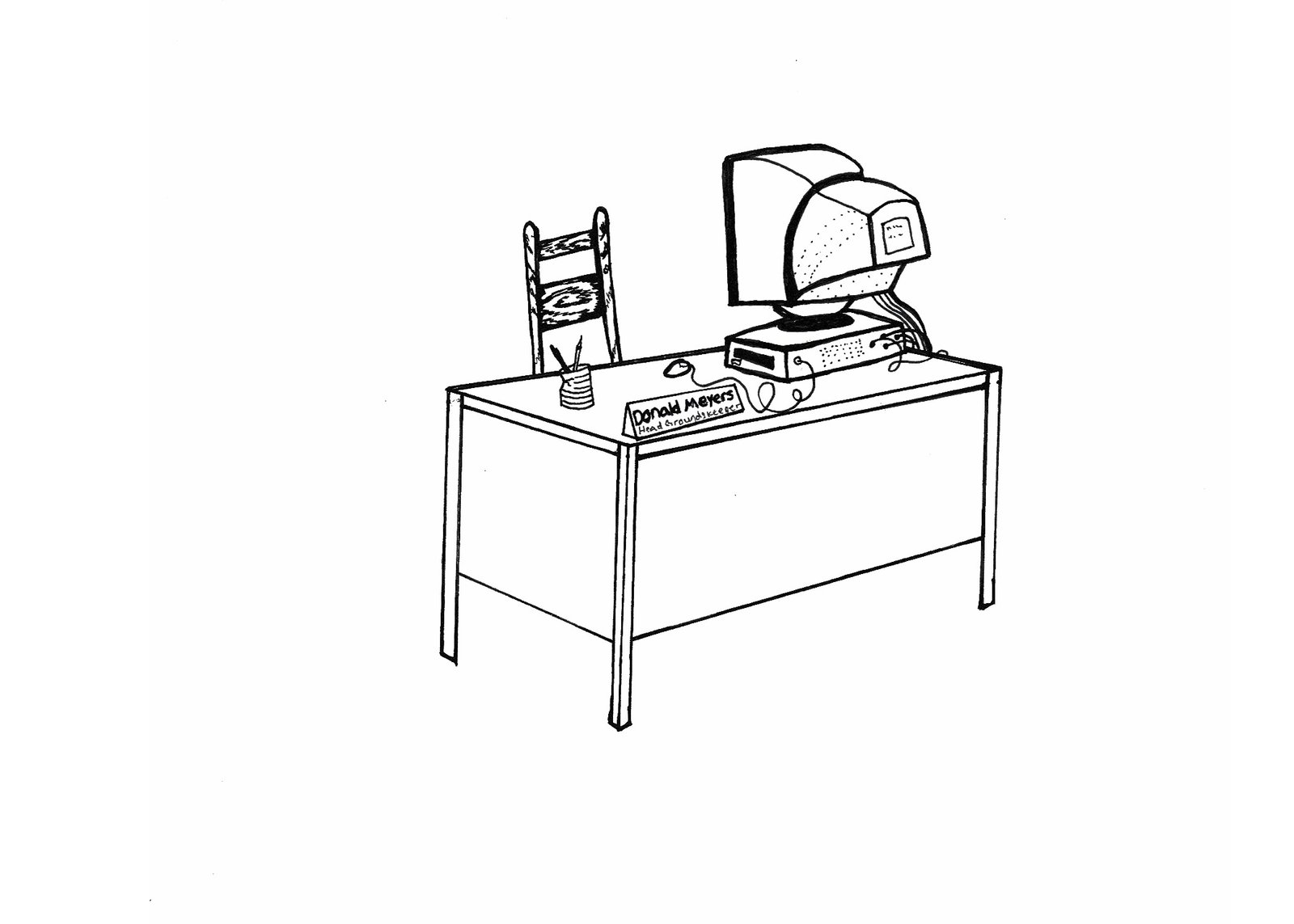
Clearing her throat to gain the man's attention, which was currently focused on what looked to be a map of the cemetery's squirrel nests, Eliza Jane said, "Hello. Mr. Myers? I was wondering if I could ask you a strange question?"
Donald Myers looked up, not startled by Eliza Jane's presence in the least. "Hello. I'd be very surprised if you could produce a question any stranger than any I have thus far heard in my almost 40 years on this job, but go right ahead and try," he smiled.
"Well, you see, I was wondering, if you could tell me, if it's not confidential that is, who is buried in one of the plots here?" she stuttered.
Donald chuckled, "There is nothing confidential within these grounds young lady. Now to which grave are you referring?"
Eliza Jane described the gravestone with the Beloved epitaph. "I can show you where it is located if that would help?" she offered.
"No need, no need. I wouldn't be worth my salt as head groundskeeper if I couldn't identify any marker within this cemetery. So yes, I am familiar with the grave. Owned by a young man who purchased it a while back. Nowadays we only allot space to Salem's deceased, as we are running out of usable land. The wait list is really long; people are just dying to get in here!" he laughed at his own corny humor, but getting no similar reaction from Eliza Jane he cleared his throat and continued. "Back when the grave was purchased, any one from out of town could buy a piece of the real estate too."
"Could you tell me who is buried there?" Eliza Jane asked, dreading the answer before it was given.
"Buried there? Why, no one. The young man said that he was purchasing it at the bequest of his elderly mother who would like to be buried here some day. I must say, the old gal must be doing quite well; it's been about ten years since he acquired the plot!"
Eliza Jane stood dumbfounded. "No one? But the grass was just growing in when I first saw the site earlier this year."
"Well, the young man is a bit of an eccentric. You see, every year he has raked up the dirt and re-planted fresh seed. No law states that he can't do that, so I have never questioned him. Just figured he wanted it to look especially spiffy for mom when the final day arrived."
Eliza Jane was about to turn and leave when she thought of another question, "Do you think you can tell me the man's name who owns the plot?"
"Sure can do. As I already said, nothing is confidential here."
Donald opened an archaic-looking file cabinet behind his desk and quickly fingered through tightly crammed files, before settling on one that he pulled out with a flourish. He opened it and scanned down the contents, before announcing, "Here it is."
"Well who is it?" Eliza Jane cried, forgetting her manners in her impatience.
"It is one Mr. Whitmore," Donald stated, "Eugene Whitmore."
Eliza Jane did not want to accept what she had learned. There had to be some logical reason for Leopold's behavior. Some tragedy in his past. Maybe something similar to what had befallen Heathcliff of Wuthering Heights. A sad, yet romantic tale.
She had decided that she needed to walk to clear her mind and do some thinking, but away from Greenlawn Cemetery. She drove back downtown where she parked her car and walked the cobble stoned streets, vaguely looking in shop windows as she passed. It was engaged in this activity that she came to a storefront with a beautiful sapphire blue dress displayed on a mannequin in the window. It was then that she decided what she would do.
Going into the shop, Eliza Jane selected the same dress in her size from the rack and after making the purchase, quickly made her way home. She had one final stop at a small gourmet grocer located on the corner of her street, before returning to her condo.
Eliza Jane spent the remainder of her day concocting a brilliant dinner of cornish hens, with roasted sunchokes, and garlic mashed potatoes. For the pièce de résistance she worked on creating an amazing salted pear and bourbon tarte tatin. As she tasted the glaze as it simmered on her stove top, she shook her head, not quite satisfied. Opening her fridge, she removed a mesh bag and removed a small sprig of her secret ingredient, a little treasure she had plucked on her way home. All of her baked creations excelled due to her clever additions.
Using her marble pestle and mortar, she crushed the dried flower and leaves into a fine ground powder, pouring it into her pot. She gave it a thorough stir. Pausing for a moment, she considered her glaze once more. She took another larger sprig from the bag, once again grinding it before stirring it into the glaze. She smiled down at the fragrant, orange syrup. Now she was pleased.

Stepping out of the shower, Eliza Jane towel dried her hair, before stepping into her new blue dress. The silky fabric hugged the curves she never realized she had, as if it had been made specifically for her. An extravagant purchase, but one well worth the expense, she decided. She took a hair dryer to her auburn locks, using her rounded brush to bring out the most curl, as the stylist had shown her. She then put in her contacts, before carefully applying some mascara, eye shadow, and eyeliner. She had watched a YouTube video five times in order to get the hang of the process. Finally she applied a pale shade of blush lip gloss. Stepping back, she assessed her appearance in her mirror. Slowly, a smile spread over her countenance, lighting up her heart-shaped face. Finally she realized what Reggie, the waitress, had been trying to tell her—this was for herself, not anyone else.
Eliza Jane heard the click of her front door. Leopold was home. She went out to greet him.
Seeing her appearance as she stepped out of her bedroom, a deep frown creased Leopold's face.
"Like my new dress?" Eliza Jane asked sweetly, twirling for maximum effect.
Leopold shook his head, still scowling. "It doesn't look like my opinion matters to you, Eliza Jane," he stated sourly, "Otherwise, you wouldn't be suddenly acting like a floozy."
Eliza Jane put a childish pout on her face and giggled, as if he were teasing. "Come sit down, Leopold and stop being mean. I made us a lovely supper to celebrate."
"Celebrate what?" he asked, churlishly.
"Why, our six-month anniversary, silly." she pouted once more, pretending to be hurt by his lapse of memory.
Leopold grunted and sat at the table, while Eliza Jane served up the meal. Not even waiting for her to be seated, he dug his fork into the mashed potatoes, cramming them into his mouth, not pausing to swallow, before shoving in a piece of Cornish hen.
Eliza Jane looked at him, honestly perplexed. What had happened to the charming young man who wrote beautiful poetry, who she first met? Suddenly Rose's words came back to her. You refuse to see what is right before your eyes, because you are blinded by infatuation. She now recalled Leopold's lines of poetry.
To take into the air my quiet breath;
Now more than ever seems it rich to die,
To cease upon the midnight with no pain
They were indeed beautiful, but as she remembered, also familiar. That is, she now realized, because they were the words from Ode to a Nightingale, written by the famous poet, John Keats—a fact any astute librarian should have immediately recognized! A fact she would have recognized if she had not been so caught up in her obsessive infatuation! Her cheeks reddened, even though she had not applied any blush; she was ashamed at her naivete. It was the final straw; her blinders were lifted.
Eliza Jane stood. "Well it looks like you enjoyed my cooking! Let's see if my baking makes as much of an impression!" Eliza Jane cleared Leopold's empty plate and her own hardly touched one from the table to make way for dessert. With a flourish, she produced the glass tart dish. "Salted pear and bourbon tarte tatin!" she announced, as she lay the dish before him. "But don't eat too much. I wouldn't want the bourbon making you lethargic," she winked.
"Don't worry. I can hold my liquor," he replied, surly, scooping into the tart with the pie server she had provided. He placed a heaping helping on his dessert plate, once again before Eliza Jane had even taken her seat.
He was just about to shove a large forkful in his own pie hole, when Eliza Jane shouted, "Stop!"
Leopold paused, looking at her expectantly, "What? Did you want to apologize for your selfish stubbornness at ignoring my request that you refrain from defiling your appearance, Eliza Jane?" he asked, sneeringingly.
Eliza Jane's face fell, but she quickly recovered with a disarming smile, "No love, I just forgot the whip cream. But no matter. I believe that you will find it just as near to perfection without the added sweetness—a finale like no other."
Leopold paused for one brief second more, before letting the forkful of tart follow the same path as the Cornish hen previous to it. Four consecutive forkfuls followed. On the fifth trip to his mouth, the fork, laden with glazed tart, stopped, frozen in mid air. His chin dropped even further and he looked at Eliza Jane. He tried to swallow what was still in his mouth, but a sudden restriction in his throat wouldn't allow it. He coughed and a large lump of semi-chewed up tart fell back to his plate.
"What is in the tart, Eliza Jane? What did you do?" he spluttered.
"Oh, you like it, Leopold! I'm so glad!" she gushed. "It must be my secret ingredient that has you so, pardon the pun, choked up. I didn't imagine it would take effect so quickly!"
"What is it, woman! He yelled, struggling to get a breath, as he stumbled up from his chair.
"Oh nothing much, love," she declared. Just a tad of Hemlock. Well actually, judging by your reaction, maybe more than a tad. I saw it on my walk this afternoon in a little vacant field and just couldn't resist bringing it home."
He suddenly lurched at Eliza Jane, but she spritely stepped back from his reach, as he crashed onto the table top, knocking the dishes and wine glasses to the floor. The deep crimson color from the Merlot spread its stain on the white table cloth.
"You bitch!" he yelled. "Why have you done this to me?"
"Well it's simple," she replied. "Your prey has become your predator," she explained. "You will not ever victimize another woman again, Eugene."
Leopold balanced, hunched over on the table for a moment more, before becoming overwhelmed with holding up his weight. Pulling the tablecloth with him, he fell sideways to the floor with a loud thump, gurgling pathetically, until his death rattle became silent. The white tablecloth with the deep red stains draped over his shoulders like some grotesque superhero's cape. Eliza Jane prayed that her downstairs neighbors were not home to hear the commotion.
She stepped cautiously around the table, looking at his prone form on the floor. She pulled back her foot and gave him a solid kick for good measure. He didn't stir. She pondered her next steps for a moment before stepping over his body and reaching for her coat, which hung from the wrought iron Victorian coat stand next to her entry door. She slipped her hand into the pocket and, not finding what she was searching for, had a brief moment of panic, before she located it in the opposite pocket. She pulled out the small calling card and picking up her handset phone off its charger, called Rose.
"Hello. It's Eliza Jane. I need you," she said simply, when the call was answered on the third, painstakingly long ring.
Rose replied with one word, before disconnecting the call, "OK."
Eliza Jane stared at the phone that was now just sounding a dial tone. What did that mean? Did Rose know where she lived? Eliza Jane had always been a planner—nothing spontaneous about her. But this… this had been pure impulsivity and now she was at a loss as to what to do next. She knew she couldn't wait to find out if Rose would show up, so she decided the best course of action was to address Leopold's body. She couldn't bear to see it lying there so still. She decided she would roll him up in the pink, also Victorian, rug that covered much of her living room floor.
Once more, she crossed over Leopold's lifeless form intent on her newly decided mission, when her dress snagged on something. Turning back to look, she was horrified at what she saw. With a wicked grin on his now conscious and still alive face, Leopold had the hem of her dress in his grasp. In a fright, Eliza Jane went to pull her dress free only to have her move countered when Leopold's free hand shot out, grabbing her ankle and pulling her feet out from under her. She toppled with a scream, all of the air leaving her body as she crashed to the hardwood floor. Still in shock from what was happening, she kicked her legs in a panic, trying futilely to escape her captor.
Eliza Jane looked at Leopold again. He had blood trickling down his chin from the corner of his mouth, but was still grinning. He was using her leg to pull himself closer to her. He wasn't saying anything to her, but he was making a gurgling sound in his throat as he slowly pulled his way up her body. What was his intention? Was he going to attempt to strangle her? Eliza Jane could feel her pulse racing and her heart beat felt as though it was going to explode out of her chest. Her mind scrambled to remember the details she had researched on Hemlock poisoning. She recalled that the information she read had revealed that symptoms could overcome the victim within as short a time as 20 minutes or as long as three hours. How long had it been? Maybe 20 minutes? Could she out survive him? Certainly not by three hours.
A sudden gleam of shiny metal caught Eliza Jane's eye, making her blood run cold. Leopold had something now clutched in the hand that had previously held onto her dress. She recognized it instantly; it was the bread knife that had formerly been on the table. It had most likely fallen to the floor when the table cloth was pulled down during Leopold's collapse.
Eliza Jane redoubled her efforts, but to no avail. Leopold managed to dodge each kick of her foot. His breathing had become more labored though, so perhaps there was still hope. She heard the rasp of his breath as his lungs were failing him.
Leopold was now at her chest—his head resting crudely on her breasts in a vulgar parody of a lover's intimacy. Her feet, now pinned under the weight of his body, were made useless. She rained blows about his head with her small fists, making no more impression than the flutter of a sparrow's flapping wings. She could see him sliding the knife up the side of her body in a teasingly slow caress, as if this was some sexual interlude. She could envision the knife plunging in her torso at any moment. What a scene the two of them would make when their bodies were discovered, entwined in an eternal embrace; one dead from poisoning and one from a mortal wound inflicted with a bread knife.
Leopold coughed, flecks of blood spraying from his mouth and landing on her chest and face. She let out a hysterical laugh wondering if it were too late to return the dress. With a sigh, she decided the best resource was to accept her fate bravely and not go out pathetically like a simpering female heroine in a film from a bygone era. She always pictured herself as a character in a Victorian novel, but now all she wished was to be anything but, so with a more controlled laugh, she spat right in Leopold's face.
"Go ahead! Kill me! But I still won!" she shouted at him. And then with a bitter regret, she closed her eyes tightly so that she would not see the knife, which he had raised above her, as it made its downward thrust.
As she lay there awaiting the final strike, Eliza Jane heard a sickening crunch and felt warm liquid fall upon her face. She was unwillingly forced to open her eyes at this new development and was horrified to see Leopold's face dripping rivers of blood, so much blood, his skull split, coloring his golden curls crimson. He looked at her, his eyes vacant, before crumpling on top of her body. Not comprehending what had just happened, Eliza Jane looked over Leopold's shoulder and saw Rose standing there with the wrought iron coat stand held still aloft in her hands, the contrasting color of red blood on the black metal, and she knew.
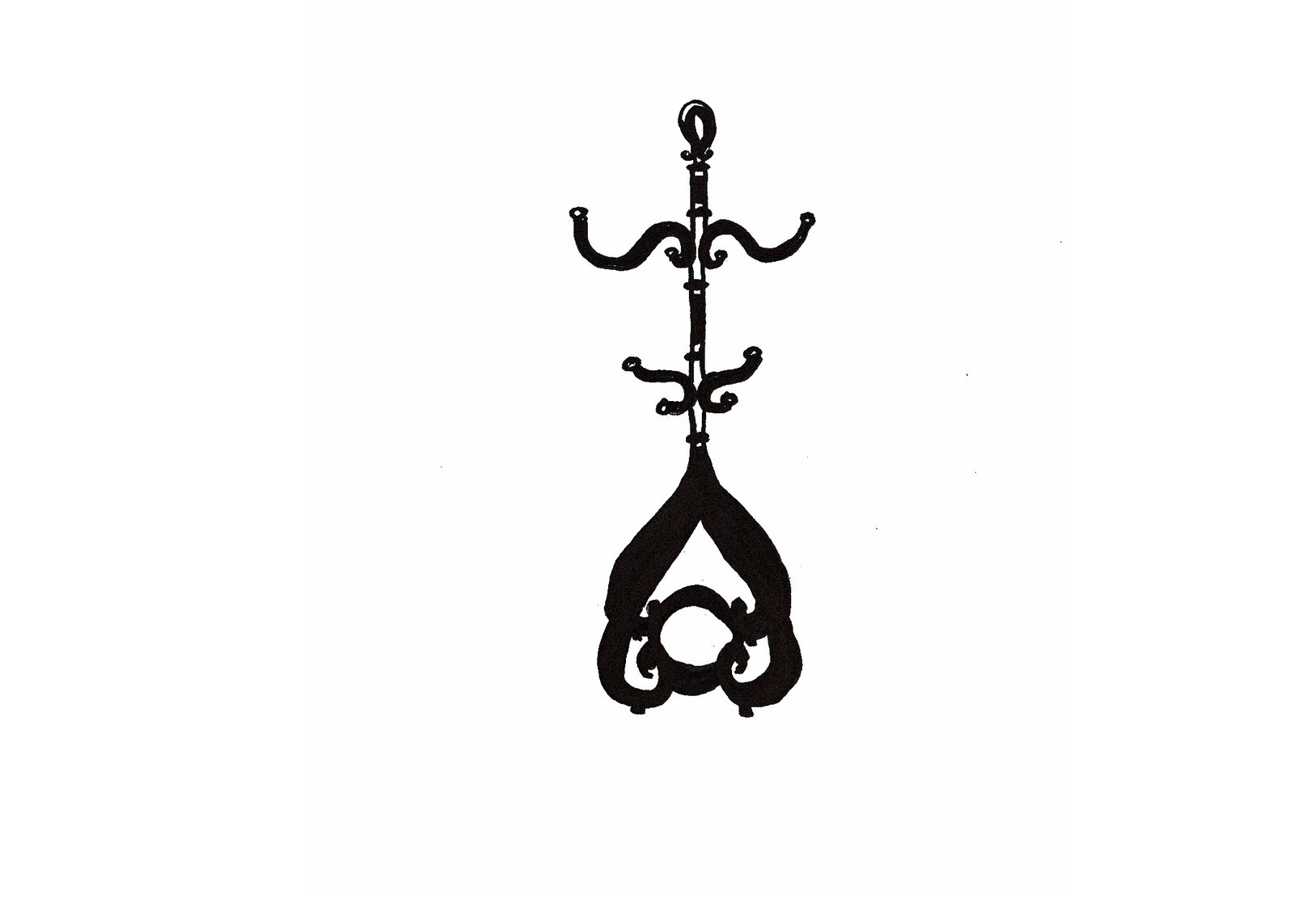
"Rose,...you saved me," she said, in shocked gratitude.
"I told you he wasn't any good at actually killing anybody," Rose replied, dropping the coat stand in revulsion, as if just realizing that it was slick with blood and probably brain matter.
Eliza Jane shoved Leopold's body to the side, struggling to get herself free from under it. "Well, it looks like I am not much better at it," she replied, "but you my dear… ."
Rose gave a wry smile. "Let's save the skill bragging for another time, perhaps over tea, but for right now, we have a body to dispose of, Eliza Jane—and I am going to need your assistance."
The Victorian carpet, much like the Victorian coat stand, came in handy after all. Once they had folded up Leopold's corpse in the rug 'like a Temaki sushi roll' , as Rose put it, the women managed to shuffle the compact package out the rear door and then slide it down the one flight of stairs. While Eliza Jane kept watch with the body, Rose backed her Cadillac down the alleyway that ran between Eliza Jane's condo and the building next to it. She squeezed out of the large car with just enough room in the tight space and went around to the rear.
"He's going to be heavy, but the two of us should be able to manage with one on each end. You got this?" she asked Eliza Jane, who had stepped out of the building when she saw her.
"I got this," Eliza Jane replied.
"OK, let's do it then." She popped open the trunk.
Eliza Jane peered inside the large cavernous space and saw two spade shovels and a rake. She looked at Rose with surprise.
Rose shrugged, "I always knew I would bury the son of a bitch one day. Best to be prepared."
The two women went back into the stairway and each took an end of the rolled carpet, the middle sagging. Hefting the bundle they made baby steps to the rear of the car and with one final heave, lifted then dropped Leopold into the trunk with a thud. The back of the car sank with the weight of the body but bounced right back up on its well functioning shocks.
Rose shut the trunk and Eliza Jane ran back to the stairway to ensure that they had not left a trail of blood. Finding none from the second floor to the first, she shut the door and quickly got into the car that Rose already had idling.
The pair made their way in silence to Greenlawn Cemetery with an unspoken agreement, both already knowing where Leopold's final place of rest would be. It took a few hours, but the woman made surprisingly fast progress in the dark, digging a body-sized hole in front of the Beloved engraved headstone, their mutual hatred of the scoundrel fueling their work. After once again lugging the body, this time across the short expanse of grass between the gravel path and the grave, they dropped Leopold unceremoniously into the earth. They made even shorter work of filling the hole back in with the soft, freshly dug dirt.
Rose retrieved the rake from the trunk and smoothed out the surface with neat furrows. "There's a sack in the back seat, if you would care to do the honors," she offered.
Eliza Jane's curiosity raised her eyebrows. She opened the back door of Rose's car and let out a laugh. She pulled out the bag of grass seed. She scattered cathartic handfuls over the new soil covering, softly giggling the whole time. She knew that the newly germinating grass sprouts would never raise suspicion.
It's almost as if Leopold had dug his own grave.
Eliza Jane stepped out of her car and looked at the new sign posted above the door of the small shop and admired it. Beloved Plain Jane's Secret. She had finally taken everyone's advice, dipped into her trust fund, and opened a bakery.
When Reggie, the waitress from Bella Verona, had heard her idea, she had sold the owner on ordering desserts for the restaurant from Eliza Jane's bakery. From there, word spread about the fantastic concoctions and soon she had more business than she could handle.
She finally had her very own place—well, her own place with a little help from a partner. Eliza Jane walked through the front door and received a cheery greeting from behind the counter.
"Hello!" she called in return. "How's business today?"
"Booming, as always!" replied Rose, happily. "Everyone wants to know how you make such delectable treats."
"It's all about that one ingredient, Rose," Eliza Jane provided. "That is to say, the secret ingredient."
"Yes, I heard it's to die for," Rose replied, wryly.
The two women laughed and laughed until they cried.
The End

Eventually Cthulhu had a Sophocles cocktail too...
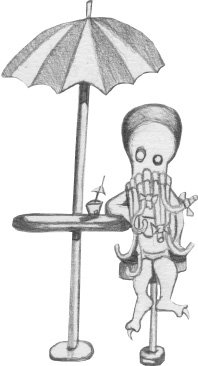
Peanuts, Popcorn, and Presidents
Continued...
I woke up to find Keno over me, “Henry, I’m glad I had too much champagne tonight; if not I would not have seen you enter the kitchen before I used the loo.”
“Did you see him?”
“He looked like that historian who wrote The History of Ferdinand and Isabella. I have seen his portrait a thousand times back at Harvard. Prescott, I think his name was?”
“Yes, It was him. Though I don’t know how it could be.”
“He was standing over you with a bloody scalpel; if I came in a moment later I would think your family line would end with you.”
“Thank you. My boys thank you!”
“He just went out the back.”
Keno helped me halfway down the hall before I could make it on my own. We found Louie feeding Carrie, the President’s wife, appetizers from a tray he stole from one of his cousins. Further on in we came upon Mark and Nikola in conference, which they hushed as we approached.
“My dear sir, you look like the undercarriage of an armadillo who forgot which way to roll up as he went downhill through a poke of cactuses!” exclaimed Twain.
“I look much better than I feel.”
“Teddy took off to confer with the President,” Nikola told us.
“Have you seen Wood or Eddy?” I asked.
“Eddy went to confer with that doctor, Lazlo...” Twain answered, “and Wood has been missing for quite some time.”
“What do you know of this man, historian—he looks pretty good for a guy in his 90s old man,” Keno asked me.
“William I killed with my sword in 1851 after I caught up with him for his complicity in poisoning President Taylor. He had obtained some typhoid from John Webster, through his son, before delivering it to Senator Henry Clay. Webster was on trial at the time for killing another Harvard professor. Clay ordered Thomas Ewing Jr., who was Taylor’s personal aid, to slip it into his nighttime tea. Ewing’s father was present when our current president’s grandfather was poisoned by typhoid and slipped some to President Polk on his way home from office on a riverboat a few months before Taylor’s death. Prescott’s father was a traitor during the War of 1812 and present at the ill-fated Hartford Convention. A member of the Essex Junto who sought to hand over our treasury to British bankers. He had just knocked down Dupin in his Baltimore Coat; ready to strike the dolorous blow when I stabbed him through the heart. If he had one?”
“Would he be involved with Wood in this Samoa Affair?” asked Nikola.
“No, I don’t think so,” I answered, “He is more interested in the English control of our banking and eliminating those presidents who stand in their way.”
“Yes, Wood is tunnel focused on the Pacific,” Twain added, “He has studied how disease can be used in war at Fort Riley. I’m afraid he will use that information on the natives of those islands like the Calvary did to our natives. Damn blankets.”
“Yes, I can see Harrison going along with his plans. He is going to allow people to steal their land in Oklahoma!” said I. “Civilizing the noble savages of this world in exchange for all the raw materials their huts and wigwams stand on.”
“What about those Bonesmen from Yale, horrible school,” Teddy, the forever Harvard man added, “There are dark secrets about their ceremonies; could they be following Depew’s orders?”
“For what purpose, old man?” I asked.
Teddy’s friend on the police force came back. “Sir, I have news on the gal. She was one Johanna Vestera— a duchess from Austria.”
Before Teddy could answer, Nikola interjected, “Vestera— was she not that sister in the Mayerling incident?”
“The what…” Teddy stammered.
“The Mayerling incident, the heir to the Austrian-Hungarian empire had just committed suicide with his younger lover in a hunting lodge in, Mayerling.”
“Yes, it is being written off as a love pact…” Nikola said shaking his head, “There is more to this—Teddy could Austria have any play in the Samoa affair?”
“Not sure; they are all damn Germans, though!”
“So you think this young girl might have been following up on the murder of her sister?” Doctor Lazlo asked as he joined our little party.
“Sir, were you not at Harvard?” Teddy asked.
“Yes, I studied under that Professor Webster; bloody business there.”
I just nodded and took note of the good doctor’s past.
“Yes, she could be. There is rumor that Emperor Franz Joseph does not like gossip or weakness,” explained Tesla, who grew up under the dominion of the Austrians, “I believe he was weeding his garden. So the Vetsera family could be investigating the death of their daughter.”
“What gossip or weakness?” busts in Teddy.
“They say after the birth of his daughter, he began to drink and slip into a depression only cured by multiple women’s...delights. The Emperor is a proud man,” explained Tesla.
“You think he would kill his son?” I asked.
“Yes, he probably shot them both himself,” nodded Tesla.
“What does the reporter, Twain’s friend, have to do with any of this, my good man?” asked Keno.
“He was cozying up close to that damosel...maybe she told him something?” bemused Twain.
It was then, I saw the specter smiling at me before he disappeared into the crowd once more.
I broke through the crowd in chase. Prescott was throwing ladies and gentlemen into my path; I had to leap over and dodge them as they bounced off the dancers on the floor. He ran through the kitchen, and Louie hit him with a silver tray. He, just held his eye and glowered at him, but kept up his run as he spun back away from me. Several of Louie’s cousins in the kitchen tossed their knives at him, though he continued unscathed. I had to duck one of the knives too, but I heard a sorry in the distance.
He was running down the stairs. I continued my pursuit. Upon the landing, he turned and went to stab me with, what I must say, an elegant dirk. I sucked in my gut, and he spun and continued down the flight. In the lobby, he waited for me. With him were five goons. He just smiled and disappeared behind them, laughing. They came in for me. Bjorn was sitting on the couch with a lady on his lap. He excused himself and stood up to join the fray. He roared and cracked his back. I arched back and did the same. The berserk was running through our veins. The mad adrenaline surge. I went in leading with my face drawing him in as I snapped my head back and caught him mid punch where he had not centered himself, pulling his arm by the elbow into the ground. Bjorn just went in low and threw his first victim over his shoulder as he stood up to attack the next one. The next one went for him with the arc of his knife. Bjorn grabbed him by the elbow as he went to swing back, he grabbed his wrist and he gave it a twist before smashing into his elbow; dislocated. The fifth just ran.
“Excuse me, I have pressing business,” Bjorn said before he went back to the lady on the couch, who now seemed much impressed.
Now, where had this specter gone?
As I was heading back up, I ran into Twain. “Some people are quick, but sir you ran like a star across the Mississippi sky. My wife says our sex life is just as quick but may I ask what had gotten your feathers so ruffled?”
“I thought I had seen someone come back from the dead,” I said.
“I do wish that frog did too, I never figured someone would weigh him down…”
“Any more word on your reporter friend?”
“No, but I have not seen that General lately either, he was running toward Tom before we all found him hanging from the balcony.”
Teddy just found us on the landing, “Henry, I got news from Wood.”
“Speak of the devil…” said the anti-imperialist Twain.
“Hum, well...Wood said that reporter fellow was part of our military intelligence branch,” continued Teddy. “He was sent on the tour to gather intelligence on public opinion about our invasion of Samoa. He was intrigued with the Austrian, he mistook her for working for Emperor Franz Joseph, and tried to ascertain if the Austrian-Hungarian Empire would back Germany in any larger war.”
“What about your English friend, Twain?” I asked. “He could be working for the British; they do have one ship off the coast of Samoa.”
“I don’t think so, but whatever he sees will most definitely end up in one of his father’s papers,” answered Twain, “He was intrigued about the woman who was killed at the opening of the Eiffel Tower; they found her underneath. He didn’t seem surprised about the ghoulish way she was left behind.”
“Leather Apron,” Louie interjected as he passed with a tray of appetizers.

“Who is this ‘Leather Apron’ Louie keeps going on about?” asked Keno.
Eddy returns, “You Yanks would know of him as Jack the Ripper from a letter addressed to ‘Dear Boss’ in which the author claimed responsibility. Tom had worked on the case, for me, before I told him to take a break and cover the world tour with me.”
“Was he working for us digging up secrets?” I asked.
“Yes, he had a hard time not doing anything,” Eddy answered, a bit nervously.
“I guess he picked up the case again when he saw that body in Paris?” surmised Twain as he stuck his chest out and arched his back with his hand on it. He had just lit a cigar with his other hand.
“I would guess, I didn’t have the stomach to follow it anymore,” answered Eddy.
“I have heard rumors of Victoria’s grandson Prince Albert being involved,” I said.
“Yes, the future king’s son was rumored to have a Catholic mistress with whom he had a child. There is talk that the crown would eliminate such a child and anyone with knowledge of such birth,” Eddy responded as he had his Chesterton lit by Twain.
“I wonder if there is any connection between those murders? If the Crown is indeed involved, and the Mayerling Affair?” I asked as I winked and tilted my head in thought, “Could there be a contract killer whose clients include monarchs who want embarrassments removed from their lineage?”
“Or a clandestine group who murder those people they fear will inherit kingdoms they can’t control,” piped in Teddy, “Those damn chaps from Yale—Depew has brought a viper’s nest full of them here tonight.”
Filled with authority, Wood entered with the New York Hussars, Squadron A. They entered in uniforms from a Napoleonic army and navy surplus store. Quite ridiculous, though New York’s finest have the airs to pull it off. At least that was what Keno thought with his mouth agape.
“Keno, that is what we need!” yelled Teddy, “A Harvard cavalry and a good war. We could be the Rough Riders! Bulllllly!!!”
“Line up everyone; up against the wall,” Wood ordered, “Search them all for knives, and poison.”
“Poison?” I asked.
Bjorn just pushed his way through the silly Hussars. “Henry, they found one of Harrison’s aides dead in a stall. It seems he shit and puked himself to death.”
“Yes!” yelled Wood, “Poisoned, the President is feeling ill now in his room. There is fear he has been poisoned with typhoid.”
“It wasn’t from my cousin’s food,” Louie interrupted, “I can promise you that!” He had a plate of Baked Alaska, or should we say Gloucester Cluck Surprise!
“No, it had to have been delivered to the President before he came here tonight,” said Doctor Lazlo the alienist, “By the rash his aide had, he must have been suffering for a day or two.”
“Doctor, could of the aide have succumbed from an accidental poisoning before he delivered it to the President?’ I asked.
“Why do you ask?”
“I remember President Taylor’s aide, Thomas Ewing Jr., administering a similar poison to him,” I reminisced. “The man who delivered it to Ewing had suffered stomach complaints beforehand, but lived until I dispatched him at a later date. In fact, his father was one of the last people President Polk saw before he succumbed to Typhoid as well. Plus, he was present at President Harrison’s death from typhoid.”
“Strange, I never read any of that?” Teddy said.
“It is kept quiet by a department of the Treasury that I am part of from time to time,” I answered. “It is our job to protect the President and cover up our failures to keep the economy from collapsing.”
The Hussars had been going through the dining room harassing the crowd; a few of them were decked, when they touched some of the men’s escorts. A brawl broke out and Bjorn came out of nowhere roaring and jumped into the melee. He loves barroom brawls.
Such a good Viking!
Leaving the brawl, we found Nikola enjoying one of Delmonico’s famous steaks at a lone table. This was the first time I realized there was something unearthly about him. As everyone else was dragged up from their table or began to brawl with the Hussars, he was just sitting there quietly with his B&B and steak. I sat down next to him. I realized there was always a strange calm around him.
As long as there were no women involved...
Just then, Bjorn threw someone over his head as he ducked over his plate to receive a bite of his steak and said, “Welcome Henry, may I ask the chef to get you a plate?” I nodded and he motioned to one of Louie’s cousins to fix me up. He took a sniff of his glass and sipped a little before he asked, “What are your thoughts about my compatriot?”
“I think she was murdered to hide the truth about your prince’s death,” I told him as I got comfortable in the chair. He pointed to his bottle of liquor and I filled one of the snifters that were on the tray. Over the glass, I continued, “I do believe your emperor was cleaning up his genetic line.”
“Infidelity, and with a Greek?” I postured, “I do believe he would like to see the Serbs and Croats removed from the country’s genetic line too.”
“True, it is hard for us on the border of his empire,” Nikola agreed. “There were rumors of a pregnancy. Plus the Prince was quite the dolt.”
“Prince Albert Victor was quite one too,” I added after a sip, “Plus, he fathered a Catholic.”
“Yes, it is hard to be a Catholic in England,” chimed in Eddy as he sat with us and filled a snifter upon Nikola’s silent invite. “Speculation has fallen on those who were close to the Prince, but I doubt it. I believe these men were too high to kill. Though you can discredit them so no one will believe the truth from them.”
“So you think the Crown could of hired an outsider to cover up the indiscretion?” I asked Eddy.
“Yes, there was once a William Prescott,” Eddy answered, “who had a private dinner with Victoria. Some rumored he was complicit with the deaths of your presidents.”
“Yes, I know too well.”
“Well, he died before Prince Albert—Eddy’s grandfather,” Eddy paused, “I’m sorry Prince Albert Victor; they call him Eddy since his father and grandfather share the same name. Prescott had died before the Queen’s consort did—but, he died, that is her royal consort, from Typhoid. Is that not the same poison that has taken down at least three of your presidents and was attempted on your current president’s life? I share the same problem, I’m the fourth Edward in my family too...”
“Yes.”
“Also, a few of his cousins died from it too. Though it took Albert over a year to die.”
“Any chance he suffered from a carriage accident before his death?”
“Yes, why so?”
“Well, Senator Daniel Webster eventually succumbed from injuries after he was thrown from his carriage. It was he and Senator Clay who hired Prescott to transport the poison from Professor Webster’s son to President Taylor’s aide. I had my feelings before Clay had died, earlier in that year, that he might try to have Senator Webster taken care of after his own death. Too many years of drinking and gout probably created an iron gut in the elderly hawk to ever befall an outbreak of typhoid.”
“You think Prescott could have tried poisoning him before he tried the carriage accident like Prince Albert?”
“If it worked before.”
“I find that when someone overdoes an action or behavior that they are masking their true opposite feelings; is it true that Victoria despised Albert, and thus her children and kin, because Albert would , as you Americans say, ‘knock her up’ continually so he could rule, when she was in bed?” Nikola asked.
“Many feel that way; it is true. She is confusing, she almost forced Eddy to marry his cousin Princess Alix of Hesse, before she suggested to her to marry Emperor Nikolas of Russia,” answered Eddy.
“How could your acquaintance be involved with tonight’s affair?” Nikola asked as he crossed his fork and knife over his plate as he looked toward me, “I take it he is dead. I might be working on a time machine, but it is far from complete.”
I excused myself and headed for the latrine. As I made my way down the hall to the lavatory, the lights went out. I felt a blow to the back of my head and I heard him laughing.
“You’re in my world now,” he said as he hit me again.
‘Oh Willy, is it you?” I asked knowing he hated that name.
He hit me again as I began to get up. “Henry, you should know not to tease,” he said as he kicked me in the gut.
He backed off and I got up slowly. “Oh Willy, I can’t see you in the dark.”
“But, I can see you,” he said with glee as I heard him circling me. William was mostly blind after a food fight went bad when he was at Harvard. So he was in his element.
I heard him circling; occasionally moving in for a strike.
Then I remembered, when fighting monkeys you must always face them. They only attack when you’re not looking. Though I could not see. How to keep your eyes on someone in the dark?
“So Willy, I thought I killed you.”
“How would that be,” he asked as he kicked me in the gut, “could a ghost reach out and touch you like this?” Then he struck me in the head with his cane.
“I’m guessing you were behind the Mayerling Affair; did her sister get too close?” I asked as I was slowly spinning to see if I could hear his motions.
“Yes, and that reporter—he almost connected me to Prince Albert’s death and then he started following me years later after the Whitechapel murders to cover up Albert’s grandson’s Catholic tawdriness. The future king pays well…”
“So they were conspiring together to catch you?”
“Yes, and she stumbled on the contract Wood put out on Harrison’s life. It seems we have poison in common. He was delighted to be stationed at Fort Riley, the birthplace of America’s chemical warfare.”
“So, Wood or his Yale superiors believed that Harrison would not bring us into a war with Germany over Samoa? I’m assuming Yale has some advantage over this impending war.”
“I believe so, but I don’t care about their intentions. I only focus on what I am being paid to focus on.”
“The ghoulish murders, I figured you always to be clean. Poison is clean.”
“Well, Professor Webster fascinated me. Not only did he teach me how to make a bevy of poisons and learn their symptoms, but he also taught me to dissect. Not all of his cadavers started out dead before they entered his lab; many prostitutes. We just dropped them through the trapdoor into the Charles River like the rest of the professors with their subjects they had stolen from the local graves. Webster was so proud when he said we were dismembering the bones of Samuel Adams; who is to say if they were his bones, but I relished in it. That firebrand which stirred up sentiment away from our Mother England. I had to try my hand at disemboweling my victims. Poisoning was getting quite boring.”
“Nikola stumbled on something; he mentioned a time machine. I’m feeling that George Peabody made your introduction to the Queen? They came up in London society together; some say he was in the royal bedchambers before Mr. Brown.”
“Watch your tongue! Do not befoul the Queen Mum’s name!”
“Did I hit a sore spot? Ah, I understand how you are not dead; you used Peabody’s time machine years before I stabbed you in the heart. I was amazed you had one. A heart that is.”
“I doubt you can kill me now or before; funny for me it will be later”
I had him talking long enough, so I could pull my sword from my cane and toss it at him. I heard him wince and gurgle blood with a choked insult, I figure.
Bjorn, Louie, Keno, and Teddy came rushing into the dark, before one of them found the lights. Prescott was gone.
“Henry, you look worse for wear,” said Bjorn as he held me up.
“We heard you and someone angry with you for insulting the queen,” Keno said.
“We need to go after Wood, the president needs to know he was behind the poison attempt,” I told them.
“Too late he left with the Hussars already,” Teddy was saying, “No one will believe you, he is too well ensconced.”
A.G Spalding came down the hall for the latrine, “I heard you talk about the president’s life, I can send my baseball team down with their bats to protect him.”
“Me and Keno will join you! Bully!” Teddy said with his chest out.
“Not till I use the little boy’s room; I’ve been holding it all night during the various ceremonies,” Spalding said as he rushed to relieve himself.
Later that week I was at Nikola’s table with Twain, having another steak and sharing some B&B. Nikola was reading the paper. “I see the Samoa Crisis has come to an end,” Nikola said.
“A rogue storm a couple weeks ago sunk all of the American and German ships harbored in Samoa I fear,” Twain said as he winked at Tesla.
“All but that one English cruiser,” Tesla said from behind his paper.
“We need to work on making improvements,” Twain said as he was buttering his roll.
“What were you two up to?” I asked.
Twain lit up his cigar and some of the smoke was caught within his prodigious eyebrows, “Well, my good Croat there knows more than how to shake the shit out of me with his machine, he also knows how to make holy shit fall from the sky...”

Epilogue:
OK, did you find all of the connections? It is not imperative; if you didn’t. Though, it might be the only thing keeping Cthulhu from dating your sons or daughters; he is not picky in this transgender age...in fact I’m not sure which sex he is anyway!
Spalding in 1888 brought the Chicago White Stockings and the All American Team around the world while Jack the Ripper was still removing pieces of people’s anatomy. An admirer of Roosevelt was Hemingway. In his Nick Adams story, he had ripped out a young woman’s heart, something he did often in real life without much concern as who would win the next baseball game. Though he was not as callous as the man from the south who took his love’s eight fingers before he gave up his Cadillac. So the father in Wodehouse’s tale made off a lot better losing his daughter to a ruthless baseball player. Wagner was mentioned in The Three Day Blow as in Wodehouse’s story. Also in Hemingway’s sequel he mentions the Giants as in Wodehouse’s tale.
So the issue centered around baseball. In baseball someone always has to lose, but we reminded you it is better to lose a game then lose your balls, ovaries, fingers, love, or your daughters. Do you concur?
By the way the publisher wants you to know that Henry’s first novel is out in stores now that is based on the real murder which inspired the game Clue, reached the highest heights of our government, and inspired Poe’s Tell-Tale Heart. You can find Murder on the Common at your local bookstores and online at www.salemhousepress.com. The first novel in The Sinclair Narratives.
~Professor Wilmarth
Flip & Scan:
eBook Cards

For only $5 you can flip these cards over and as easy as snapping a picture of the QR code on the back instantaneously have a fabulous new eBook on your device.
Look for them at your local stores!
OUR AUTHORS and ILLUSTRATORS
Peanuts, Popcorn, and Presidents
Christopher Jon Luke Dowgin: Author & Illustrator
The Celebrated N0-Hit Inning
Frank Pohl: Author
John Hulton: Illustrator
The End of Something
Ernest Hemingway: Author
John Hulton: Illustrator
The Pitcher and the Plutocrat
P.G. Wodehouse
The Three Day Blow
Ernest Hemingway: Author
John Hulton: Illustrator
Beloved
Lisa Dechenes: Author
Sabrina King: Illustrator
Bio...
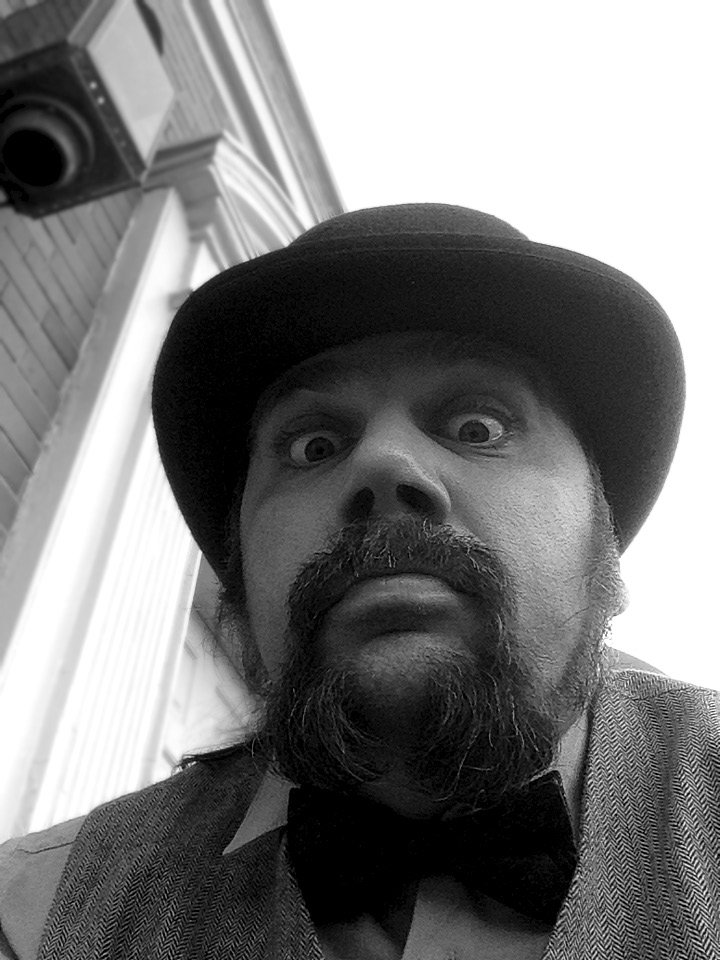
Christopher Jon Luke Dowgin:
Author & illustrator. Chris has written over 16 books of which 14 he has illustrated including The Salem Trilogy, Tales from Mr. Pelinger’s House, Max Teller’s Amazing Adventure, and Tyler Moves to Gibsonton Florida. He is also the creator of The Sinclair Narratives which Peanuts, Popcorn, and Presidents is one of the many short stories from the series. Look for the first novel of The Sinclair Narratives, Murder on the Common.
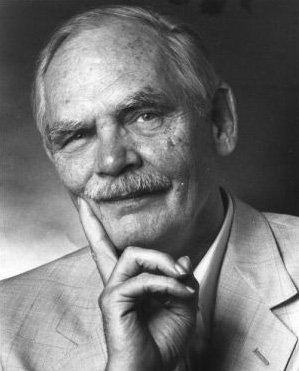
Frederik Pohl
(November 26, 1919 – September 2, 2013):
Author. Pohl stopped being Asimov’s agent the only one the latter ever had when he became editor from 1939 to 1943 of two pulp magazines, Astonishing Stories and Super Science Stories. Stories by Pohl often appeared in these science-fiction magazines, but never under his own name. Work written in collaboration with Cyril M. Kornbluth was credited to S. D. Gottesman or Scott Mariner; other collaborative work (with any combination of Kornbluth, Dirk Wylie, or Robert A. W. Lownes) was credited to Paul Dennis Lavond.
From about 1959 until 1969, Pohl edited Galaxy Science Fiction and its sister magazine If; the latter won three successive annual Hugo Awards as the year’s best professional magazine. His 1977 novel Gateway won four “year’s best novel” awards: the Hugo voted by convention participants, the Locus voted by magazine subscribers, the Nebula voted by American science-fiction writers, and the juried academic John W. Campbell Memorial Award.
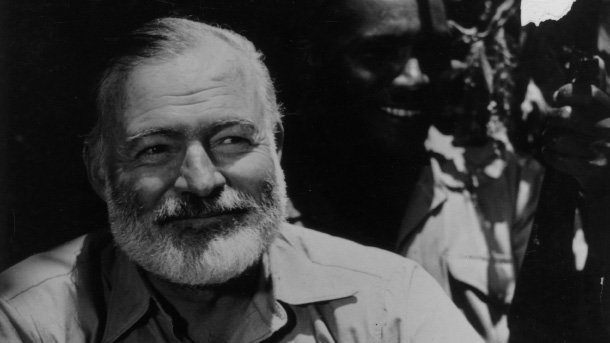
Ernest Hemingway
(July 21, 1899 – July 2, 1961):
Author. An American novelist, short-story writer, and journalist. His economical and understated style—which he termed the iceberg theory—had a strong influence on 20th-century fiction, while his adventurous lifestyle and public image brought him admiration from later generations. Hemingway produced most of his work between the mid-1920s and the mid-1950s, and he was awarded the 1954 Nobel Prize in Literature. He published seven novels, six short-story collections, and two nonfiction works. Three of his novels, four short-story collections, and three nonfiction works were published posthumously. Many of his works are considered classics of American literature.
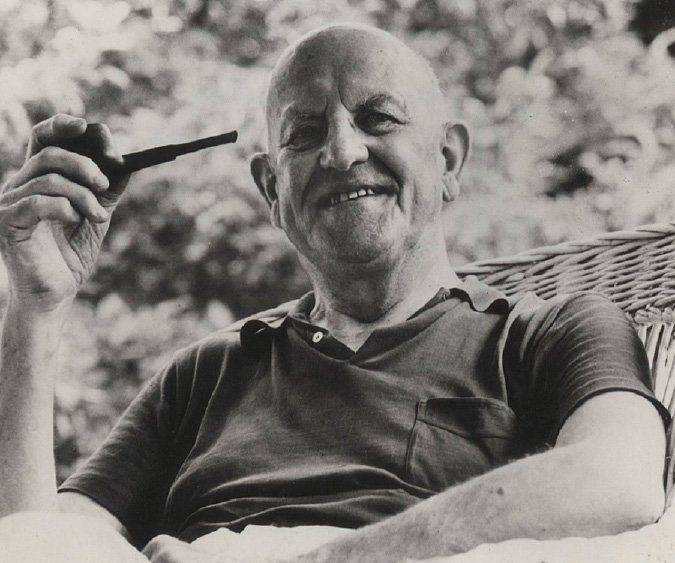
P.G. Wodehouse
(October 15, 1881 – February 14, 1975)
Author. His creations include the feather-brained Bertie Wooster and his sagacious valet, Jeeves; the immaculate and loquacious Psmith; Lord Emsworth and the Blandings Castle set; the Oldest Member, with stories about golf; and Mr Mulliner, with tall tales on subjects ranging from bibulous bishops to megalomaniac movie moguls.

Lisa Deschenes:
Author. Lisa is the author of the Salem Cemetery series of macabre literature. She is an early development educator and professor at Endicott College. She has lived in Salem her whole life and thrives in its 12 month out of the year Halloweenesque flavor. An avid car collector and hot shit.

Sabrina King
Illustrator. Arkham native currently living in Portland Maine. An avid urban explorer of the dark recesses of civilization.
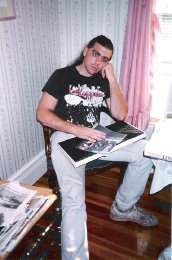
Jonathan Hulton
Author & Illustrator. Jonathan is an author specializing on quirky characters that meet in the strangest of places. His stories can be seen in the suburban fantasy, just a few miles west of urban fantasy. He also fills in and does the spot illustrations for our public domain selections.
William Hickling Prescott was the son of William Prescott who was one of two people famous for the lines ‘Don’t shoot till you see the white of their eyes’ at Bunker Hill who sunk to become a traitor in the War of 1812 where he was present at the Hartford Convention discussing secession and siding with the enemy in the war. The famous historian son had delivered a vial of typhoid he received from his friend, whose father was on trial for hacking another professor to death in Harvard that specialized in poison, to Thomas Ewing Jr. who was aid to President Zachary Taylor who would die from typhoid. He also visited Queen Victoria and Prince Albert prior to Albert’s prolonged death of Typhoid. Queen Victoria secretly despised her husband for making her pregnant with outstanding frequency so he could rule while she was maternally busy. Her hatred for what she deemed as frogs, her children, led to WWI when her grandchildren brought the world into their personal hatreds. All into the Austrian emperor’s hands.
The Samoan Crisis ended with the 1889 Apia cyclone. In 1878, the United States gained a fuelling station at the harbor at Pago Pago, on the island of Tutuila, The German Empire gained one in the harbor at Apia, on the island of Upolu. Things heated up when the US Navy warships (the sloop-of-war USS Vandalia, the screw steamer USS Trenton, and the gunboat USS Nipsic) stared down three German warships (the gunboats SMS Adler and SMS Eber and the corvette SMS Olga)for several months in Apia Harbour, which was monitored by the British corvette HMS Calliope...In 1889, Tesla invented his high frequency devise which he did use to shake the shit out of Twain and maybe those ships. Many believe his devise has led to today’s HAARP Project.
Well Prescott was famous for poisonings, it is rumored he left a vile for Queen Victoria to give to Albert. He was her Beloved too...
General Leonard Wood was turned down to lead the forces during WWI for General Pershing. He was stationed at Fort Riley in Kansas where historically Custard was stationed and the small pox blankets came from that helped finish a genocide on our native population. From this base started the 1918 Bird Flu that decimated the world (a hundred years before SARS2). A flu that was stumbled upon in 1916 in a French base by British doctors when the normal seasonal flu combined with mustard gas in wounded soldiers. It was next found in Manchester NJ at the old Russian Imperial Army Base now known as Lakehurst Navy and Engineering Base where they tested mustard gas. Yes, the place the Hindenburg crashed at. Oh the Humanity...
America’s first Chemical Warfare base would be named after General Wood who was absent when Teddy and Keno charged up San Juan Heights.
The mustard gas was later re-purposed as Chemotherapy and used to treat people in Manchester in 1991 who was suffering from testicle cancer from inhaling the mustard gas mixed with dumped jet fuel in the drinking water which atomized in the shower.
We know you love Henry, just remember you can read another one of his adventures in the murder mystery Murder on the Common. Just ask for it by name at your local bookseller.
Look for a new issue in the Summer of 2024. We also have electric yearly color subscriptions of our magazine at www.salemhousepress.com.
~ Professor Albert N. Wilmarth
Miskatonic University

Murder, Vampires, Lovecraftian Monsters, and One Good Immortal to Save the day....
Everyone’s favorite immortal, Henry Sinclair, and his ragtag third generation reincarnated Viking Crew are back in this novel as they try to solve the real murder of Captain Joseph White in 1830 in which the game Clue is based on. While they are investigating they must face a scourge of Chinese vampires sent over seas to get revenge for the opium epidemic Salem set on their country and stop an evil Lovecraftian monster from taking over the world. No big deal for Henry...
You learn a few tricks within 400 years...
Read the first novel of The Sinclair Narratives that is based on the murder that inspired Edgar Alan Poe’s Tell-Tale Heart, and the Parker Brothers’ game Clue. A murder that involved members of the Supreme Court, the Senate, and the Presidency. So catch up on Louie’s antics, Henry getting hit on the head, Harvey the Pooka tormenting Henry, watch Bjorn bash some heads, and Caroline kick some ass! Plus learn some real history of the little known figures in American history that were pulling the strings of our government and our national bank along the way...
Buy Murder on the Common today at
www.salemhousepress.com
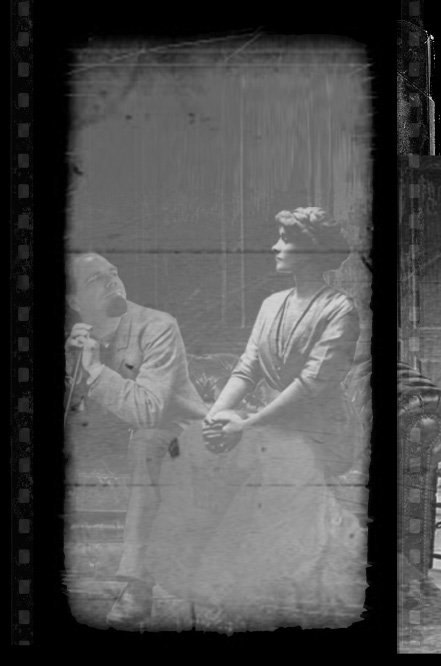


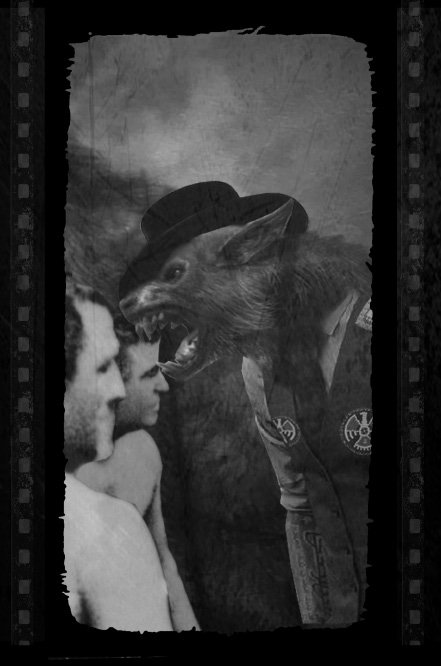
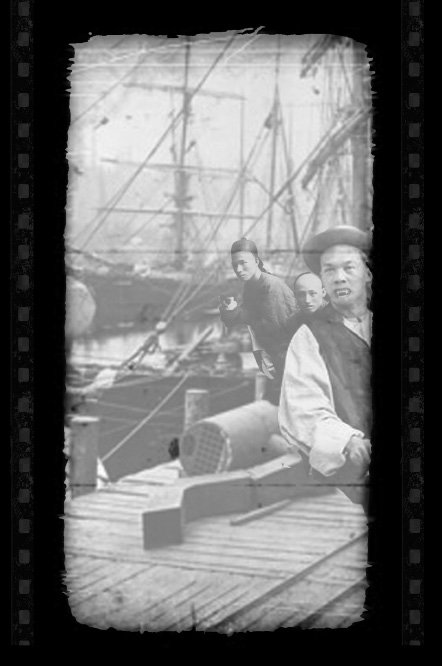
Salem Secret Underground: The History of the Tunnels in the City


Find out all of the secrets that lie under your feet in Salem MA. Learn about the tunnels that were started in 1670’s and were still being used through Prohibition. The tunnels that created America’s first millionaires and the 1% that took over the country.
Buy it today at
www.salemhousepress.com.
Sub Rosa

The sequel to Salem Secret Underground: The History of the Tunnels in the City. An in depth look at how Salem MA has shaped the nation from the beginning. Tales of inventors, thieves, scoundrels, and politicians.
A history of people like George Peabody whose bank became JP Morgan and the economic collapse he created in 1837 which repeats every 20 years. Thomas H. Perkins and his extended family: Forbes, Russells, and Sturgis. His family ran railroads, drug empires, Barring Brothers, and 2/3 of the Bank of England. When his grand niece marries JP Morgan II on the eve of creation of the Federal Reserve, she merges the American central bank with England’s as the Morgan’s brings in their connection to the Rothschild’s 1/3 control of the Bank of England to complete the Barrings Brothers 2/3rds.
Tales like this and more!

Buy it today at
www.salemhousepress.com
New tales from
The Sinclair Narratives!
For new tales that appear outside and within Arkham: Tales from the Flipside, check regularly at :
https://www.salemhousepress.com/Arkham/Sinclair.html
For Past Stories visit:
https://www.salemhousepress.com/Arkham/Past-Issues.html
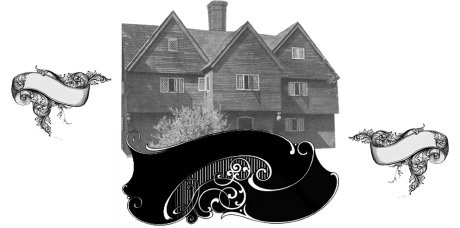 This is Professor Wilmarth and your friendly neighborhood Cthulhu welcoming you to another journey within the world of the macabre and the strange. In this season’s issue we have several tales of baseball, lost love, and lost fingers. Henry our favorite immortal returns to NYC and imparts to us on how he first met Mark Twain out at the old ball game. Then we have Polh’s Celebrated No-Hit Inning where a braggart of a hitter is set up against an amazing team in another realm. Then we have Ernest Hemingway telling us a tale of Nick Adams’ lost love in The End of Something. Followed by Wodehouse’s in The Pitcher and the Plutarch love is found at home plate. Next in the sequel to The End of Something Nick Adams has second thoughts in Hemingway’s The Three Day Blow. Followed off with Beloved by Lisa Deschenes, a tale of a dangerous liason with a twist.
This is Professor Wilmarth and your friendly neighborhood Cthulhu welcoming you to another journey within the world of the macabre and the strange. In this season’s issue we have several tales of baseball, lost love, and lost fingers. Henry our favorite immortal returns to NYC and imparts to us on how he first met Mark Twain out at the old ball game. Then we have Polh’s Celebrated No-Hit Inning where a braggart of a hitter is set up against an amazing team in another realm. Then we have Ernest Hemingway telling us a tale of Nick Adams’ lost love in The End of Something. Followed by Wodehouse’s in The Pitcher and the Plutarch love is found at home plate. Next in the sequel to The End of Something Nick Adams has second thoughts in Hemingway’s The Three Day Blow. Followed off with Beloved by Lisa Deschenes, a tale of a dangerous liason with a twist.
